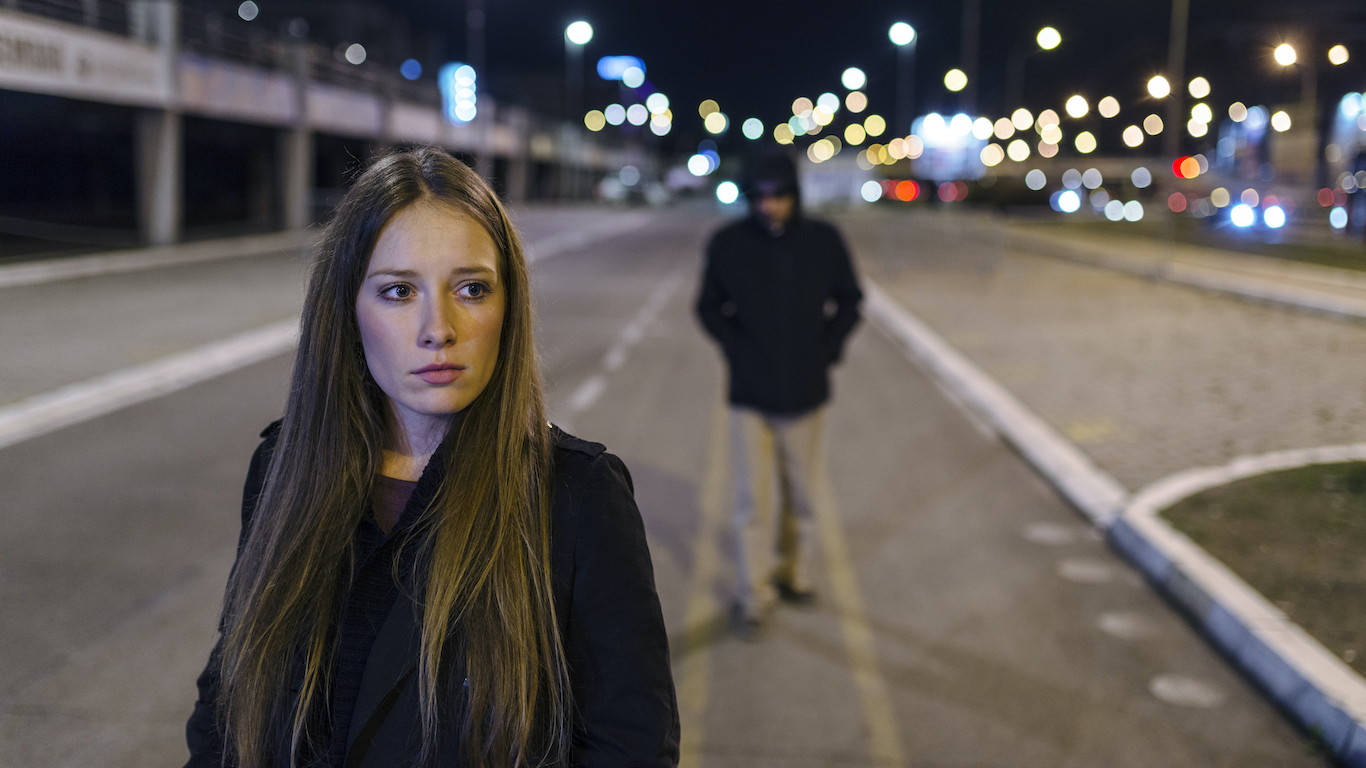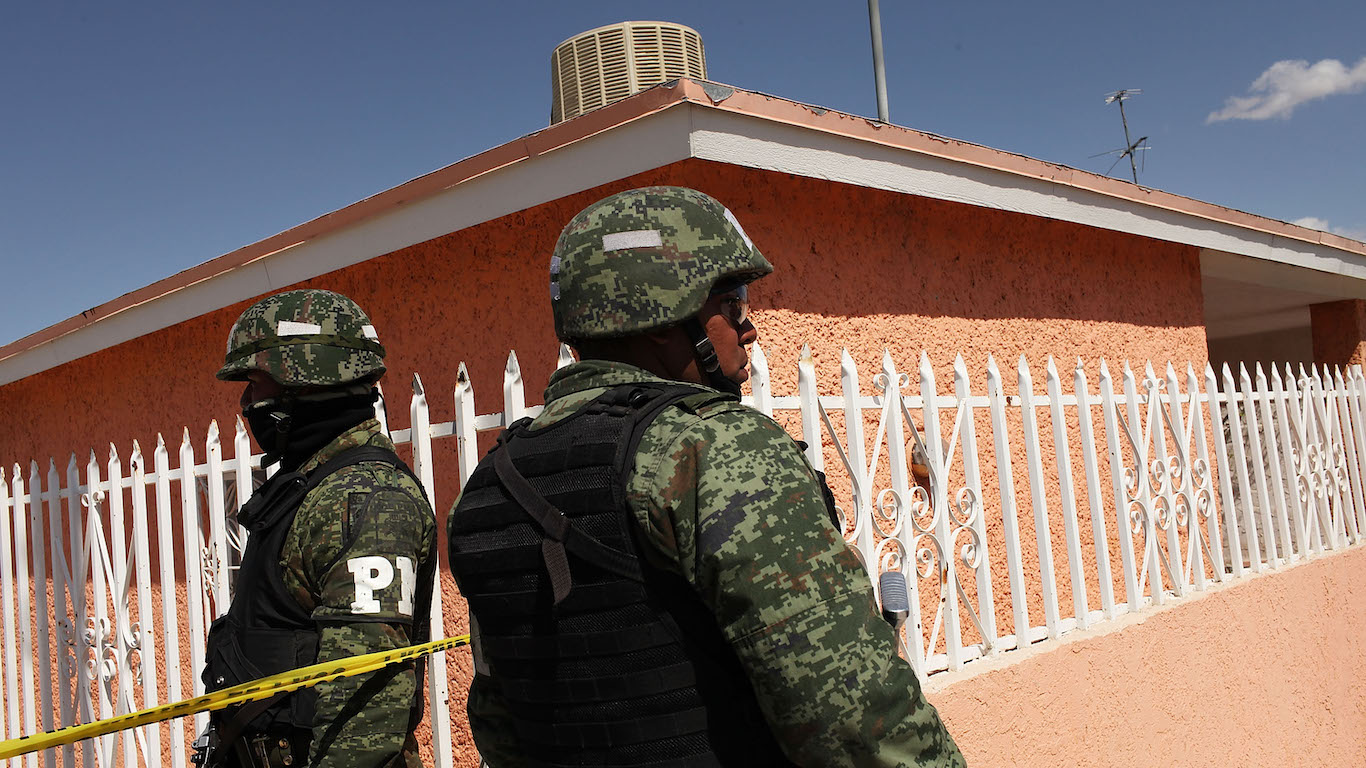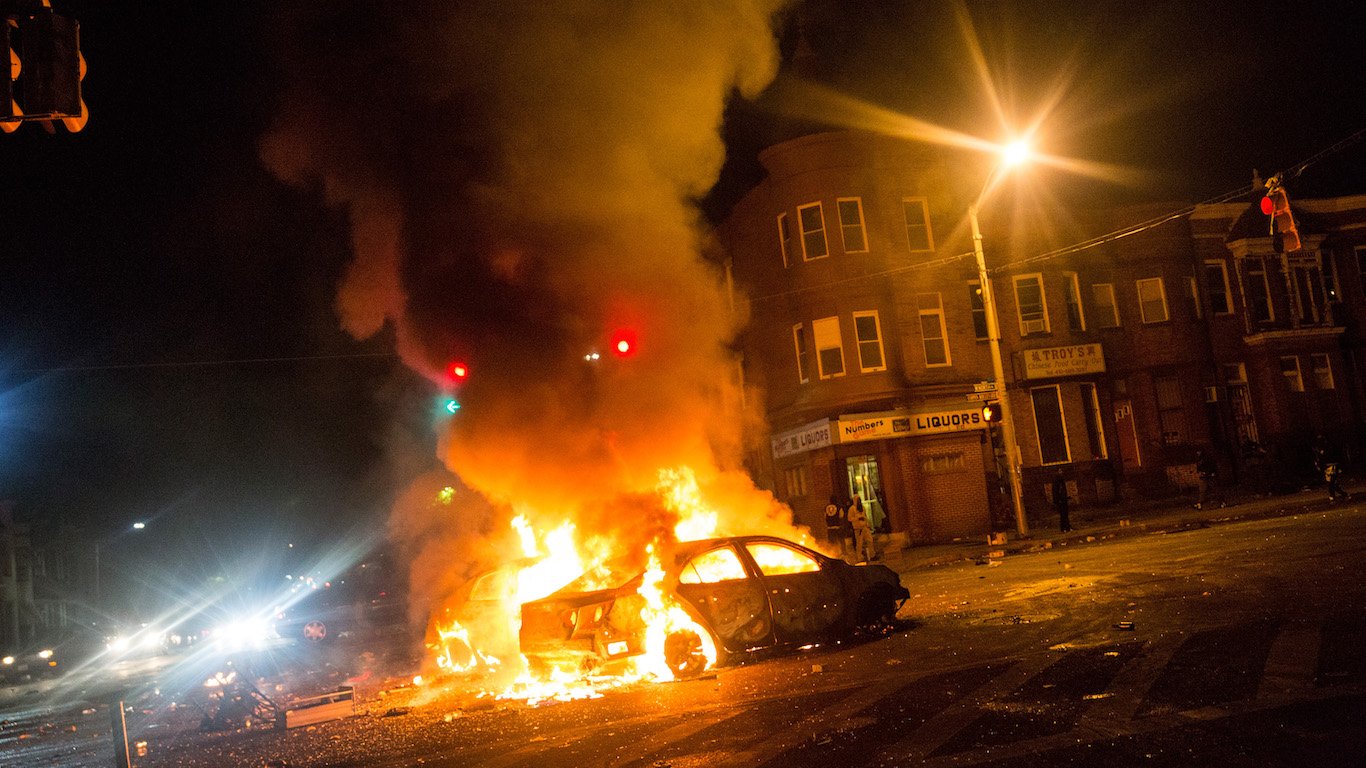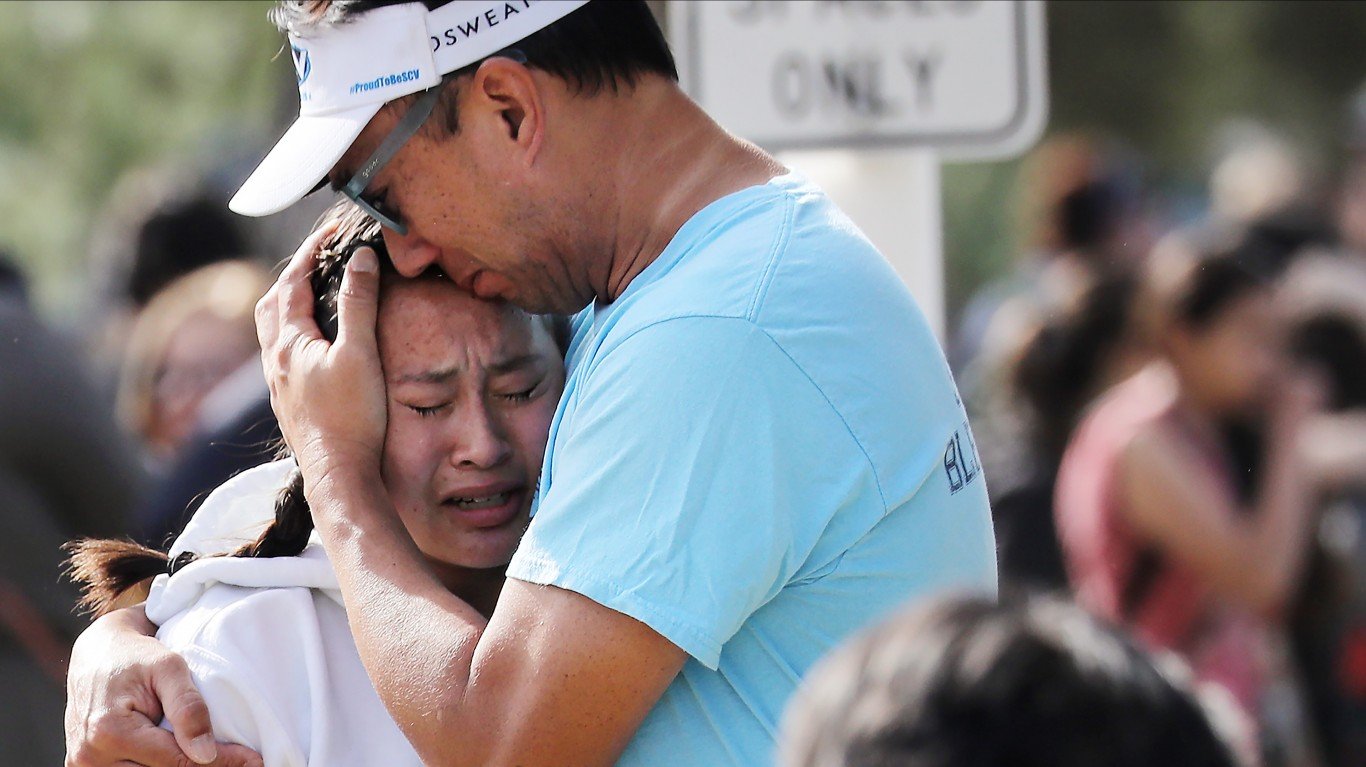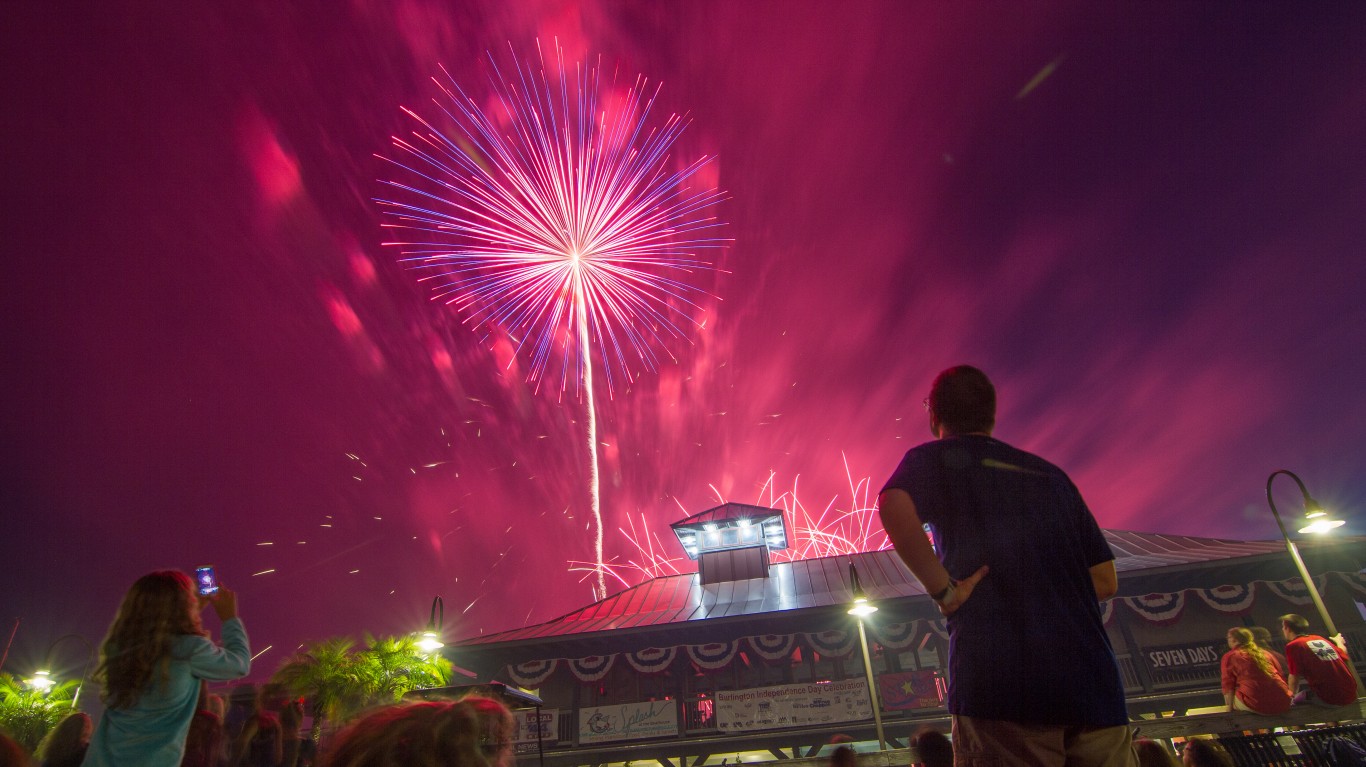

Like nearly everything else in 2020, Independence Day celebrations this year are likely going to look different than they normally do. Due to the ongoing COVID-19 pandemic, many Fourth of July events are being postponed, altered, or cancelled this year — including traditional fireworks displays. People may be inclined to shoot off their own fireworks if they cannot get their usual fill of pyrotechnics from city-sponsored events, but it is important they first know their state’s unique laws and restrictions about fireworks.
24/7 Wall St. reviewed state fireworks laws, as compiled by the American Pyrotechnics Association, as well as local cancellations of July Fourth celebrations across the country to determine whether you can celebrate July Fourth with fireworks in your state. It should go without saying that this article is not a replacement for legal advice, and people should consult their local laws before purchasing or using fireworks. The vast majority of major U.S. cities, and a number of smaller ones, have more restrictive laws than their state, and many municipalities have outright bans on personal fireworks use, even in more permissive states.
Nearly every state allows some types of fireworks — just three states allow only sparklers and smaller novelty items like snappers or smoke devices, and one state bans all types of consumer fireworks. But virtually every state has at least some kind of restrictions.
Some states have instituted a minimum age to purchase pyrotechnics. Others have banned fireworks of certain types, sizes, or that contain specific dangerous ingredients. Many states have limited where and when fireworks can be used or sold.
For those Americans who are planning to enjoy large city-sponsored fireworks displays, the Centers for Disease Control and Prevention is still recommending people observe social distancing and wear masks as the U.S. experiences its largest outbreak of COVID-19 to date. From the week ending June 22 to the week ending June 29, the average daily new cases per 100,000 residents increased in 39 of the 50 states. These are the states where COVID-19 is spreading the fastest.
Click here to see if you can celebrate the fourth with fireworks in your state
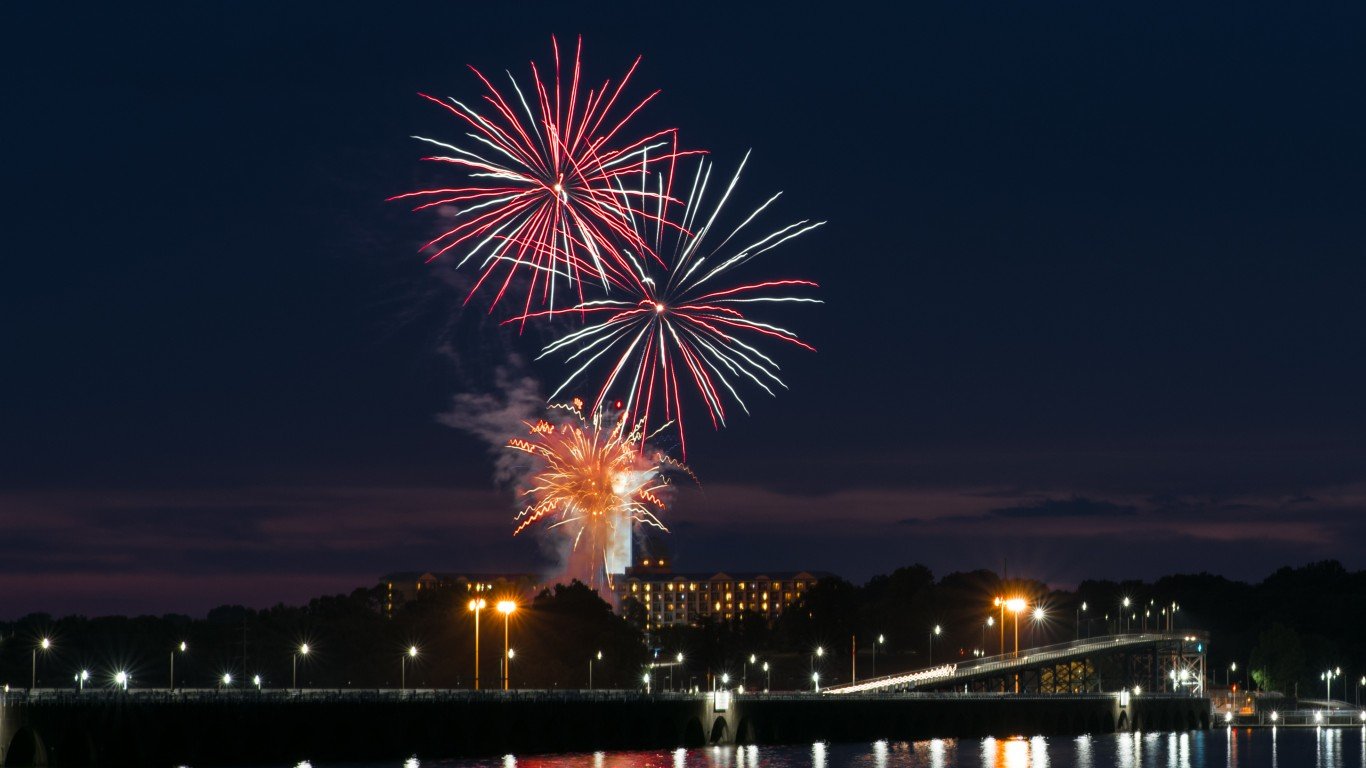
Alabama
> Selling period: June 20-July 10; Dec. 15-Jan. 2
> Minimum age to purchase: 16 years old
> COVID-19 crowd restrictions: Attendees must remain 6 ft. apart
Concerns over the coronavirus pandemic have prompted several municipalities across the state to cancel their July Fourth fireworks displays this year. These places include Bessemer, Decatur, Gulf Shores, and Guntersville. Larger cities, like Mobile and Montgomery, are still weighing their options, while Birmingham is planning on carrying out its fireworks show. Alabama is one of several states reporting a recent spike in COVID-19 cases.
[in-text-ad]
Alaska
> Selling period: Year-round
> Minimum age to purchase: 18 years old
> COVID-19 crowd restrictions: None
All fireworks designed to be sold to consumers are legal in Alaska, specifically pyrotechnics like Roman candles, fountains, shells, firecrackers and more. The minimum age to purchase fireworks in the state is 18, one of the oldest age requirements among states that impose age restrictions.
The state capital, Juneau, will still hold its annual July Fourth fireworks show on Gastineau Channel, though spectators will be required to wear masks and remain socially distant. In Anchorage, Alaska’s largest city, the annual Fourth of July celebration has been canceled again this year. While this year the reason is the COVID-19 outbreak, in 2019 the reason was dry weather and ongoing wildfires.
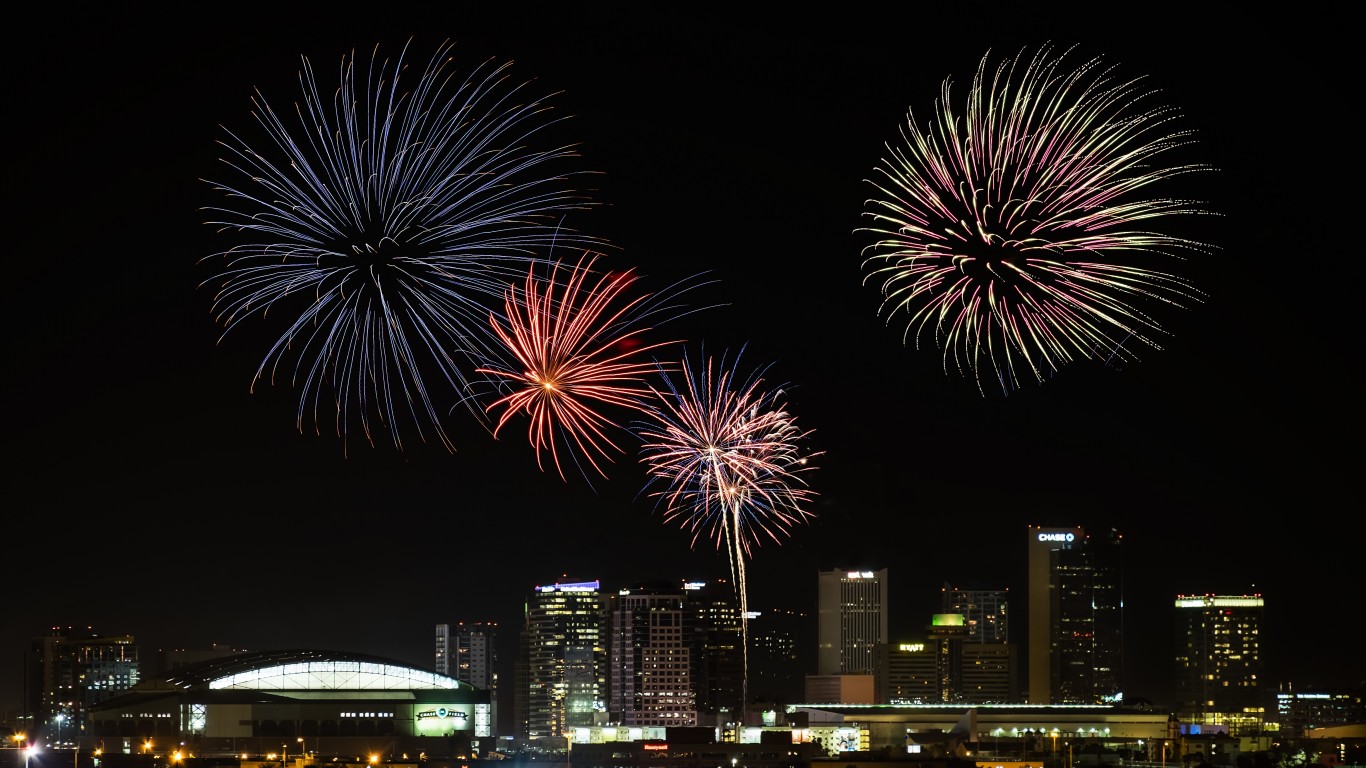
Arizona
> Selling period: Year-round (sparklers/smokers only)
> Minimum age to purchase: 16 years old
> COVID-19 crowd restrictions: None
Products like sparklers and smoker devices are available for purchase year-round in Arizona. However, other types of pyrotechnics like illuminating torches, wheels, and spinning devices are only available from May 20 through July 6 and again from Dec. 10 to Jan. 3. Fireworks such as Roman candles and bottle rockets are prohibited in Arizona. Pyrotechnic events for public enjoyment hosted on public property are permitted to use aerial displays, provided they have obtained a permit from the fire marshal.
July Fourth is approaching as Arizona is grappling with an alarming spike in new cases of COVID-19 — and different municipalities are adopting different approaches. While Flagstaff has canceled its Independence Day celebrations, Lake Havasu still plans to have its traditional fireworks display. Meanwhile, Prescott is taking a different approach by having a drive-in fireworks display.
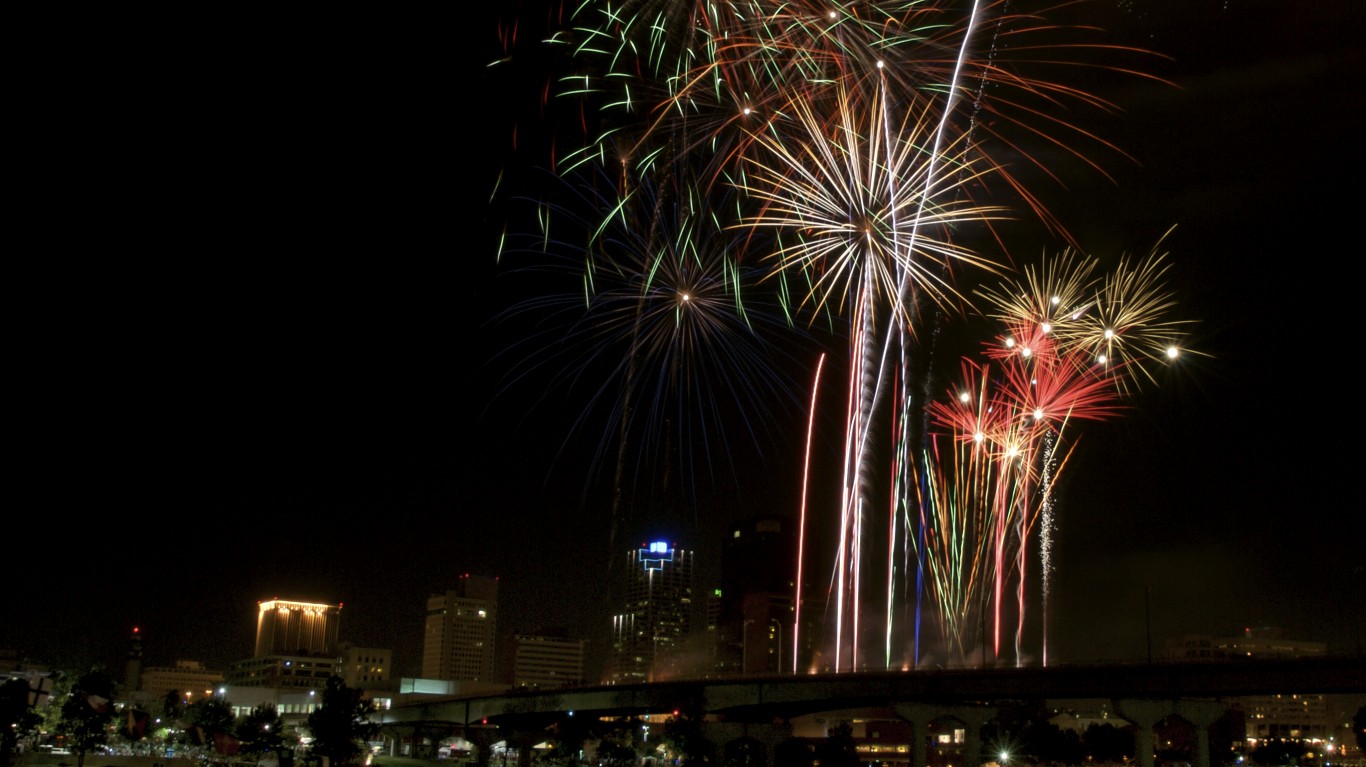
Arkansas
> Selling period: June 20-July 10; Dec. 10-Jan. 5
> Minimum age to purchase: 12 years old
> COVID-19 crowd restrictions: None
Of the states with age restrictions for buying fireworks, Arkansas is tied for the lowest age restriction, at 12. No types of fireworks are outright banned, though types like Roman candles, fountains, wheels, and firecrackers are specifically permitted with some size restrictions. Almost all types of fireworks can only be sold from June 20 to July 10 and Dec. 10 to Jan. 5, though smaller “snake” style fireworks and sparklers can be sold year-round.
Many fireworks shows across Arkansas are proceeding as planned, though the annual Pops on the River event in Little Rock was canceled.
[in-text-ad-2]
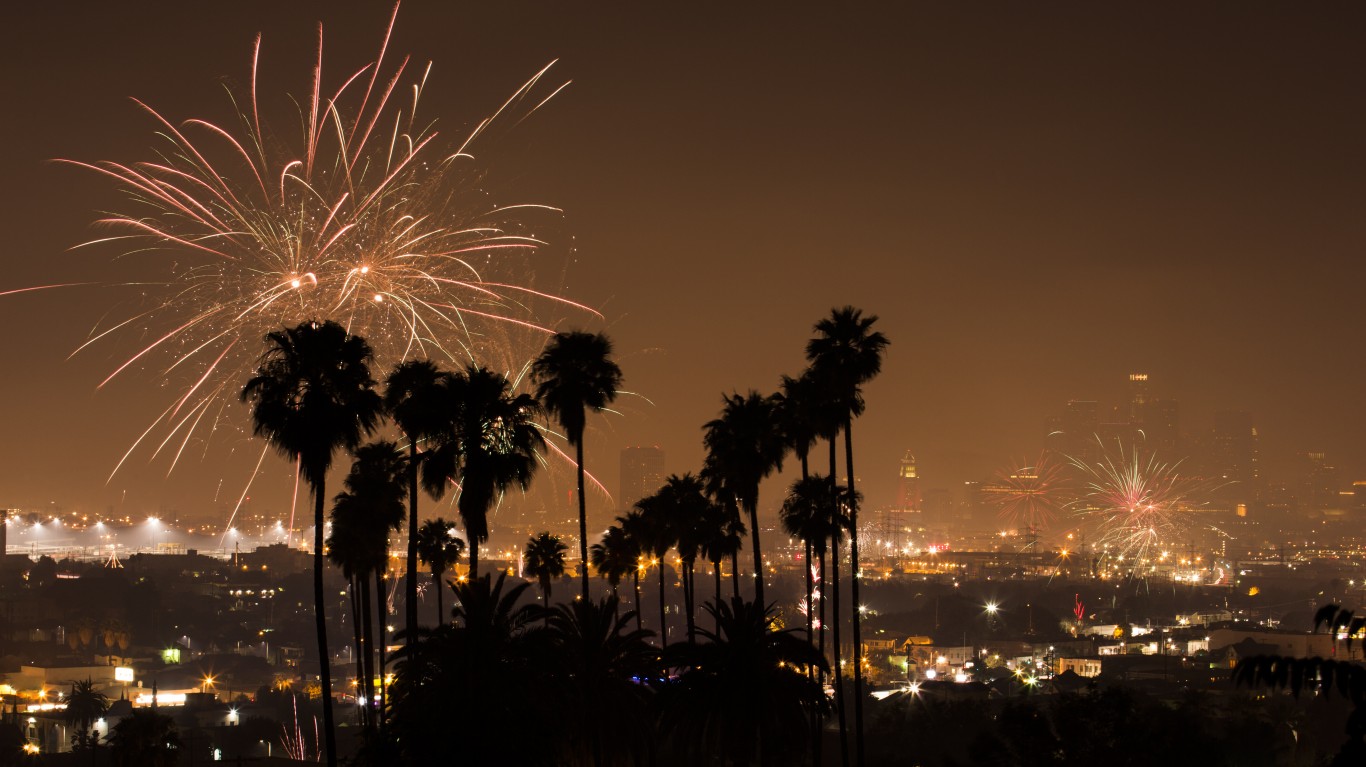
California
> Selling period: June 28-July 6
> Minimum age to purchase: 16 years old
> COVID-19 crowd restrictions: Outdoor gatherings prohibited
From noon on June 28 through noon July 6, California residents age 16 and older can legally purchase certain types of fireworks. These include sparkling devices, wheel spinners, smoke devices, and snappers. However, items available in many other states, including firecrackers, bottle rockets, and Roman candles are prohibited year-round in California.
Due to concerns over COVID-19, cities across California, including Los Angeles, San Francisco, and Sacramento have canceled July Fourth celebrations.
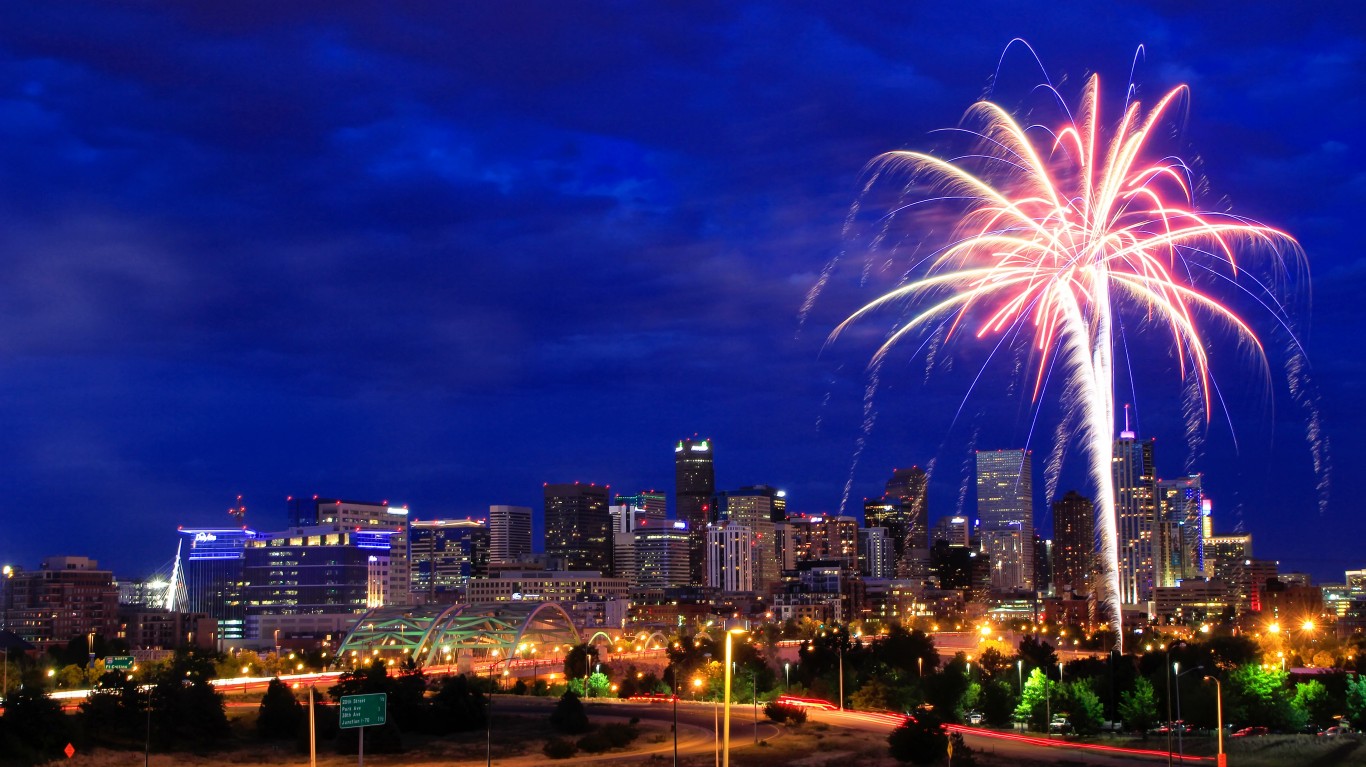
Colorado
> Selling period: Year-round
> Minimum age to purchase: 16 years old
> COVID-19 crowd restrictions: 175 person limit
Firework products such as cylindrical and cone fountains, ground spinners, torches and colored fire, dipped sticks, and sparklers are permitted to be sold year-round in Colorado to customers who are at least 16 years old. Other pyrotechnic products like firecrackers and bottle rockets are prohibited.
As is the case in other states, municipalities across Colorado have canceled July Fourth events, citing coronavirus concerns. Cities that have canceled July Fourth fireworks include Aspen, Boulder, and Denver. However, other cities in the state, including Durango, Colorado Springs, Cortez, and Greeley still plan to hold a public celebration.
[in-text-ad]
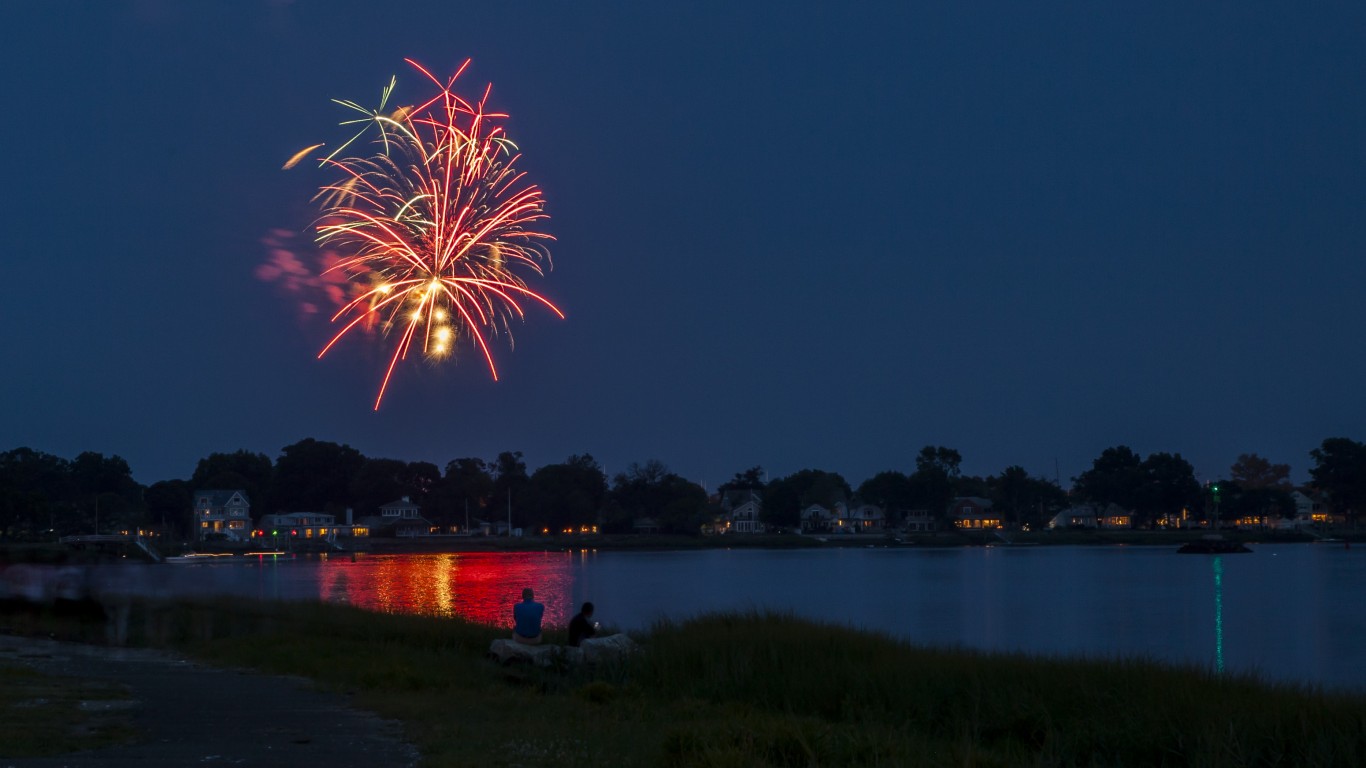
Connecticut
> Selling period: Year-round
> Minimum age to purchase: 16 years old
> COVID-19 crowd restrictions: 100 person limit
Connecticut has relatively restrictive laws surrounding the sale of fireworks. Customers age 16 and older can only purchase non-explosive, non-aerial sparkling devices containing a maximum of 100 grams of pyrotechnic material.
Fireworks displays celebrating American independence have been canceled in much of Connecticut. Cities and towns across the state, including Danbury, Fairfield, Milford, Norwalk, and Westport have canceled displays because of COVID-19. A handful of communities, however, will still be putting on a fireworks display. These include New Britain and Waterbury. This year, Connecticut police will be stepping up enforcement against illegal firework use.
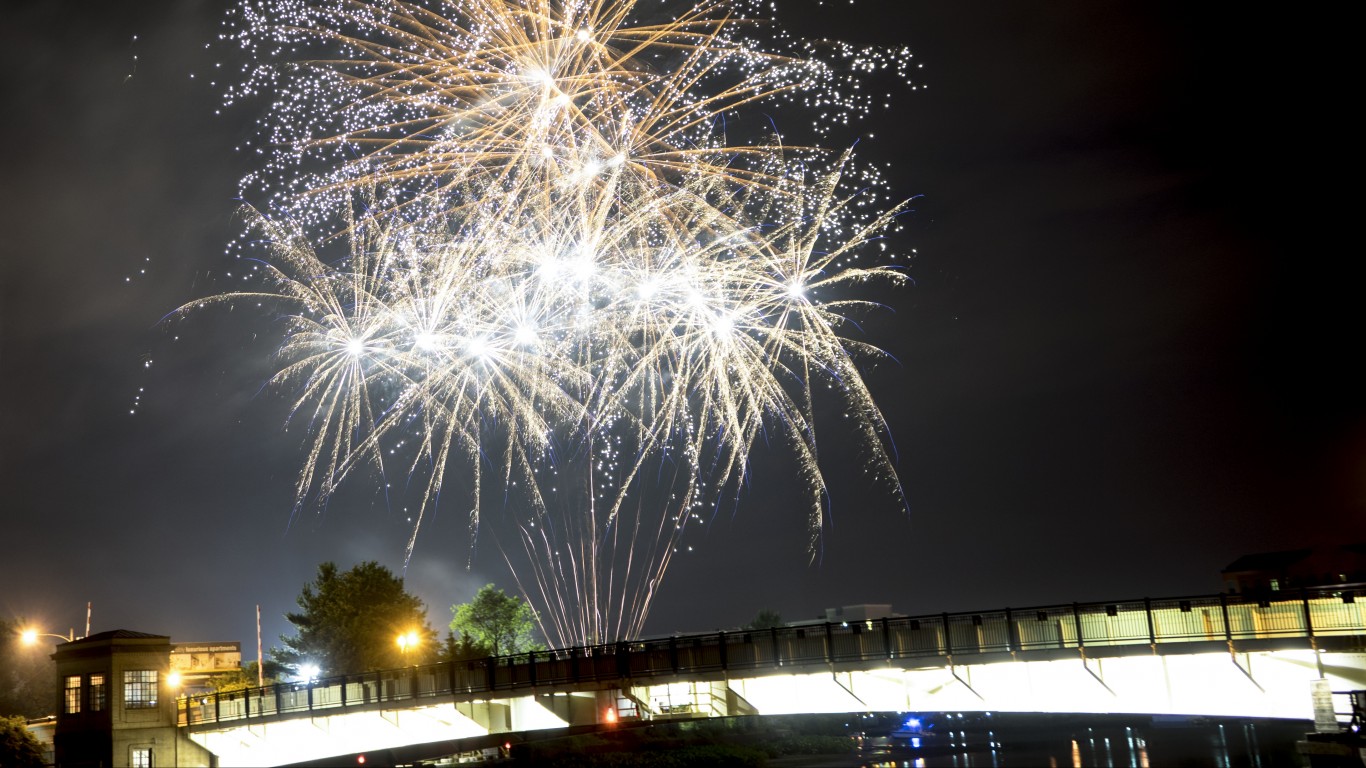
Delaware
> Selling period: 30 day periods prior to July 4 and Dec. 31
> Minimum age to purchase: 18 years old
> COVID-19 crowd restrictions: 250 person limit
While many states choose to ban types of fireworks, Delaware’s restrictions often hinge on the size of the pyrotechnics. Sparklers are permitted, as are fountains with 75 grams or less of pyrotechnic composition per tube or a total of 500 grams or less for multiple tubes. Glow worms and smoke devices can have no more than 20 grams of pyrotechnic composition, and noisemakers like party poppers or snappers must contain 16 milligrams or less. All other fireworks like Roman candles, daygo bombs, and aerial shell devices are banned.
Many cities, including Dover, Rehoboth Beach, and others have canceled fireworks displays well before July 4, though a group of businesses around Dewey Beach is still planning to hold a display in the area. The state has banned mass gatherings of more than 250 people.
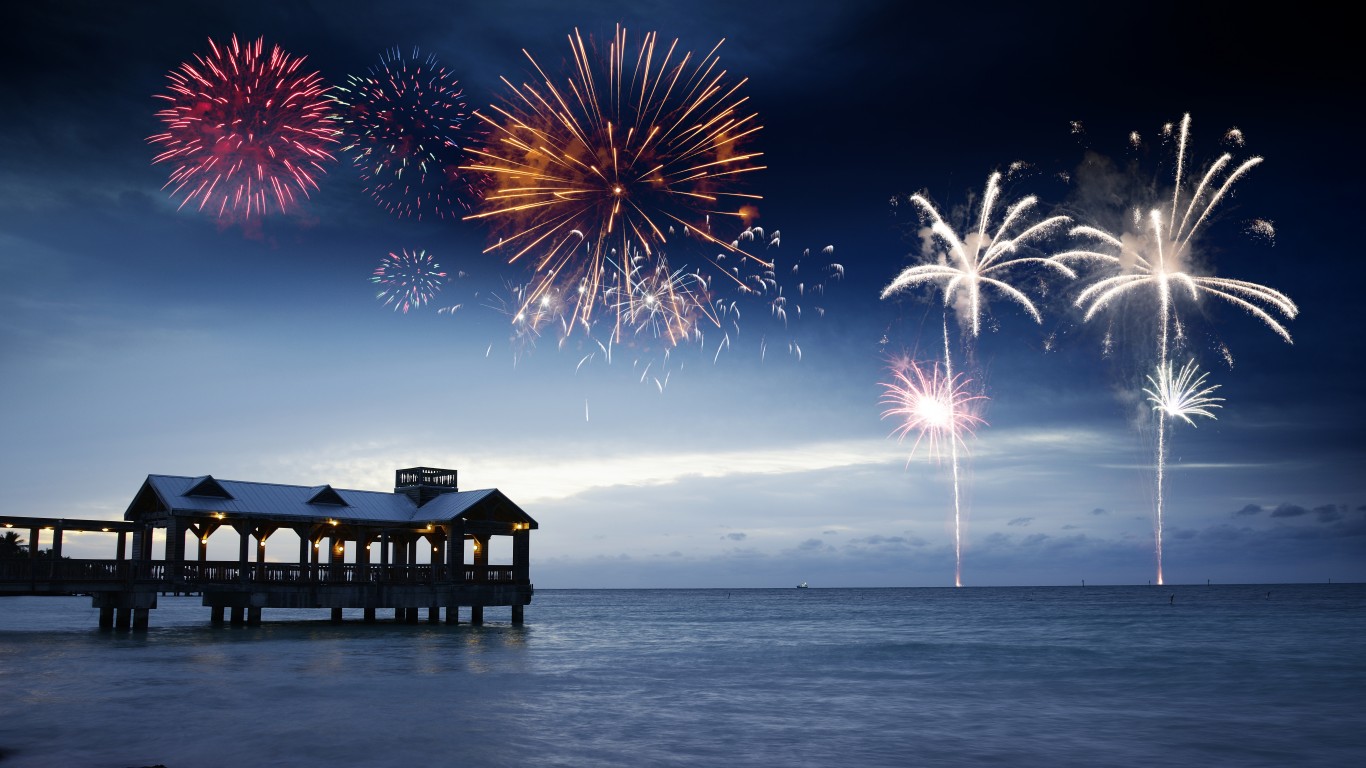
Florida
> Selling period: Year-round
> Minimum age to purchase: 18 years old
> COVID-19 crowd restrictions: 50 person limit
Until recently, Florida had relatively restrictive laws surrounding the sale of fireworks. Customers could only purchase non-explosive, non-aerial sparkling devices containing a maximum of 100 grams of pyrotechnic material in the state. And in order to buy products like Roman candles, firecrackers, and bottle rockets customers had to sign a legal document stating that they were for agricultural purposes, namely frightening birds.
But earlier this year, state lawmakers passed a bill that will allow revelers to use aerial and explosive fireworks on the Fourth of July, New Year’s Eve, and New Year’s Day.
[in-text-ad-2]
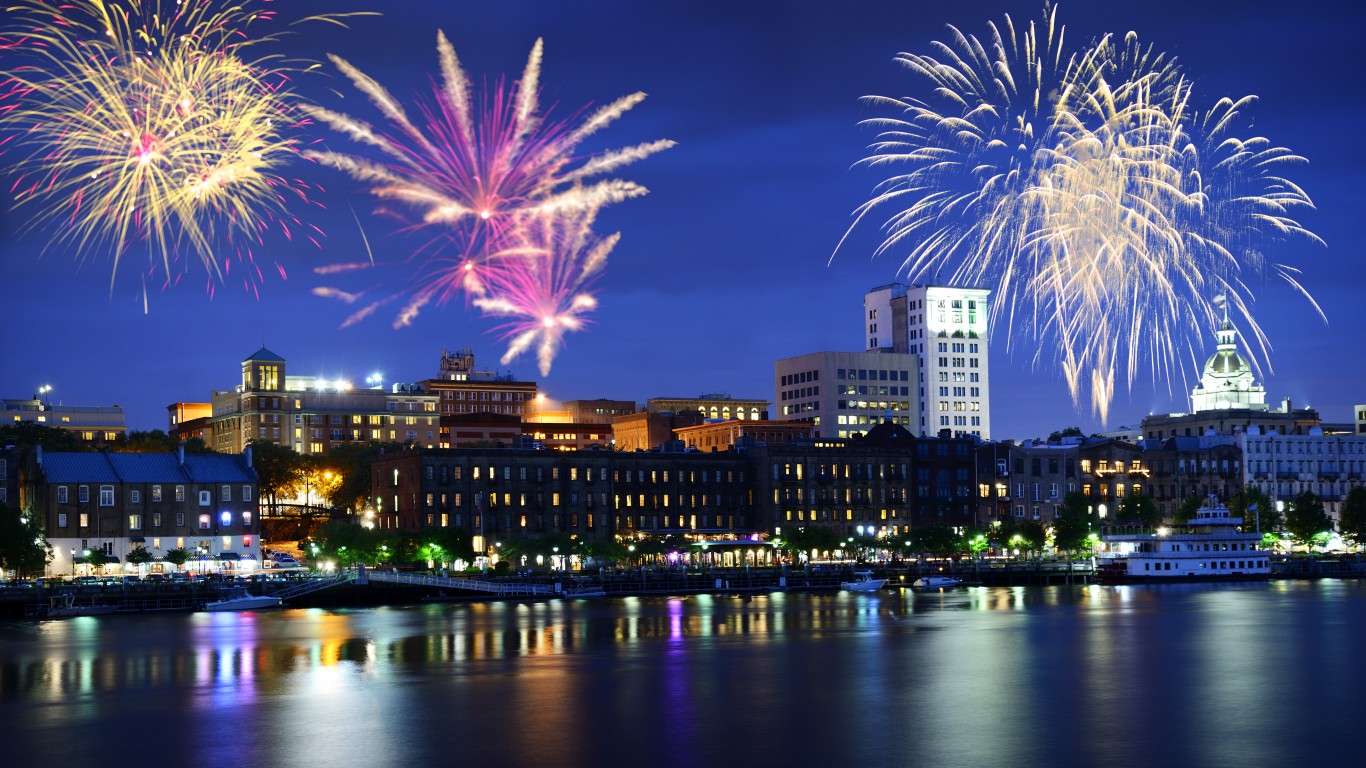
Georgia
> Selling period: Year-round
> Minimum age to purchase: 18 years old
> COVID-19 crowd restrictions: Attendees must remain 6 ft. apart
In Georgia, Roman candles, sparklers with less than 100 grams of combustible material, smoke devices, party poppers, and other non-explosive, non-aerial items that do not have more than a certain amount of chemical compound are legal. Since 2016, bottle rockets and firecrackers have also been allowed in the state. Generally, celebrators are allowed to shoot off fireworks until 11:59 pm on July third and fourth.
This year, residents may be more inclined to put on their own fireworks display, as previously planned shows around the state, including in Cobb County, Paulding County, Stone Mountain, and Sandy Springs, have been canceled.
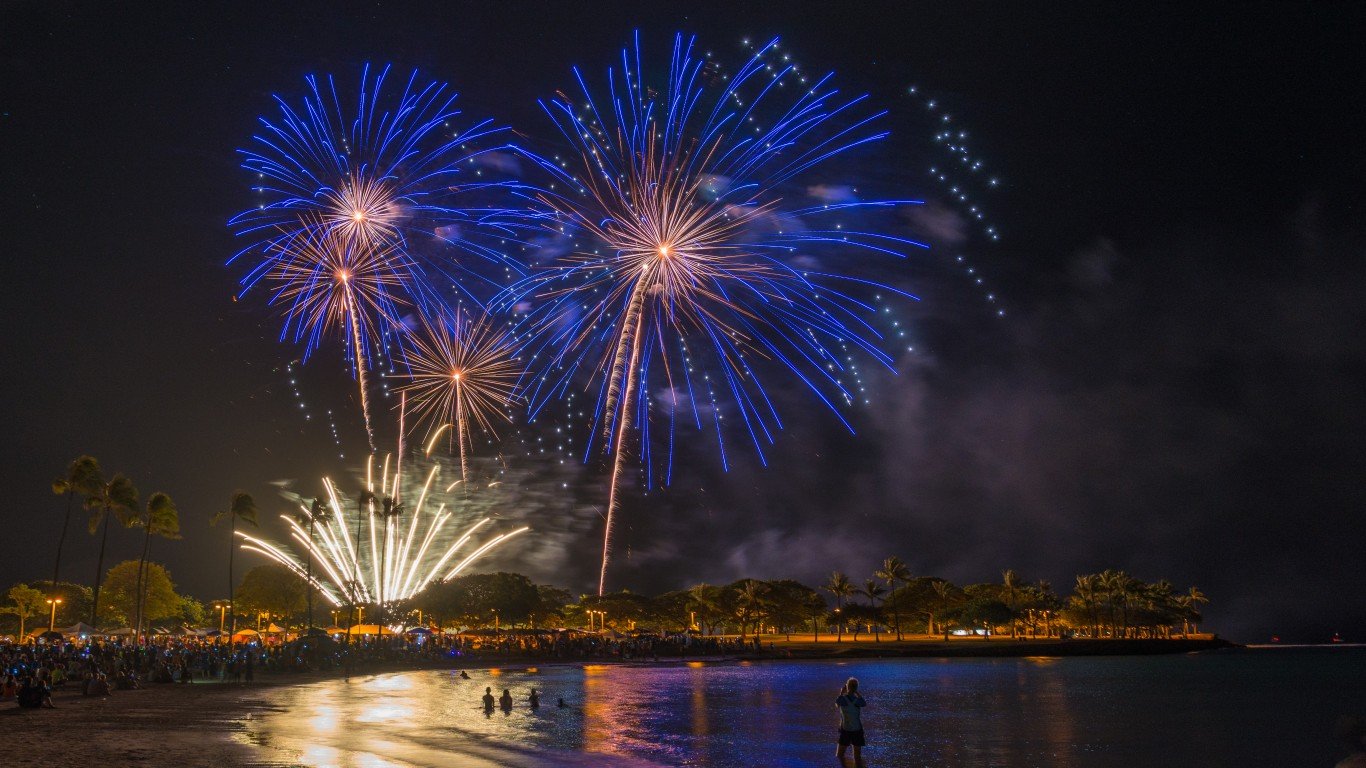
Hawaii
> Selling period: Within 5 days of New Years, Chinese New Years, July Fourth, or other culture event
> Minimum age to purchase: 18 years old
> COVID-19 crowd restrictions: 100 person limit
Hawaii has a long list of prohibited fireworks such as bottle rockets, torpedoes, daygo bombs, Roman candles, flying pigs, jumping jacks, and aerial shells. Even permitted fireworks can only be sold within five days of certain holidays and may only be purchased by adults. Pyrotechnics also cannot be sold after midnight on New Year’s day, 6 p.m. on Chinese New Year’s Day, and 8:00 p.m. on July Fourth.
As the state has banned outdoor gatherings of more than 100 people, many fireworks events across the islands have been canceled.
[in-text-ad]
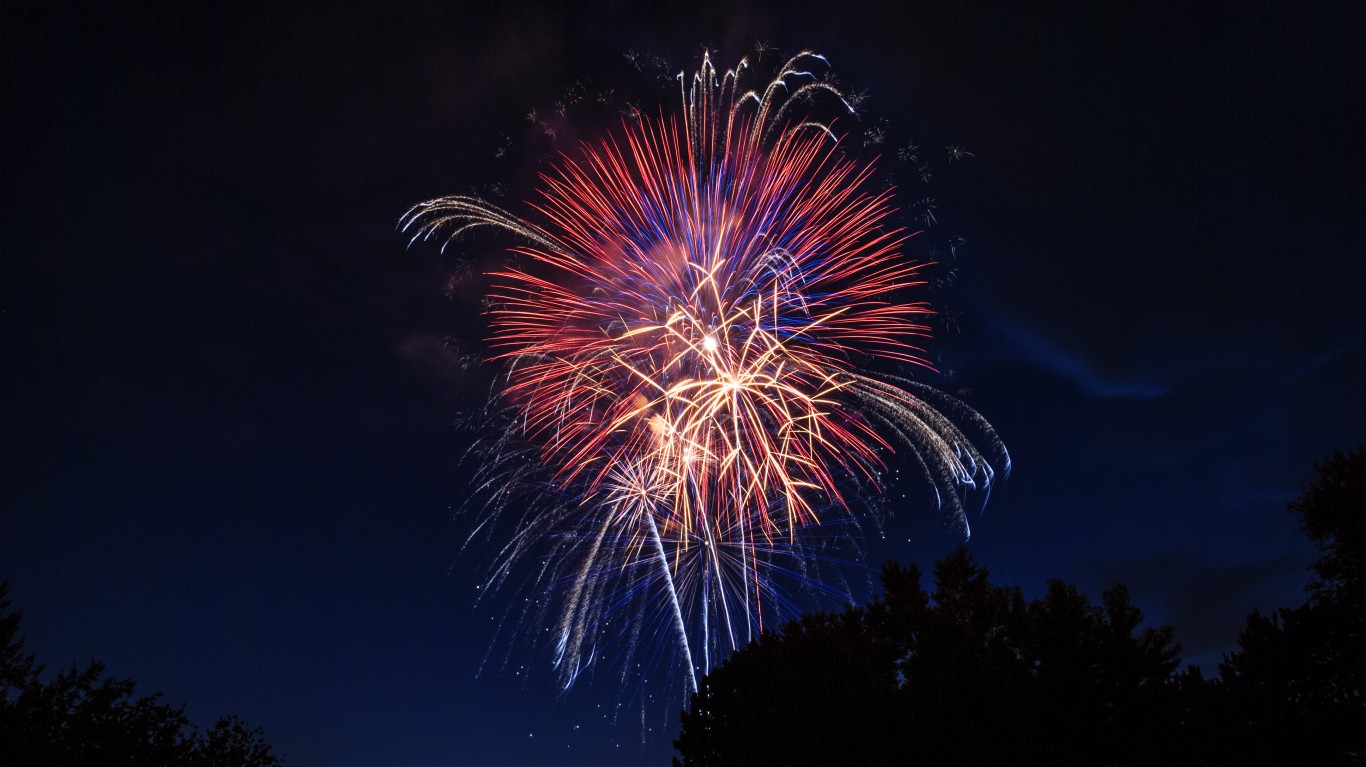
Idaho
> Selling period: June 23-July 5; Dec. 26-Jan. 1
> Minimum age to purchase: N/A
> COVID-19 crowd restrictions: None
In Idaho, any firework product not specifically permitted — such as spinners, fountains, sparklers, and smoke devices — are illegal. While the official period during which retailers can legally sell fireworks extends from midnight, June 23 through midnight July 5, and again from midnight Dec. 26 through midnight Jan. 1, local jurisdictions may extend the period by five days at their discretion.
Across Idaho, many municipalities are still hosting fireworks displays — but with some modifications. In Caldwell and Cascade, celebrations will be held, but attendees will be encouraged to maintain social distance. Coeur d’ Alene has canceled its fireworks display, but will still hold a parade and other planned events.
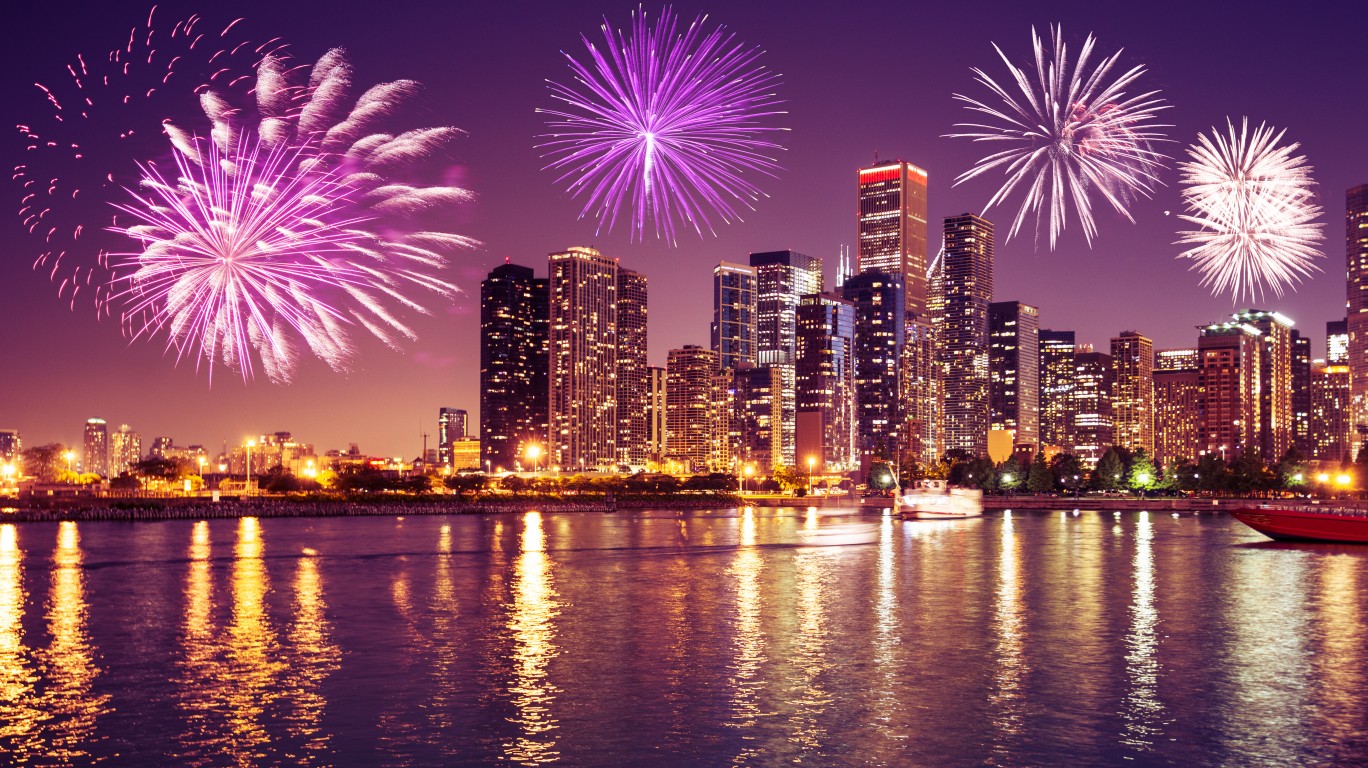
Illinois
> Selling period: Year-round
> Minimum age to purchase: 18 years old
> COVID-19 crowd restrictions: 50 person limit
Illinois is one of only three states where just sparklers and novelty items — such as party poppers and smoke devices — are allowed. With some of the strictest fireworks laws on the books, and crowd restrictions in place to contain the spread of COVID-19, enjoying a fireworks display may be more difficult this year in Illinois than in much of the rest of the country. The Navy Pier in Chicago canceled its annual July Fourth fireworks display. The village of Oak Lawn and city of Rockford have also canceled their fireworks shows, and Northbrook has rescheduled its fireworks display to Sept. 5.
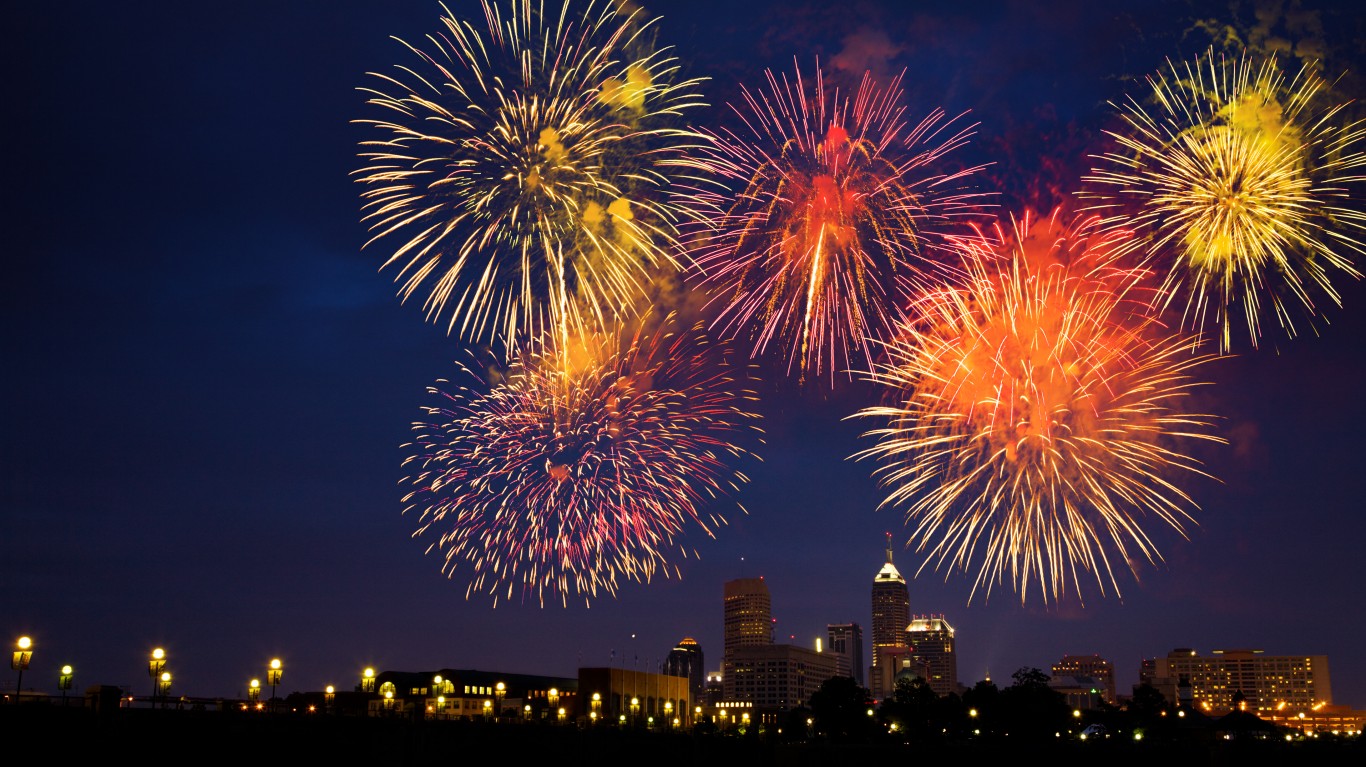
Indiana
> Selling period: Year-round
> Minimum age to purchase: 18 years of age
> COVID-19 crowd restrictions: 5,000 person limit
Indiana does not ban any specific kinds of fireworks, and all products that comply with federal regulations from the U.S. Consumer Products Commission are permitted. However, pyrotechnics must be used at specific discharge locations, the user’s property, or the property of someone who has given permission.
Indiana is one of few states that does have time restrictions on when fireworks can be used: on holidays like July Fourth and New Year’s Eve, fireworks are permitted from 9 a.m. until midnight, while on other days fireworks can be used only from 9 a.m. to 11 p.m. — and these hours can be curtailed by local authorities. While the Indianapolis annual IPL Downtown Freedom Fest has been canceled, other towns like Carmel, Lawrence, Noblesville, and more are still planning to host fireworks displays.
[in-text-ad-2]
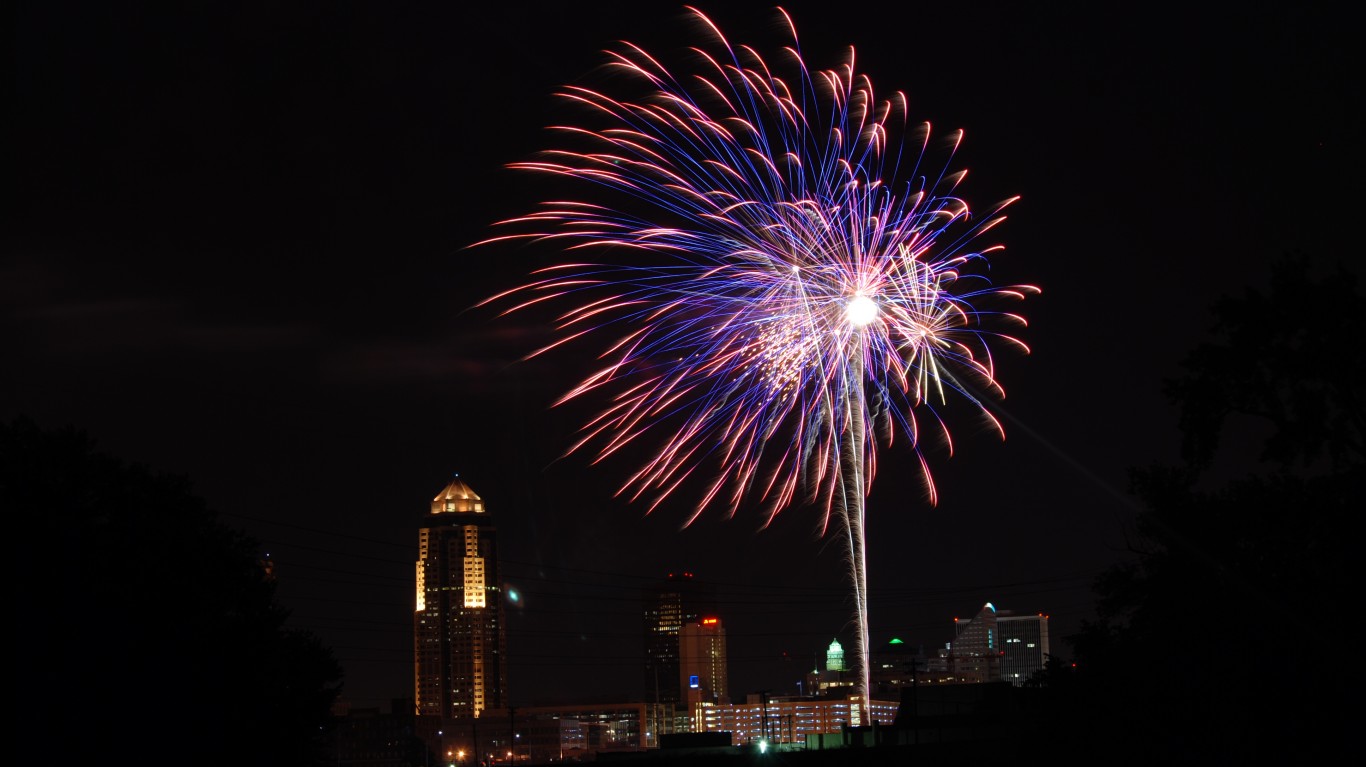
Iowa
> Selling period: June 1-July 8; Dec. 10-Jan. 3
> Minimum age to purchase: 18 years old
> COVID-19 crowd restrictions: Social distancing required
Iowa has some of the least restrictive fireworks sales laws in the country. Adults are allowed to legally purchase a wide range of products, including Roman candles, bottle rockets, firecrackers, aerial spinners, missile-type rockets, sparklers, and other handheld devices. No types of fireworks are explicitly prohibited in the state. It is important to note that the days and times revelers are permitted to set off fireworks vary by jurisdiction within the state.
Many in the state who want to celebrate American independence might have to put on their own show. Des Moines postponed its Yankee Doodle Pops concert until Sept. 7, Ames canceled its annual Fourth of July parade, and Davenport’s Star Spangled Extravaganza was postponed until further notice as COVID-19 cases have risen in the county.
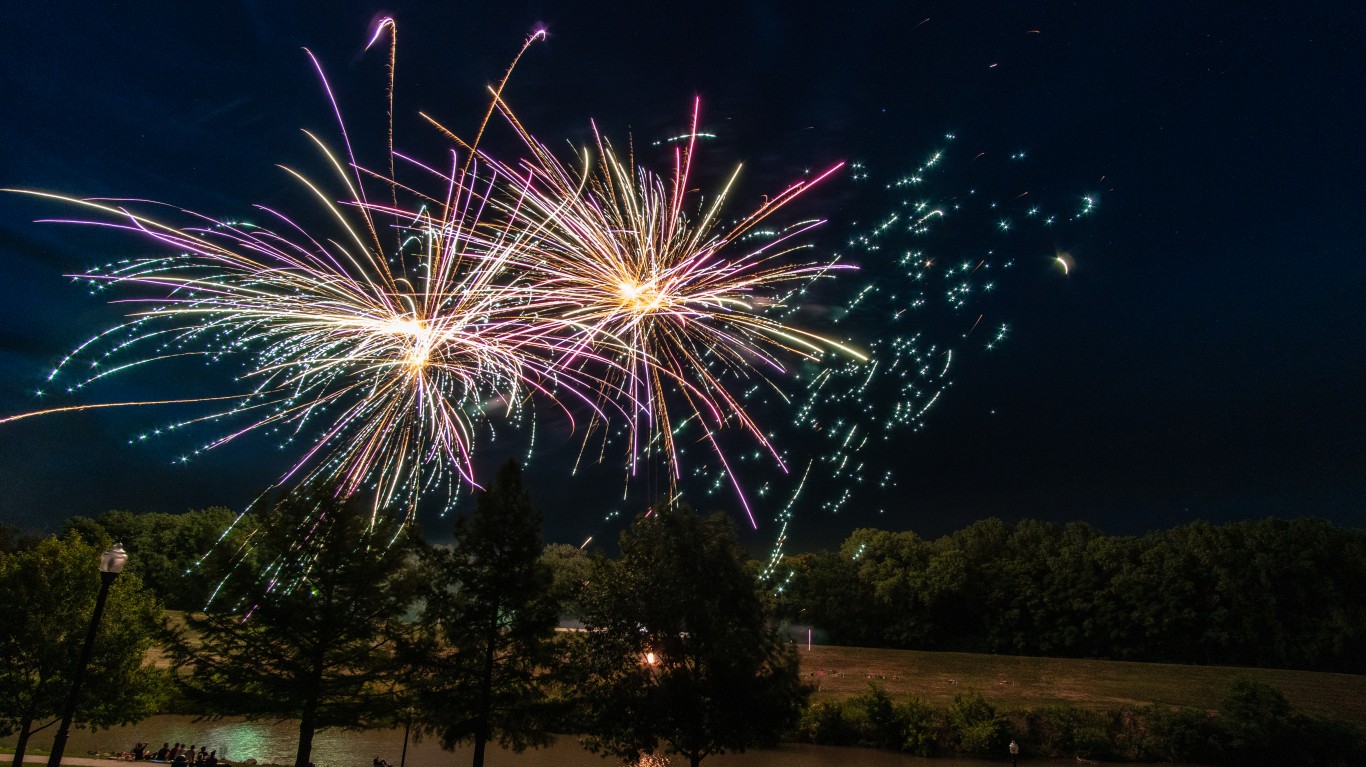
Kansas
> Selling period: June 27-July 5
> Minimum age to purchase: N/A
> COVID-19 crowd restrictions: 45 people or less
The only types of fireworks prohibited in Kansas are certain types of rockets, specifically those mounted on a wire or stick. The state has a relatively short nine-day window — from June 27 to July 5 — in which residents can buy fireworks, including mail-order fireworks.
Citing an uptick in COVID-19 cases, Kansas Gov. Laura Kelly recommended the state stays in phase 3 of its reopening plan, which limits gatherings to a maximum of 45 people. In the Kansas City area, some fireworks events are canceled while others are not.
[in-text-ad]
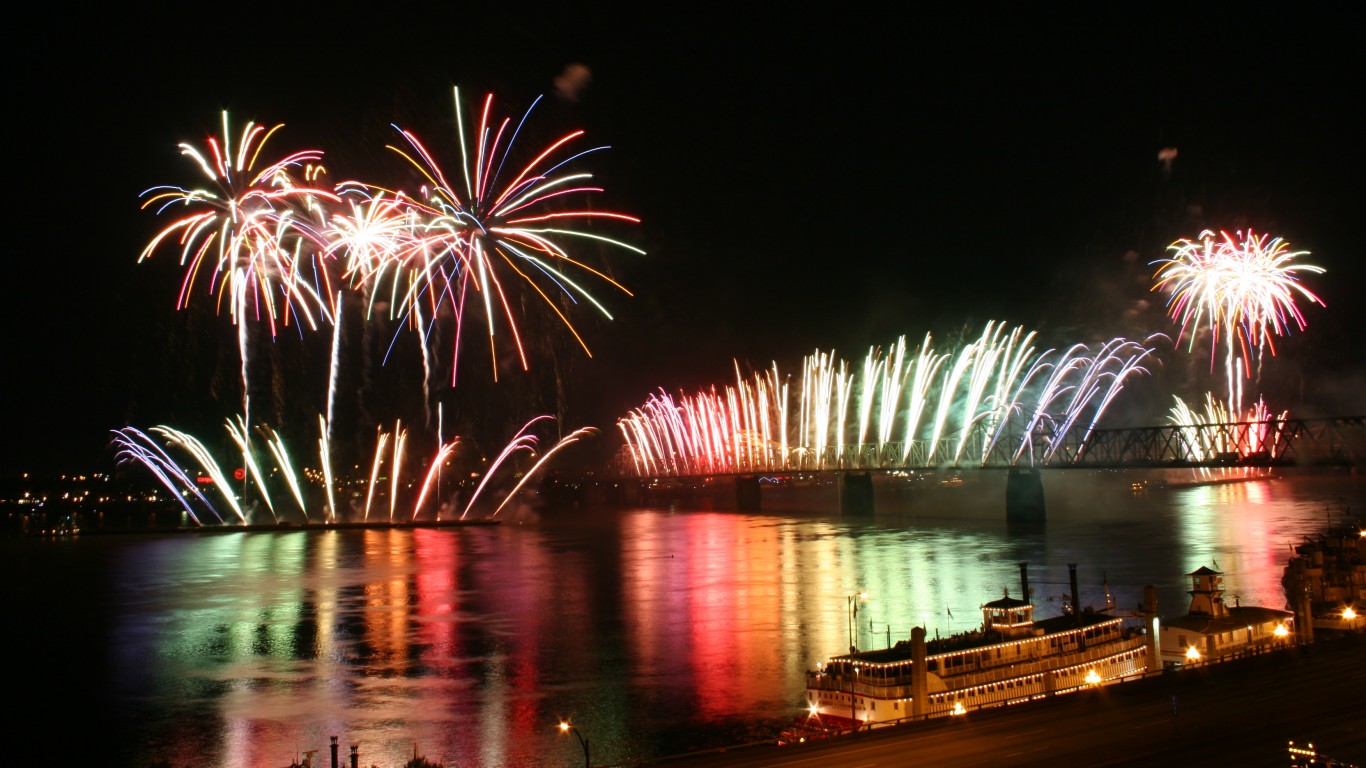
Kentucky
> Selling period: Year-round
> Minimum age to purchase: 18 years old
> COVID-19 crowd restrictions: 50 person limit
Adults in Kentucky are legally allowed to purchase aerial devices like bottle rockets, helicopters, and aerial spinners, as well as other devices like Roman candles, cone fountains, sparklers, and ground spinners. When consumers are allowed to use fireworks, however, varies by county.
Concerns over the coronavirus prompted city officials in Louisville to cancel the city’s annual Fourth of July fireworks display. Meanwhile, Lexington is canceling its annual parade, but it will still put on a fireworks show to celebrate Independence Day.
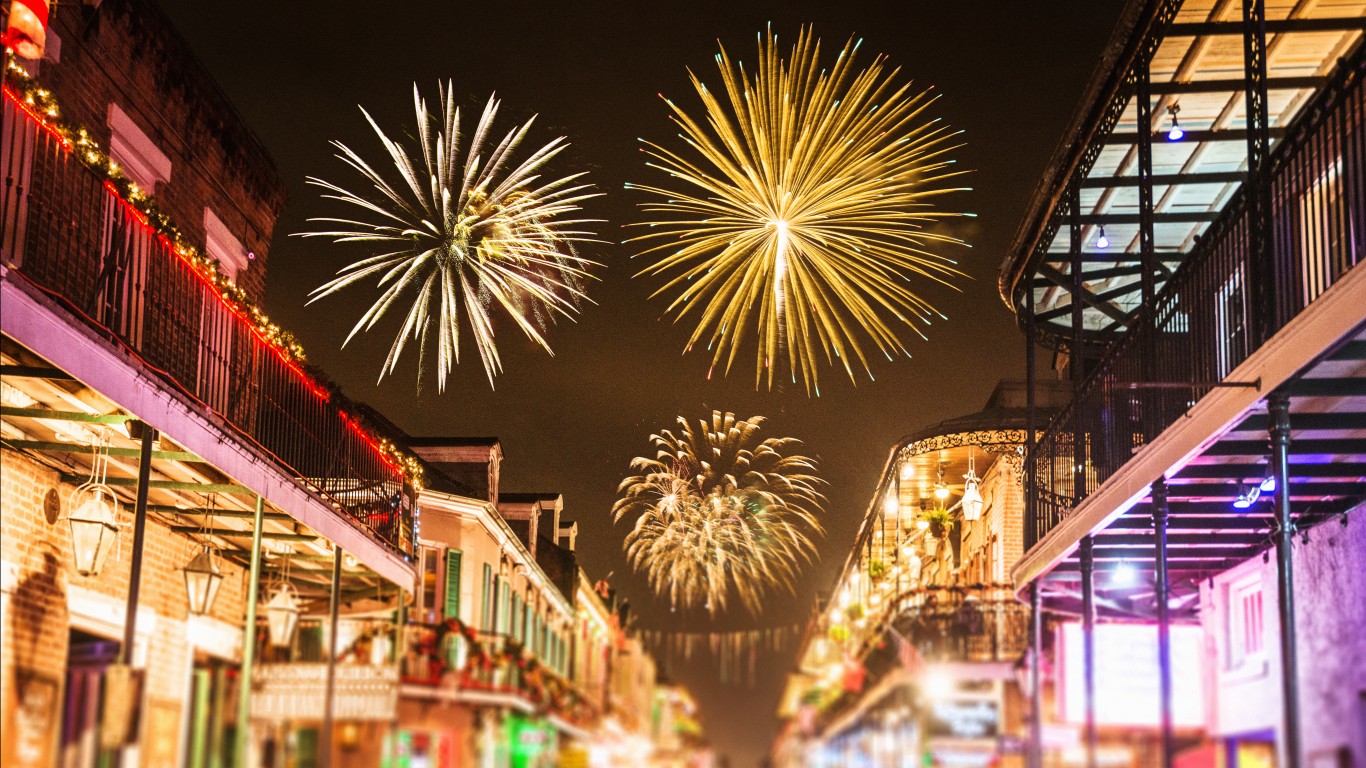
Louisiana
> Selling period: June 16-July 5, Dec.15-Jan. 1
> Minimum age to purchase: 15 years old
> COVID-19 crowd restrictions: Social distancing required
Many of the fireworks restrictions in Louisiana are made based on the size of the item. The state banned larger American-made salutes, firecrackers, torpedoes, and sky rockets. Cherry bombs, tubular salutes, and aerial bombs are also banned.
Louisiana has two selling periods — from June 16 to July 5, and from Dec. 15 to Jan. 1. Purchasers must be at least 15 years old. With Louisiana officials advising residents to avoid large gatherings, major fireworks displays have been canceled across the state, including in major cities like New Orleans and Baton Rouge.
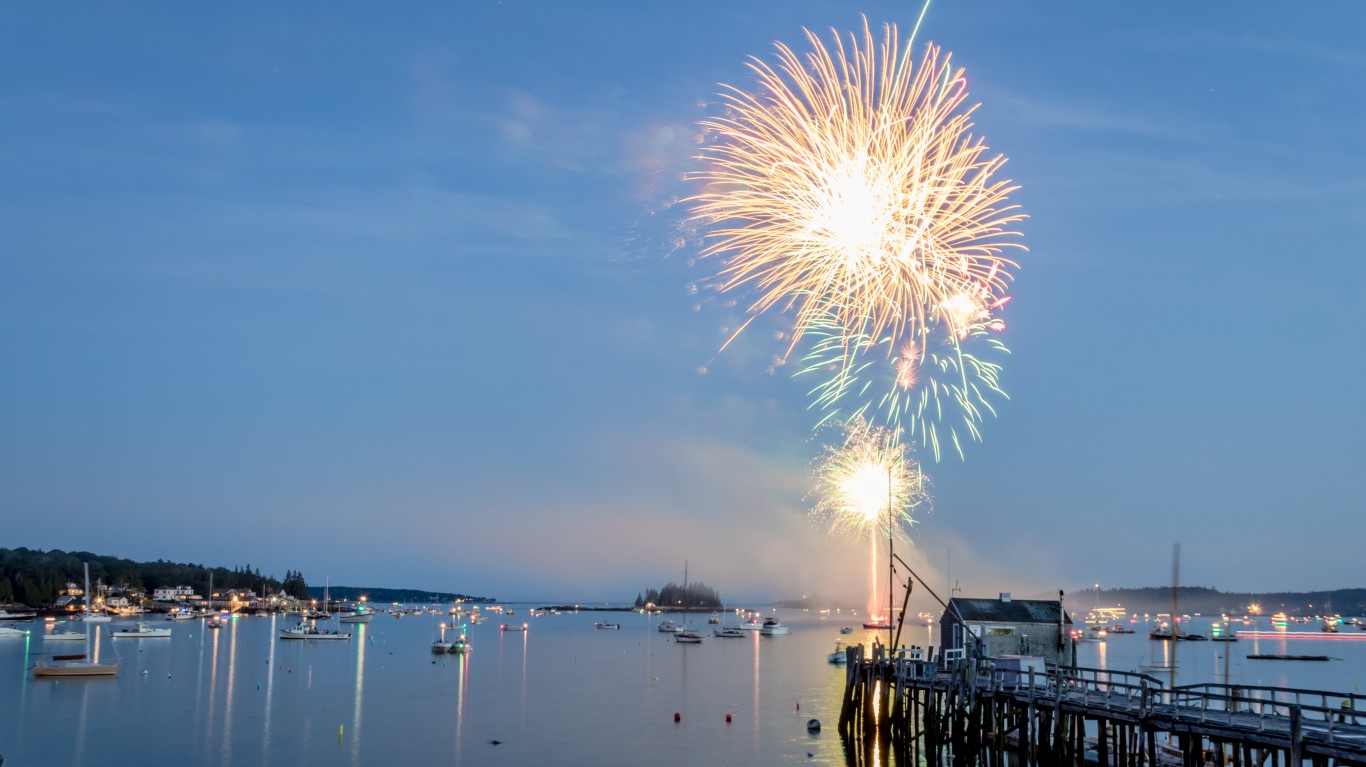
Maine
> Selling period: Year-round
> Minimum age to purchase: 21 years old
> COVID-19 crowd restrictions: 50 person limit
In Maine, residents are allowed to light fireworks every day from 9 a.m. to 10 p.m., except for July Fourth and New Year’s celebrations, when celebrants are permitted to set them off until 12:30 a.m. A wide range of fireworks are legal in the state, but missile-type rockets, aerial spinners, and bottle rockets are prohibited. Maine has a higher minimum age requirement for buying fireworks than most states, as people under age 21 cannot legally purchase them.
This year, as cities across the state have canceled fireworks displays amid coronavirus fears, commercial firework sales are booming. Augusta, Bangor, Bar Harbor and Portland have each called off their annual fireworks display.
[in-text-ad-2]
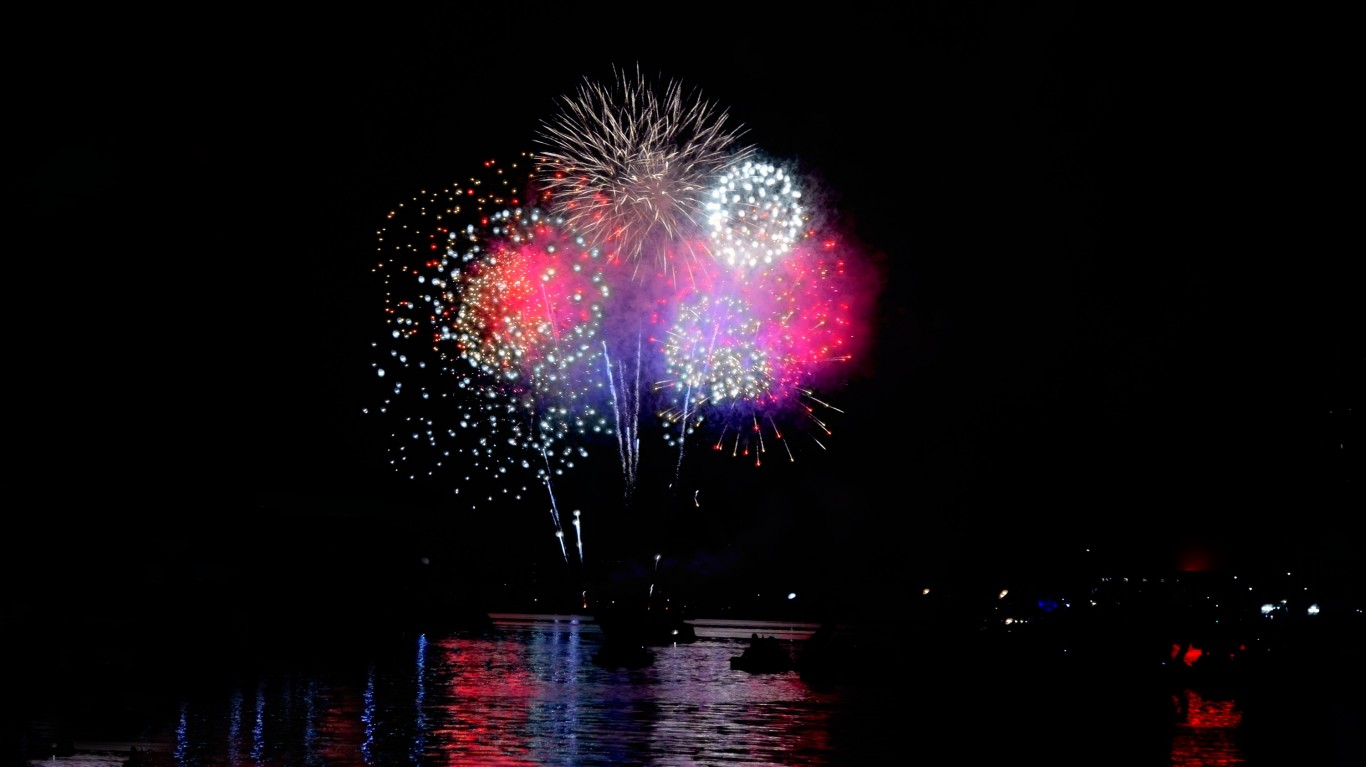
Maryland
> Selling period: Year-round
> Minimum age to purchase: 16 years old
> COVID-19 crowd restrictions: 10 person limit
Maryland has relatively strict fireworks restrictions. Only sparklers, non-aerial and non-explosive fountains, snakes, and snappers are permitted. All other kinds not explicitly permitted are banned. Residents must be at least 16 years old to buy pyrotechnics.
Many of the largest cities in Maryland have canceled fireworks events, including Baltimore, Towson, Havre de Grace, Catonsville, Ocean City, and more.
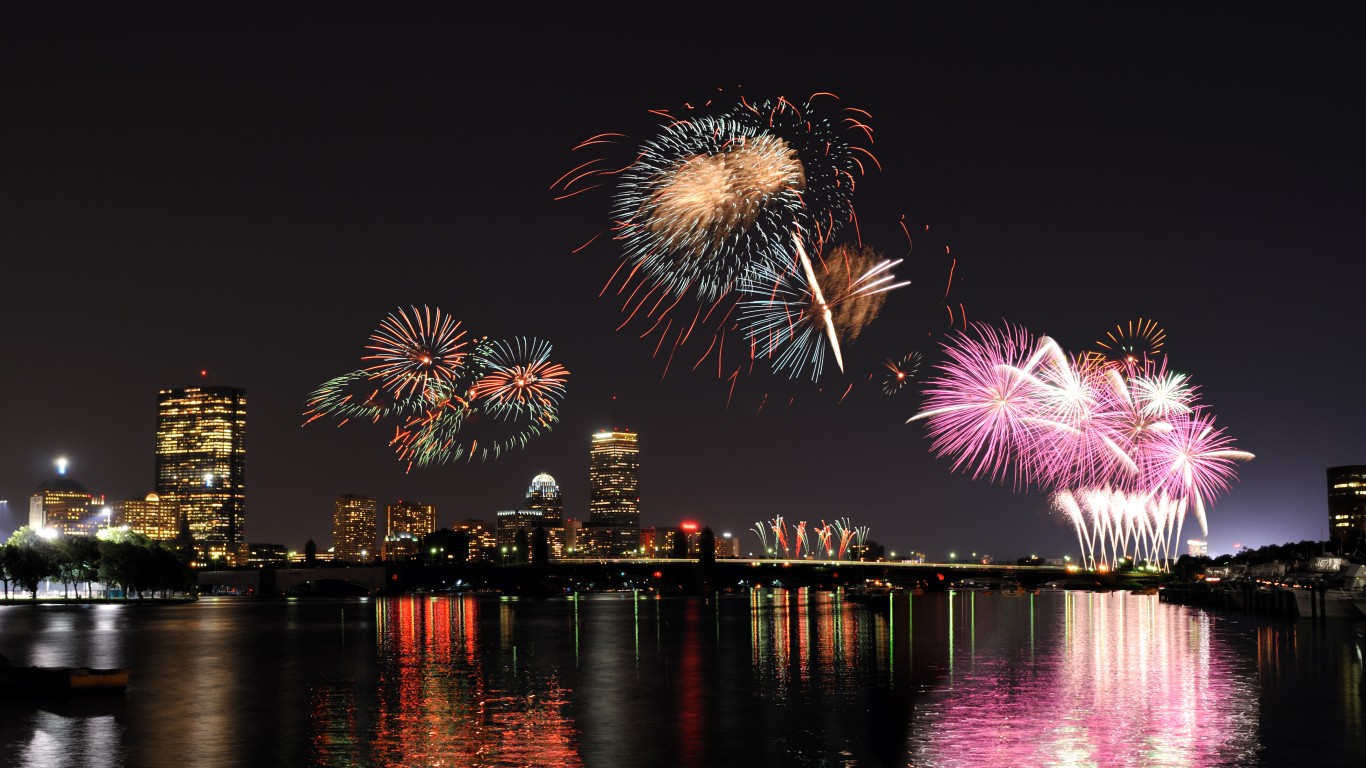
Massachusetts
> Selling period: Never
> Minimum age to purchase: N/A
> COVID-19 crowd restrictions: 10 person limit
A handful of states in the Northeast have especially restrictive fireworks laws, and Massachusetts is among them. It is the only state that does not permit the sale of any consumer grade fireworks. Although many state residents drive across the border to New Hampshire to buy fireworks, their use — even sparklers, snappers, and firecrackers — within Massachusetts is still illegal.
Luckily, many municipalities across the state will have fireworks displays for Independence Day but not necessarily on July Fourth. Because of coronavirus concerns, the date for these fireworks shows that are typically held on or close to July Fourth has yet to be determined.
[in-text-ad]
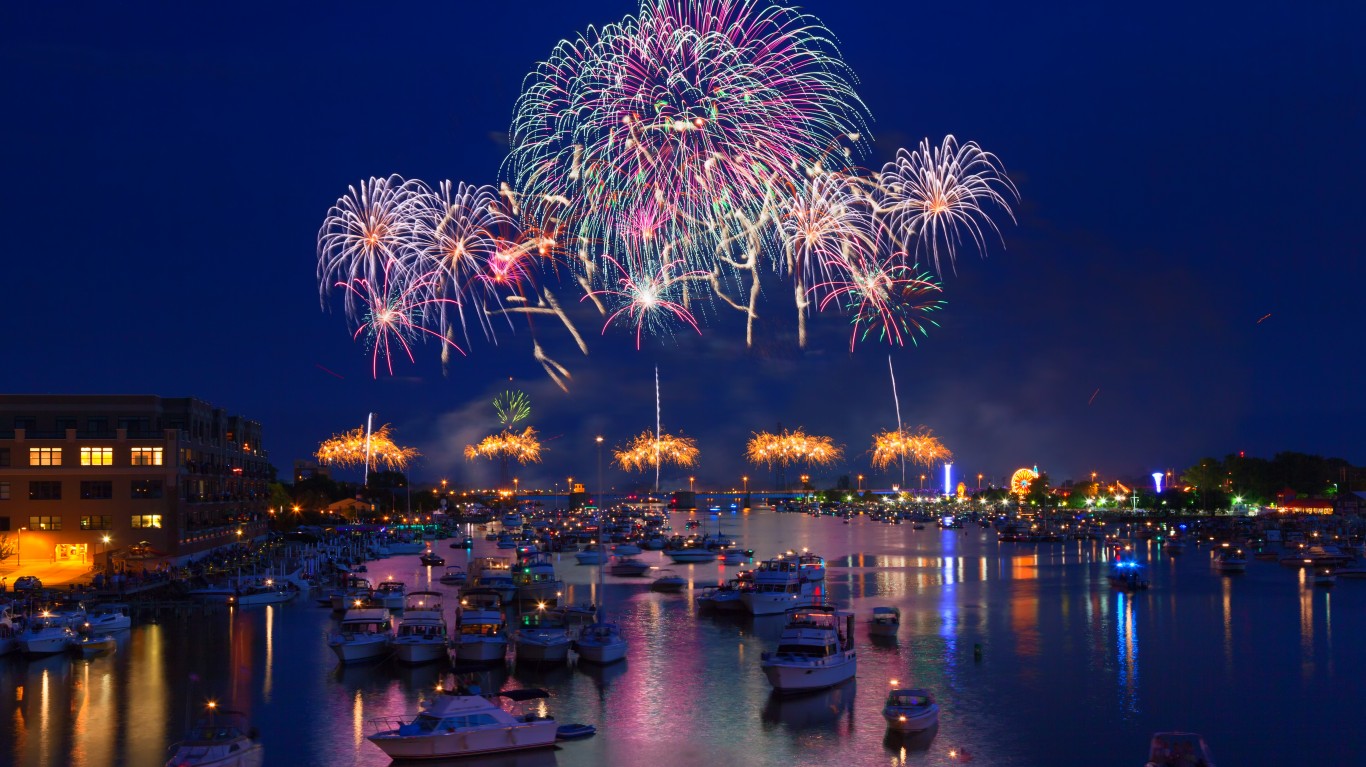
Michigan
> Selling period: Year-round
> Minimum age to purchase: 18 years old
> COVID-19 crowd restrictions: 250 person limit
Michigan permits all types of fireworks that are allowed by federal regulations, though it does have a number of regulations about how they should be used or sold. The state also stipulates that purchasers cannot be under the influence of drugs or alcohol. Fireworks cannot be used on public property. Sellers must have their locations reviewed and approved by the Bureau of Fire Services and have insurance of at least $10 million.
Michigan has limited gatherings to no more than 250 people. Many of the largest cities in Michigan have canceled their fireworks displays, but some smaller towns are going ahead with their plans for July Fourth.
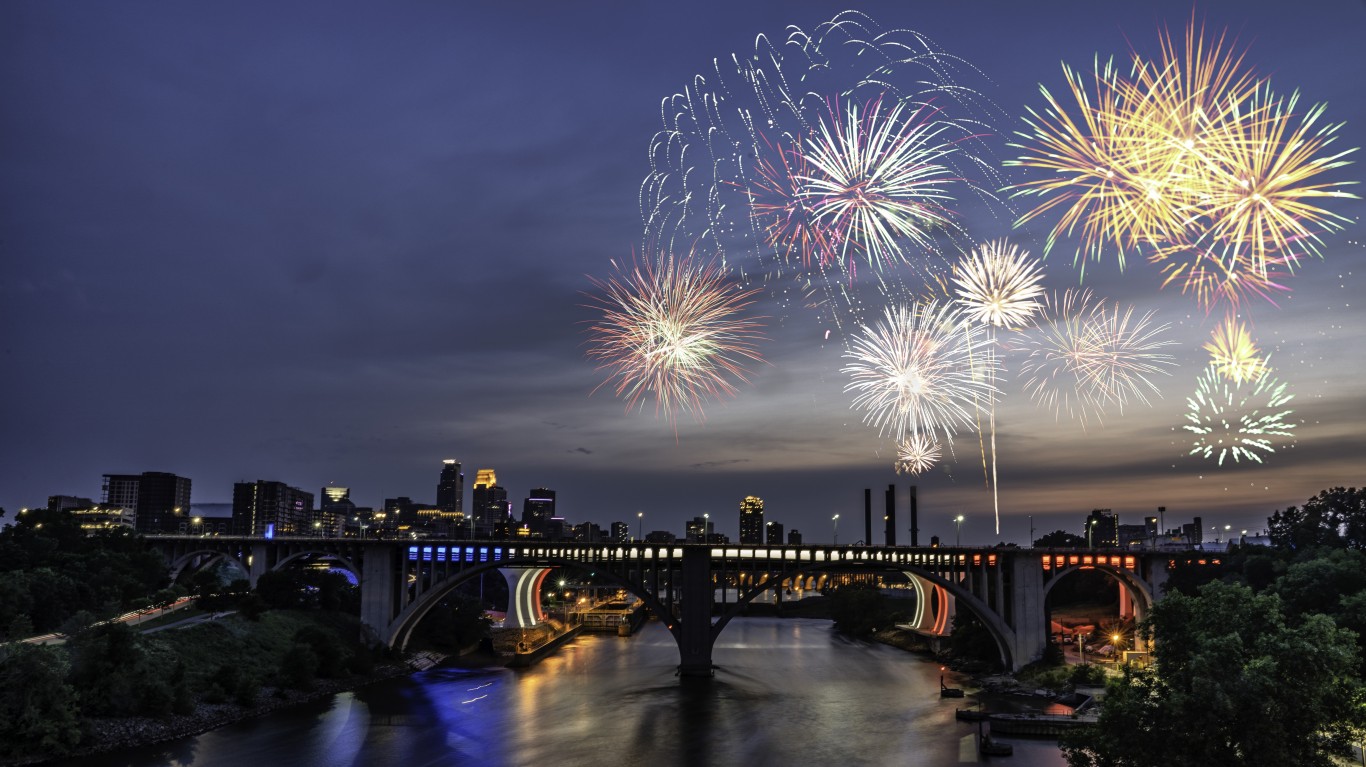
Minnesota
> Selling period: Year-round
> Minimum age to purchase: 18 years old
> COVID-19 crowd restrictions: 25 person limit
Adults in Minnesota can legally purchase sparklers with less than 100 grams of pyrotechnic composition and ground-based fireworks with certain limits of chemical mixture. However, products like firecrackers, torpedoes, skyrockets, bottle rockets, and Roman candles are prohibited.
Fireworks displays in municipalities across the state — including Minneapolis — have been canceled amid coronavirus concerns.
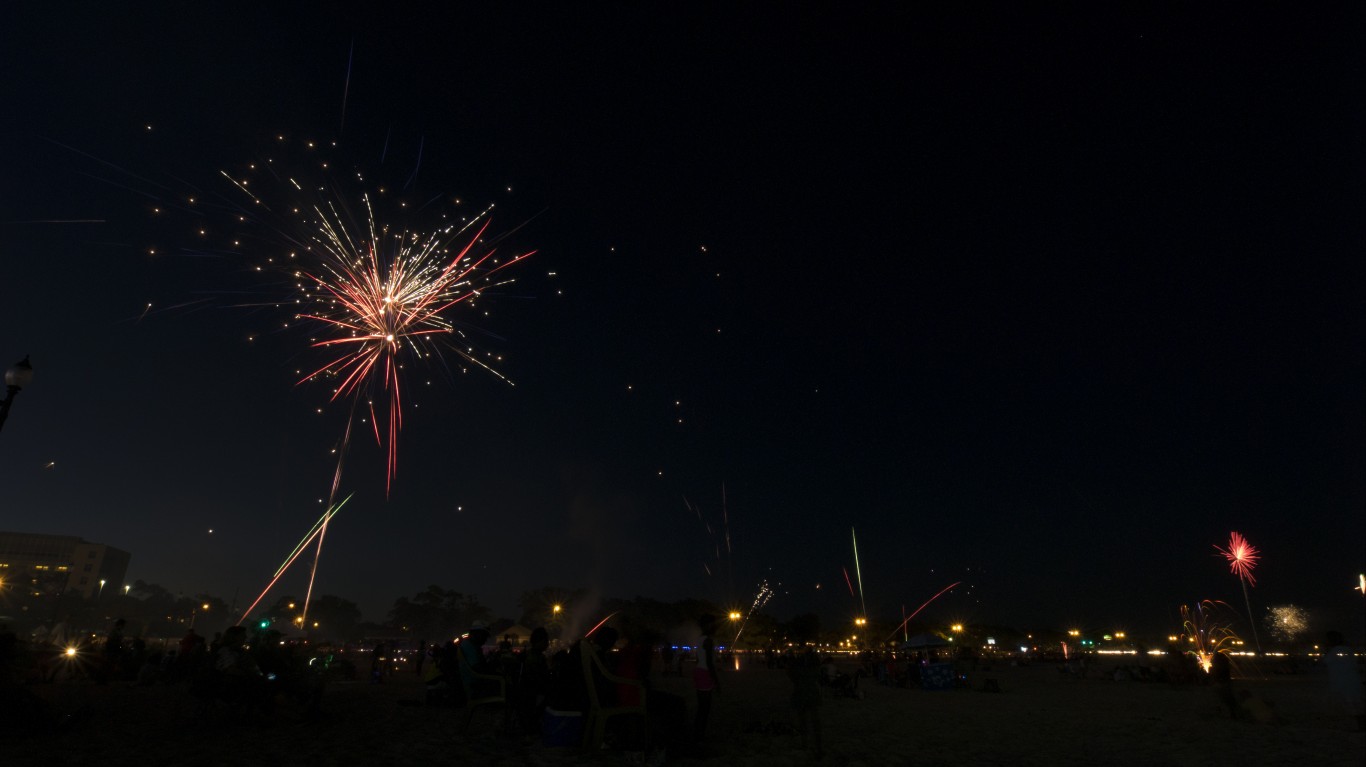
Mississippi
> Selling period: June 15-July 5 and Dec. 5-Jan. 2
> Minimum age to purchase: 12 years old
> COVID-19 crowd restrictions: 100 person limit w/ distancing; 50 without
In Mississippi, customers age 12 and up are allowed to purchase approved fireworks products. These include cone fountains, Chinese crackers, small non-explosive Roman candles, rockets and nonexplosive sparklers. Fireworks purchases can only be made between June 15 and July 5 and again from Dec. 5 to Jan. 2. It is important to note that fireworks use is explicitly prohibited in a number of Mississippi cities, including Biloxi, Hattiesburg, Oxford, Pascagoula, Tupelo, and Vicksburg.
Fireworks displays to celebrate Independence Day have been canceled or postponed in municipalities around the state this year amid the COVID-19 pandemic. These include events in Clinton, Jackson, Memphis, Shelby County, and Pontotoc.
[in-text-ad-2]
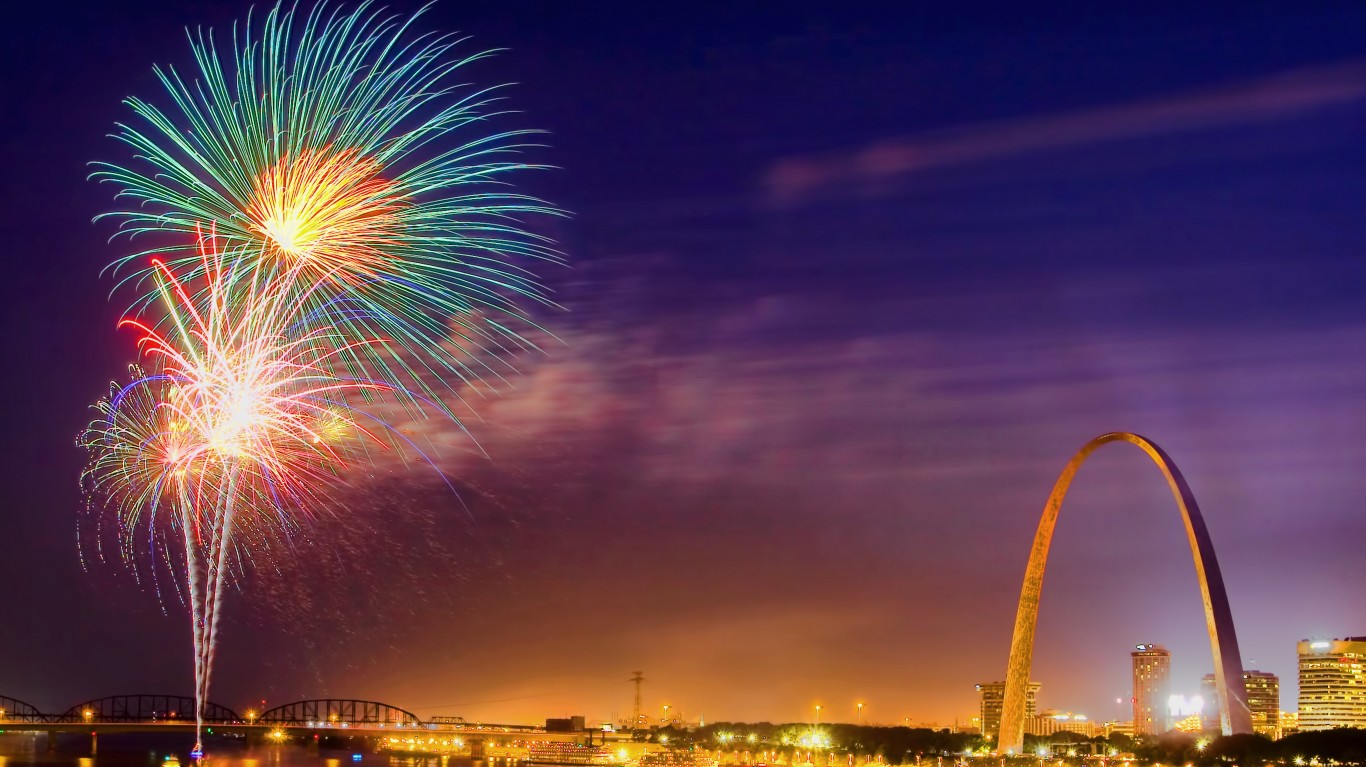
Missouri
> Selling period: June 20-July 10, Dec. 20-Jan. 2
> Minimum age to purchase: 14 years old unless with a guardian.
> COVID-19 crowd restrictions: None
Missouri has relatively lax fireworks restrictions as only ground salutes like cherry bombs, M-80s, or M-1000s are banned. You have to be just 14 years old to buy fireworks in the state, and only 16 to sell them, though younger Missourians can do either if accompanied by an adult.
Missouri has no gathering restrictions. While many of the largest fireworks displays in St. Louis and Kansas City have been canceled, some of the smaller ones will take place.
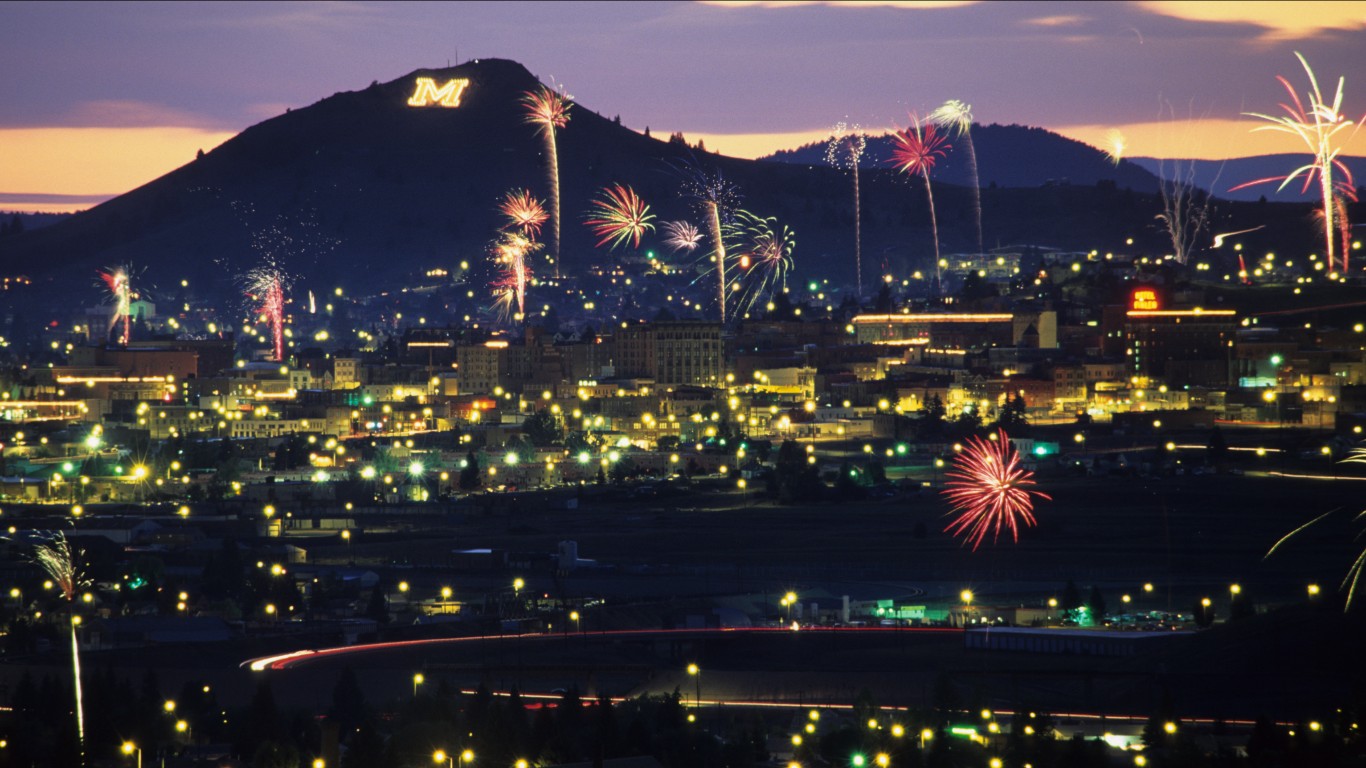
Montana
> Selling period: June 24-July 5; Dec. 29-Dec. 31
> Minimum age to purchase: N/A
> COVID-19 crowd restrictions: Avoid gatherings of 50 or more people
Montana residents are legally allowed to purchase approved fireworks products every year between June 24 and July 5 and again from Dec. 29 to Dec. 31. Approved products include most common consumer grade fireworks with the exception of skyrockets, Roman candles, and bottle rockets.
While the COVID-19 pandemic has led many cities in Montana to cancel events planned for July Fourth, there are still some modified events. Laurel, Montana, will be launching fireworks for residents to view from the safety of their homes. Billings and Red Lodge will also be hosting fireworks shows, one as a drive-in event and one with enforced social distancing, respectively.
[in-text-ad]
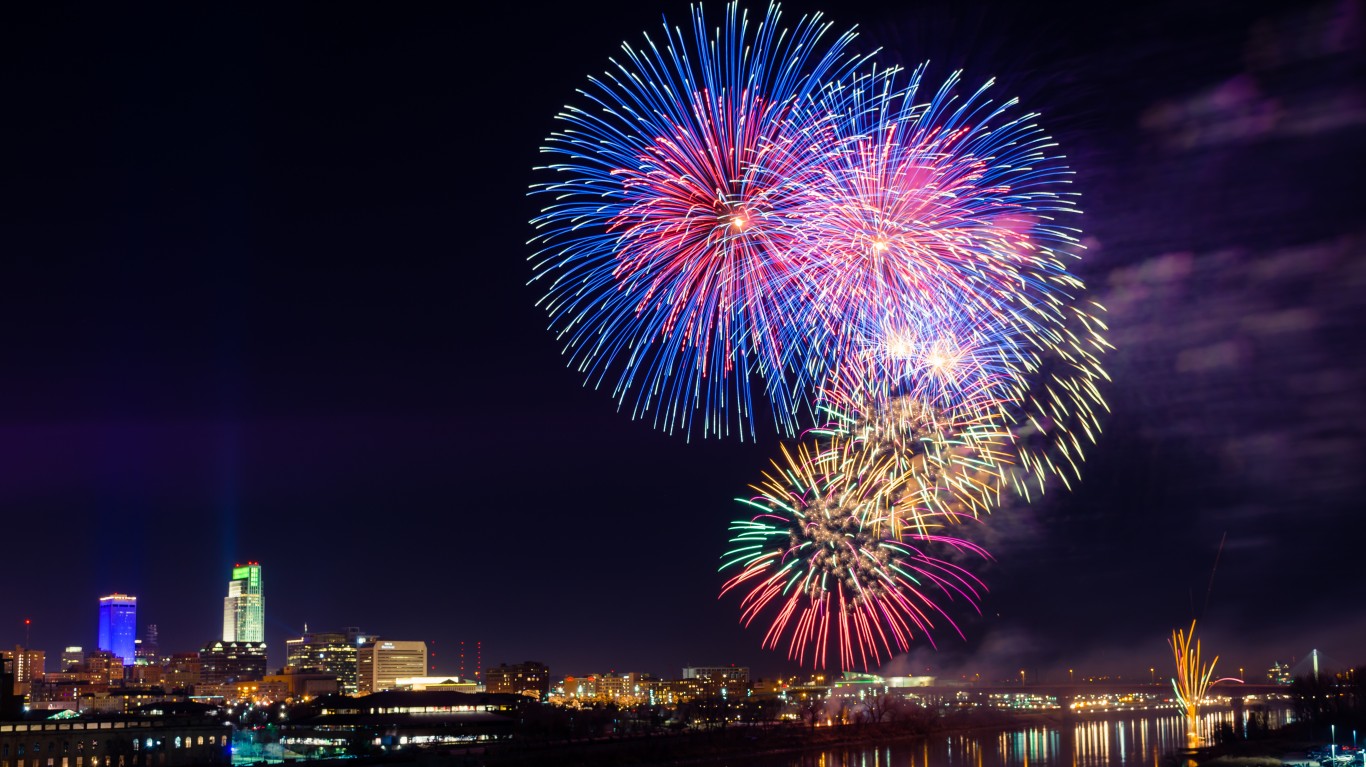
Nebraska
> Selling period: June 25-July 5; Dec. 28-Jan. 1
> Minimum age to purchase: 16 years old
> COVID-19 crowd restrictions: 10,000 person limit
Nebraska publishes a list of permissible fireworks every January. Currently, novelty items, snakes, certain sparklers, spray fountains, torches, and color fire cones are legal while rockets and firecrackers with more than 50 milligrams of explosives are prohibited. Approved firework products may be legally purchased in Nebraska from June 25 through July 5 and again from Dec. 28 to Jan. 1, though local municipalities may limit this period further. It is illegal for anyone younger than 12 to use or possess fireworks in Nebraska, and until age 16, adults must accompany teenagers who want to use fireworks.
Fourth of July celebrations in the state have been canceled in Ralston, Seward, most of the Omaha metro area, and elsewhere.
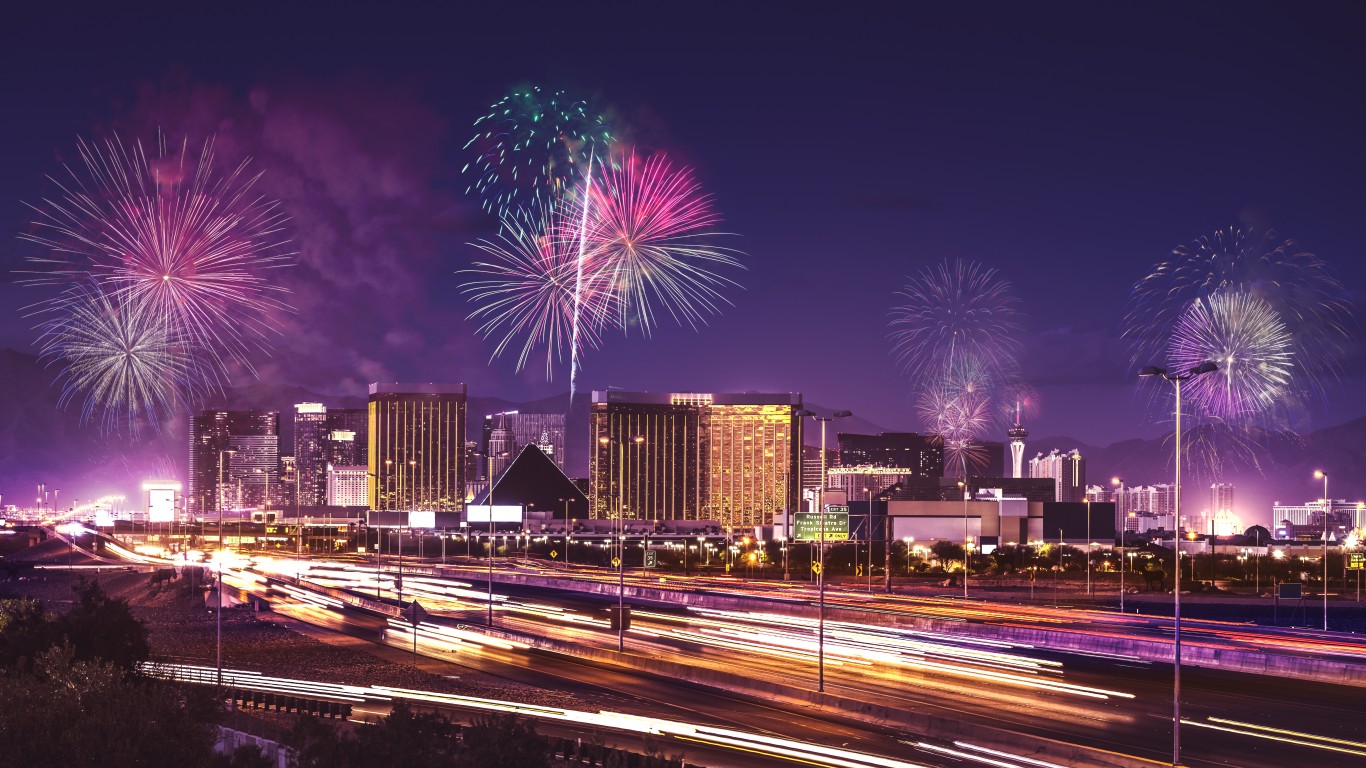
Nevada
> Selling period: Year-round
> Minimum age to purchase: N/A
> COVID-19 crowd restrictions: 50 person limit
Nevada has prohibited some fireworks considered more likely to injure users, like
firecrackers, aerial pyrotechnics and items that explode on impact. Otherwise, there is no other specific statewide legislation restricting selling dates, purchasing age, or any other similar restrictions commonly found in other states.
The state is still in phase two of its reopening plan, so gatherings may not exceed 50 people. Though some fireworks events have been canceled in Nevada, some events in Las Vegas, Henderson, and Red Rocks Resort will take place.
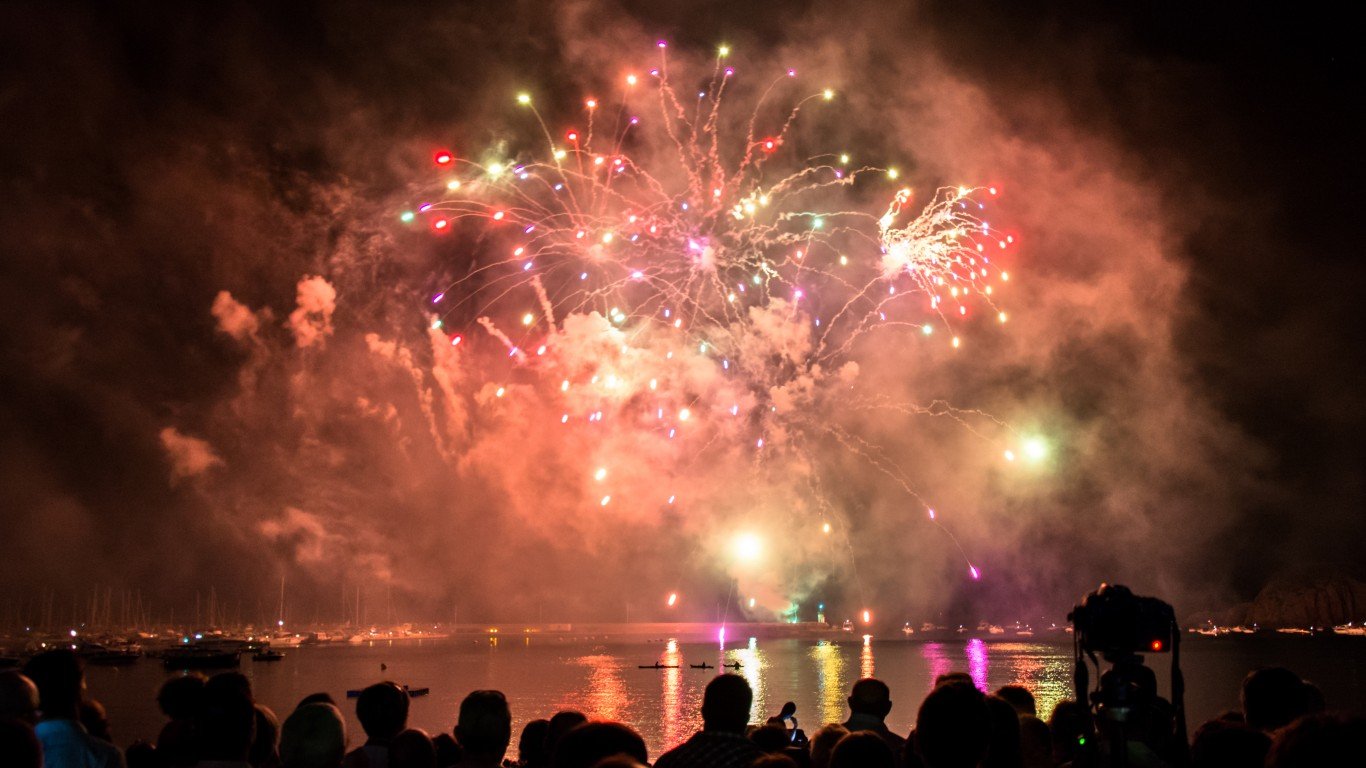
New Hampshire
> Selling period: Year-round
> Minimum age to purchase: 21 years old
> COVID-19 crowd restrictions: None
In New Hampshire, it is illegal to purchase firecrackers, stick rockets or missiles, and any device that only produces smoke. However, those who are at least 21 years old can legally purchase items such as Roman candles, party poppers, certain aerial devices, wheels, and sparklers. Rhode Island borders Massachusetts, a state that has a standing ban on consumer firework sales. As a result, every year, Massachusetts residents cross the border to purchase fireworks to use illegally in their home state.
Fireworks displays in Andover and Portsmouth, New Hampshire, as well as in nearby Boston, Massachusetts, have been canceled amid the COVID-19 pandemic.
[in-text-ad-2]
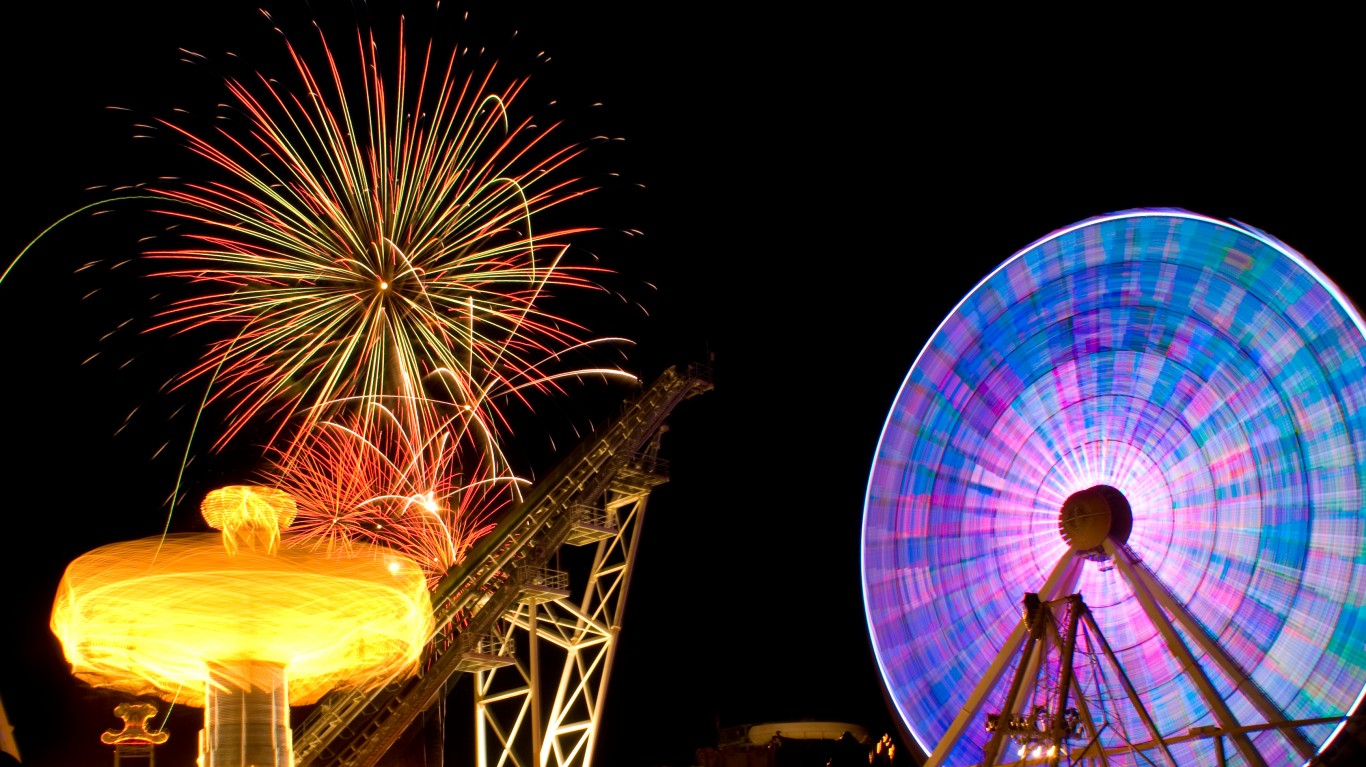
New Jersey
> Selling period: Year-round
> Minimum age to purchase: 16 years old
> COVID-19 crowd restrictions: 250 person limit
New Jersey allows smaller sparklers and ground-based fountains with 75 grams of pyrotechnic composition or less, glow worms, smoke devices, and trick noisemakers. All other types are outlawed. No one under 16 years of age may purchase fireworks.
The state has limited outdoor gatherings to 250 people, but Gov. Phil Murphy said that limit could double on July 3 if the number of daily new cases in the state continue to decline. Most fireworks displays around the state have been canceled.
New Mexico
> Selling period: Year-round
> Minimum age to purchase: 16 years old
> COVID-19 crowd restrictions: Five person limit
The only prohibited fireworks in New Mexico are stick-type rockets less than a quarter inch wide, though local governments can issue further restrictions.
Many of the largest cities in New Mexico have already canceled their planned fireworks celebrations, but others are going ahead with their displays, albeit with socially distanced viewing options. Restrictions on mass gatherings are more stringent in New Mexico than almost any other state. The state has banned “any public gathering, private gathering, organized event, ceremony or other grouping that brings together five or more individuals” whether that gathering is inside or outside.
[in-text-ad]
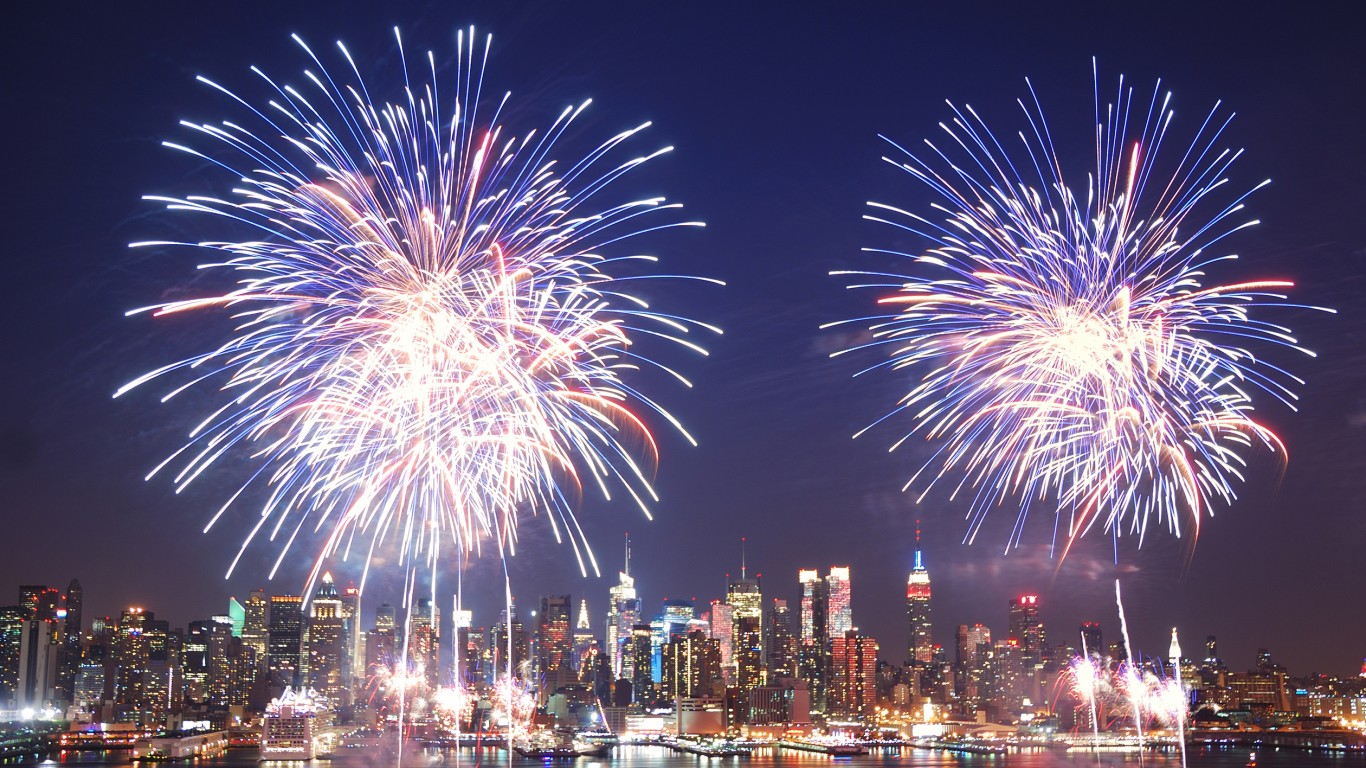
New York
> Selling period: June 1-July 5; Dec. 26 to Jan. 1
> Minimum age to purchase: 18 years old
> COVID-19 crowd restrictions: 50 person limit
The only types of firework permitted in New York are sparkling devices, which the state defines as: “ground based or handheld devices that produce a shower of colored sparks and or a colored flame, audible crackling or whistling noise and smoke.” It is important to note that despite being allowed on the state level, these devices are banned in several counties, including many in and around New York City. Other fireworks commonly sold elsewhere in the United States, such as aerial consumer fireworks, firecrackers and chasers, skyrockets, are Roman candles explicitly prohibited everywhere in the state.
While New York City has a strict prohibition of consumer fireworks, it will still host a July Fourth fireworks display, even as cities across the country have canceled or postponed their own shows amid the COVID-19 pandemic.
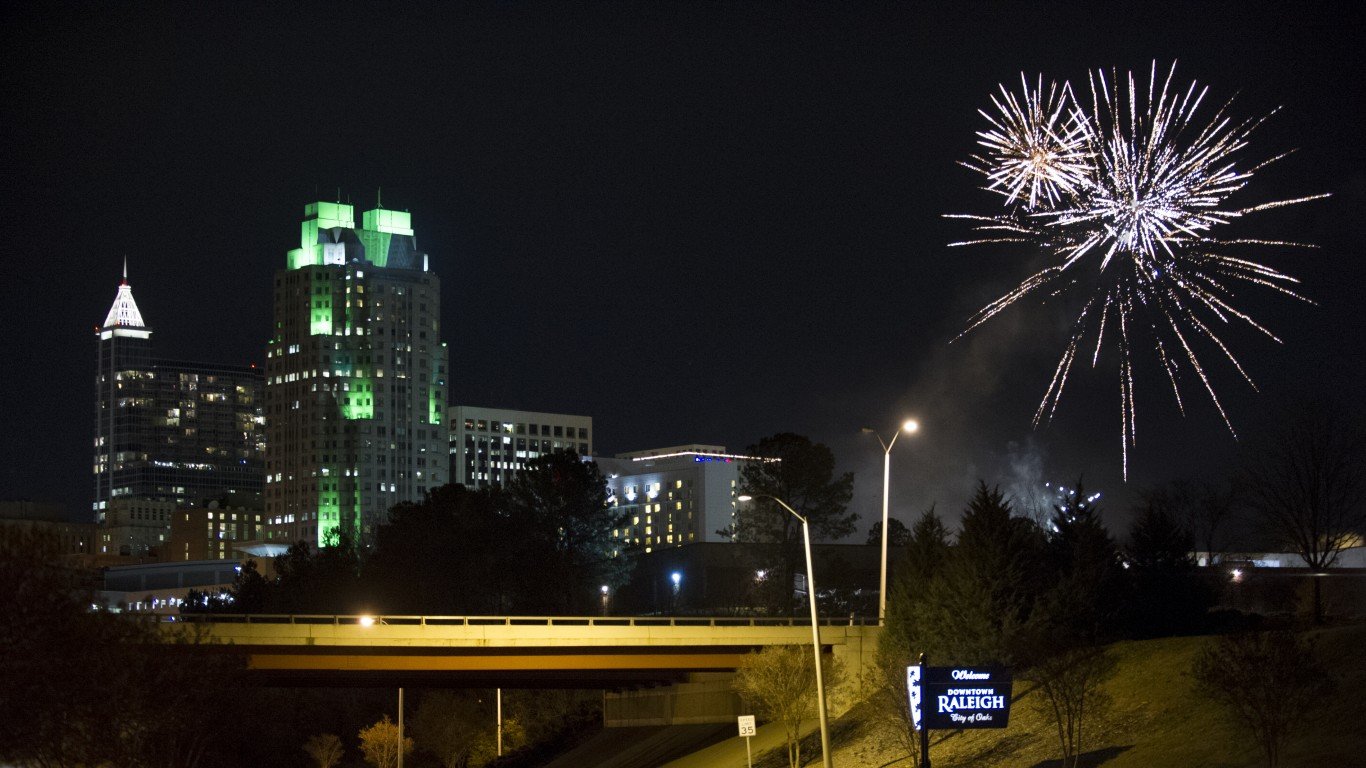
North Carolina
> Selling period: Year-round
> Minimum age to purchase: 16 years or older
> COVID-19 crowd restrictions: 25 person limit
North Carolina explicitly permits residents to buy smaller pyrotechnics like sparklers, fountains, smoke devices, and snappers. The state has outlawed larger and louder explosives, as well as aerial fireworks like Roman candles, and rockets.
In phase 2 of its reopening plan, North Carolina has limited outdoor gatherings to no more than 25 people. Still, there are nearly 50 fireworks displays around the state scheduled for the days around the July Fourth holiday.
North Dakota
> Selling period: June 27-July 5; Dec. 26-Jan. 1
> Minimum age to purchase: 12 years old
> COVID-19 crowd restrictions: Social distancing required
Between June 27 through July 5 and again from Dec. 26 to Jan. 1, approved fireworks can be purchased in North Dakota by anyone age 12 and up. The list of approved products includes star lights, helicopter flyers, cylindrical fountains, cone fountains, wheels, torches, colored fire, sparklers, dipped sticks, comets, shells, and certain soft shell firecrackers.
While cities and towns across the country have cancelled fireworks displays for the Fourth of July, many in North Dakota are still taking place. Cities such as Fargo and Lead will still be putting on a fireworks show.
[in-text-ad-2]
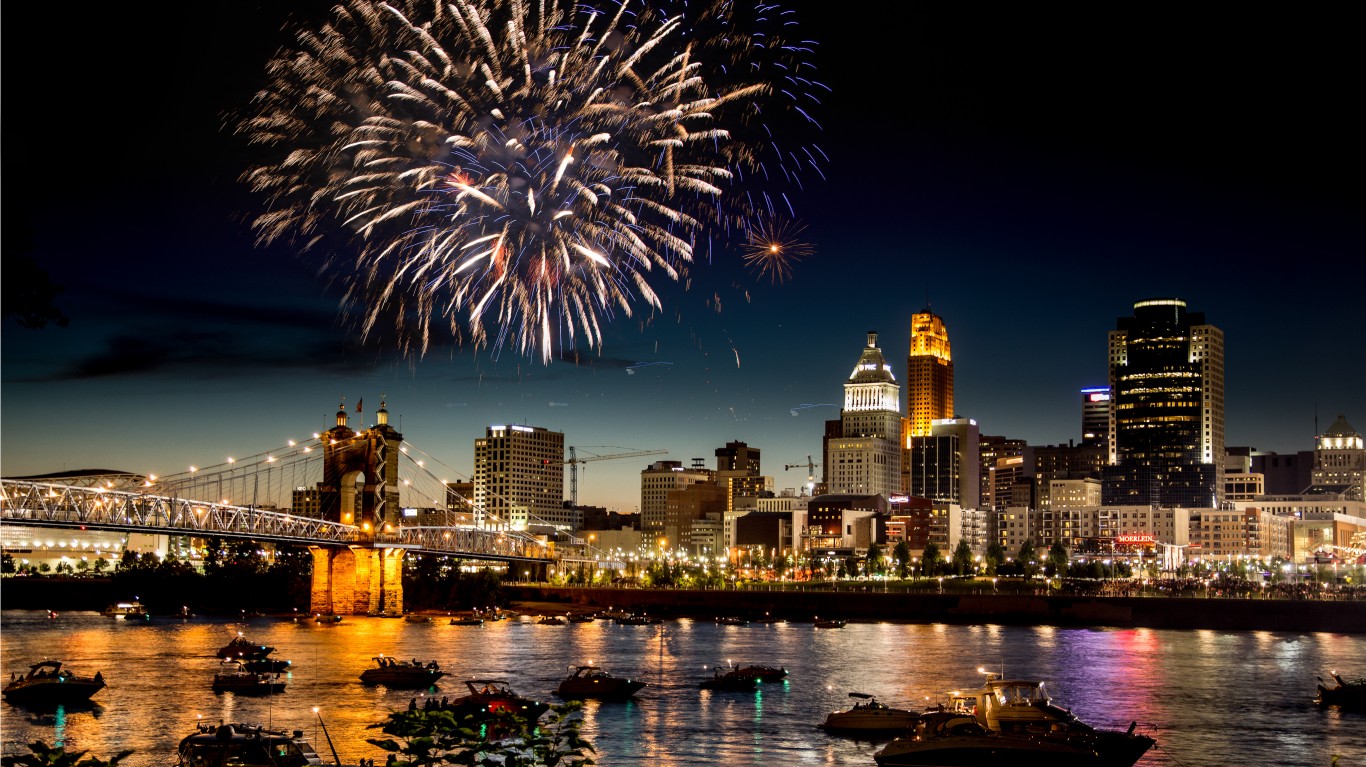
Ohio
> Selling period: Year-round
> Minimum age to purchase: N/A
> COVID-19 crowd restrictions: 100 person limit
Ohio has among the most restrictive fireworks laws in the country. It is one of three states where only sparklers and novelty items are allowed to be used. While the state has around 50 licensed fireworks sales locations, the fireworks cannot be discharged in Ohio and must be taken out of state within 48 hours of purchase.
Many areas of Ohio, especially in the central and northeastern parts of the state, have canceled their planned fireworks displays, though some are still scheduled.
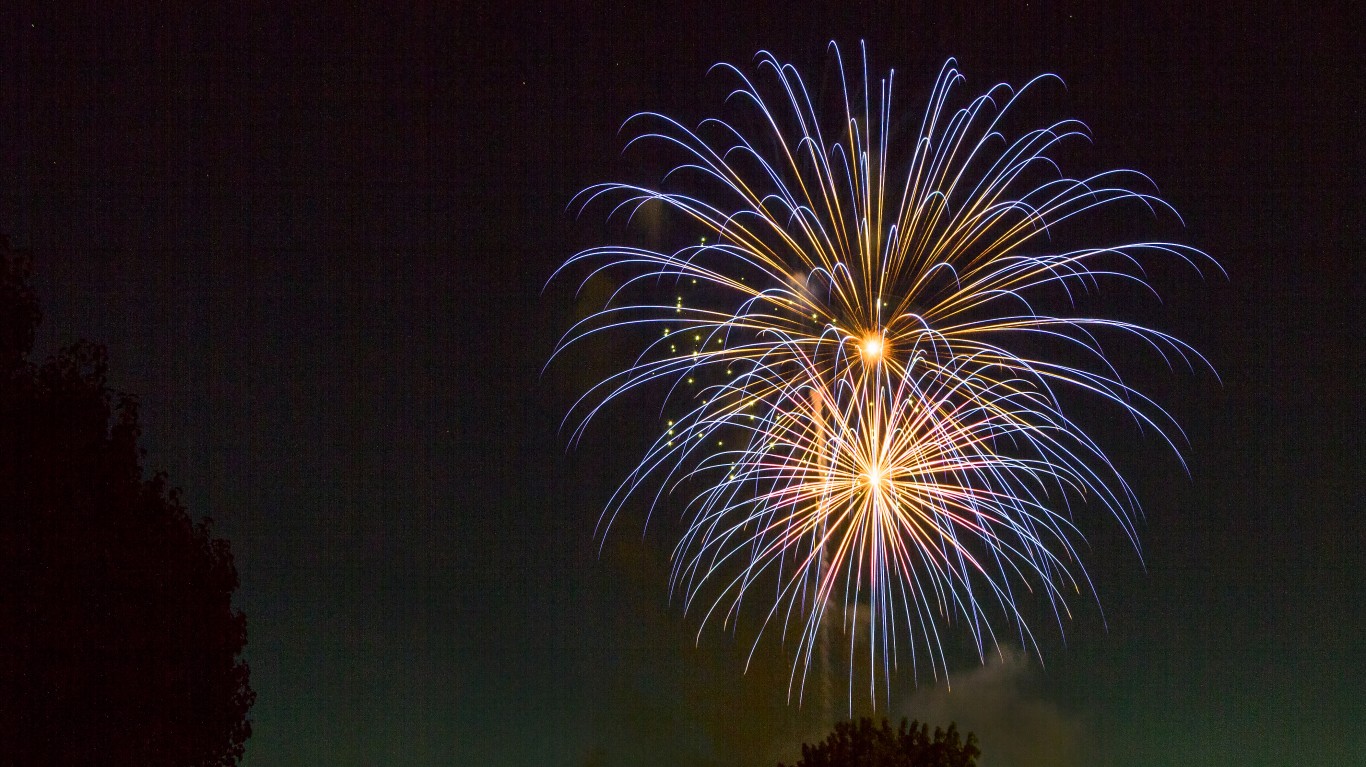
Oklahoma
> Selling period: June 15-July 6; Dec. 15-Jan. 2
> Minimum age to purchase: 12 years old
> COVID-19 crowd restrictions: None
Unless specifically prohibited, consumer fireworks and novelties approved by the Department of Transportation are legally available in Oklahoma. Prohibited items include skyrockets, bottle rockets, and M-80s. Retail sales of fireworks in Oklahoma are limited to the periods between June 15 and July 6 and again from Dec. 15 to Jan. 2. Licensed manufacturers, distributors, and wholesalers can sell year-round. Residents must be at least 12 years old or accompanied by an adult to purchase.
Cities and towns across Oklahoma, including Enid, Lawton, Moore, Seminole, Woodward, and Yukon, will still be hosting fireworks displays this Independence Day.
[in-text-ad]
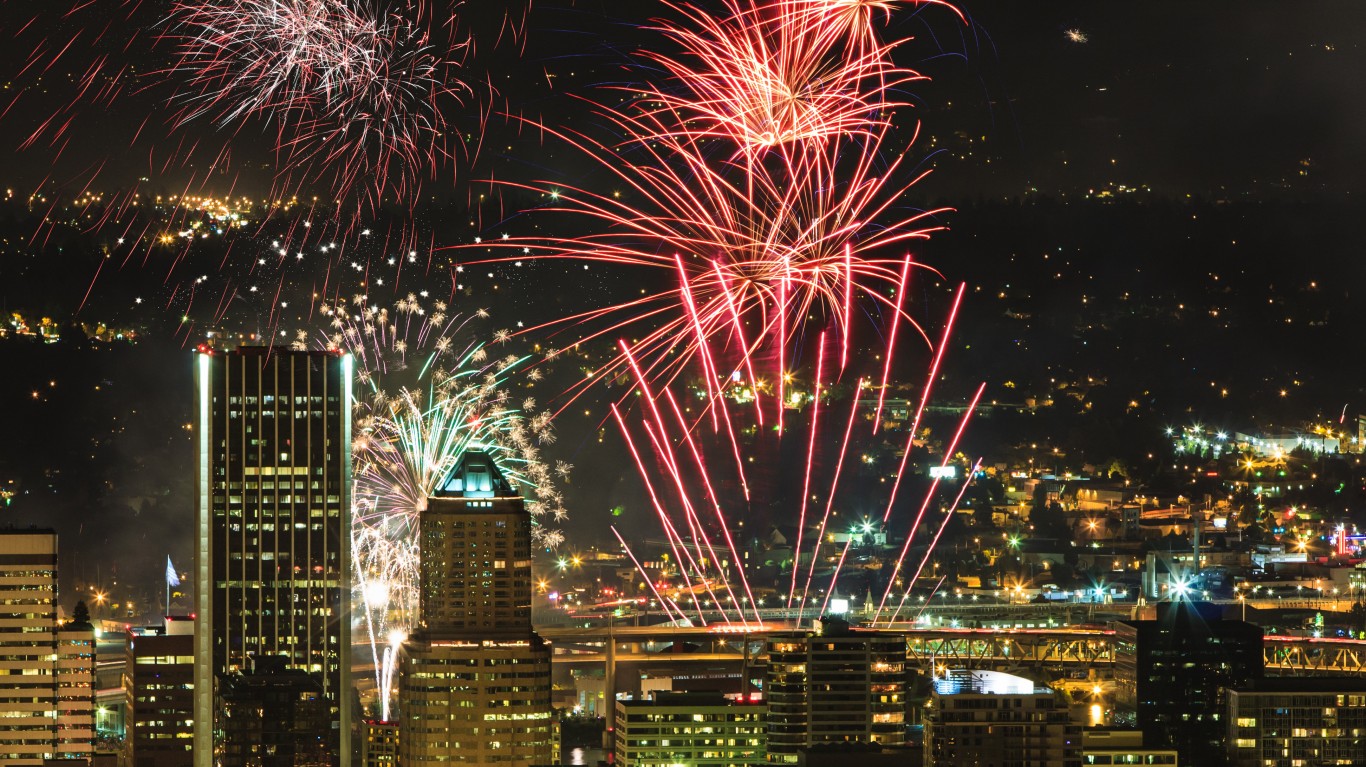
Oregon
> Selling period: June 23-July 6
> Minimum age to purchase: 16 years old
> COVID-19 crowd restrictions: 100 person limit
Oregon residents 16 and older can legally buy approved fireworks products from June 23 to July 6. These include cones, fountains, and wheels. Other items like bottle rockets and Roman candles are prohibited. Fireworks must be purchased at a permitted retail location and not online.
As is the case in states across the country, local municipalities across Oregon have canceled previously planned events and fireworks displays for Independence Day. Portland, for example, canceled its fireworks display, citing the statewide ban on large gatherings.
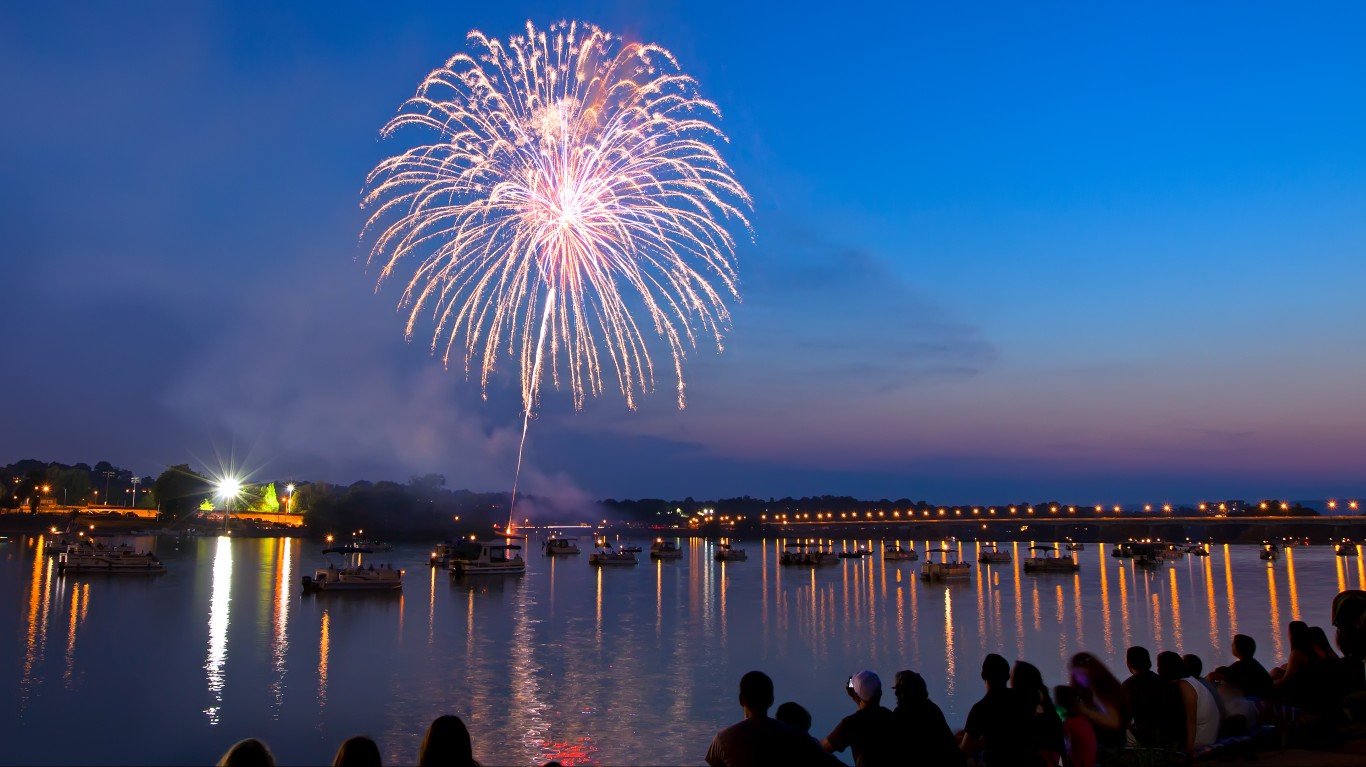
Pennsylvania
> Selling period: Year-round
> Minimum age to purchase: 18 years old
> COVID-19 crowd restrictions: 250 person limit
Consumers can legally purchase a wide variety of fireworks in Pennsylvania, including bottle rockets, Roman candles, and firecrackers that contain 50 milligrams of explosives or less. It is illegal for revelers to light fireworks from or toward a motor vehicle or building, or within 150 feet of an occupied structure, or under the influence of alcohol or drugs.
Cities and towns across the state have canceled previously planned Independence Day celebrations. Some, however, are modifying July Fourth festivities. Allentown, for example, is offering a drive-in fireworks show, and others, including Bethel Township, Collingdale, Conshohocken, Lower Providence, and Pottstown, are postponing their shows to a later date.
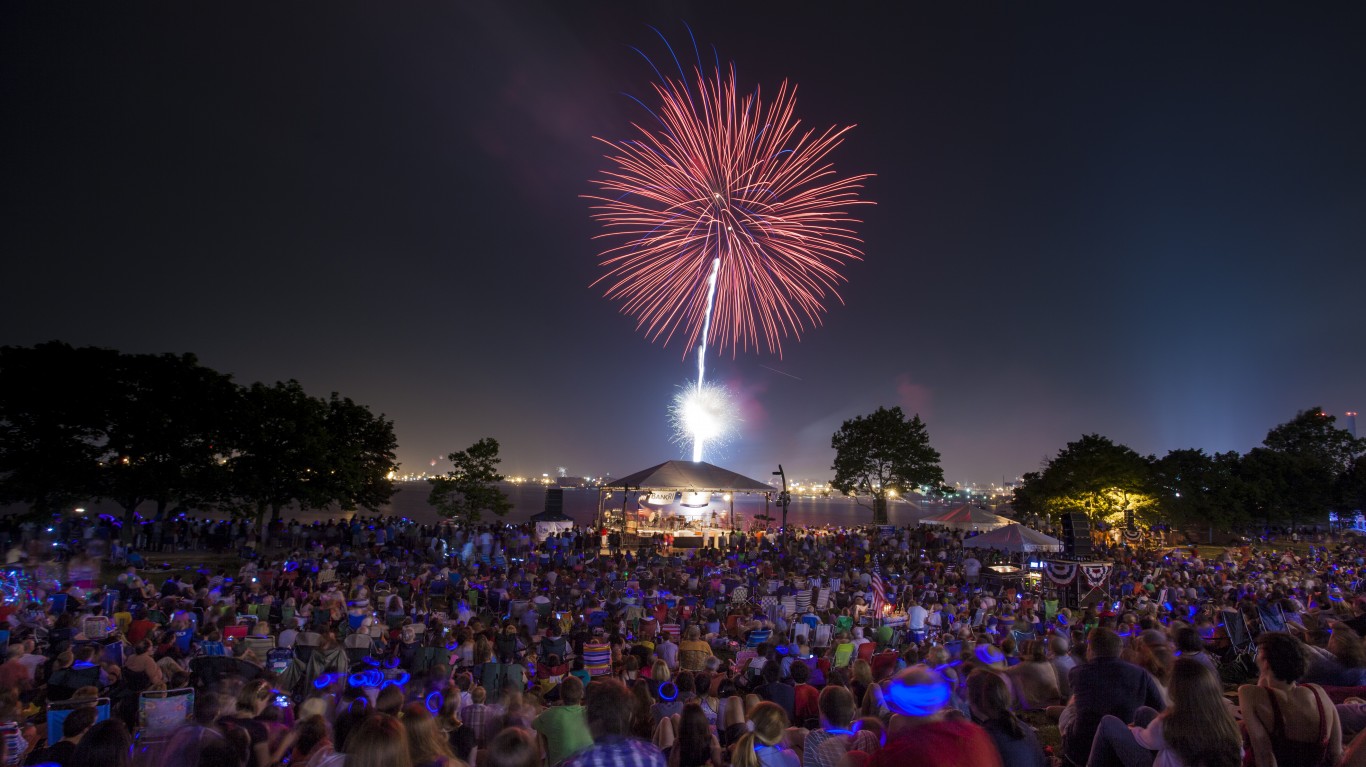
Rhode Island
> Selling period: Year-round
> Minimum age to purchase: 16 years old
> COVID-19 crowd restrictions: 250 person suggested limit
In Rhode Island, aerial fireworks are banned, but sparklers and ground-based pyrotechnics like fountains and spinners are permitted. Purchasers must be at least 16 years old.
Though there is no specific ban on crowds of a certain size, Gov. Gina Raimondo recommended that no more than 250 people gather for events. Cities like Newport and Providence have either postponed or outright canceled their July Fourth fireworks events.
[in-text-ad-2]
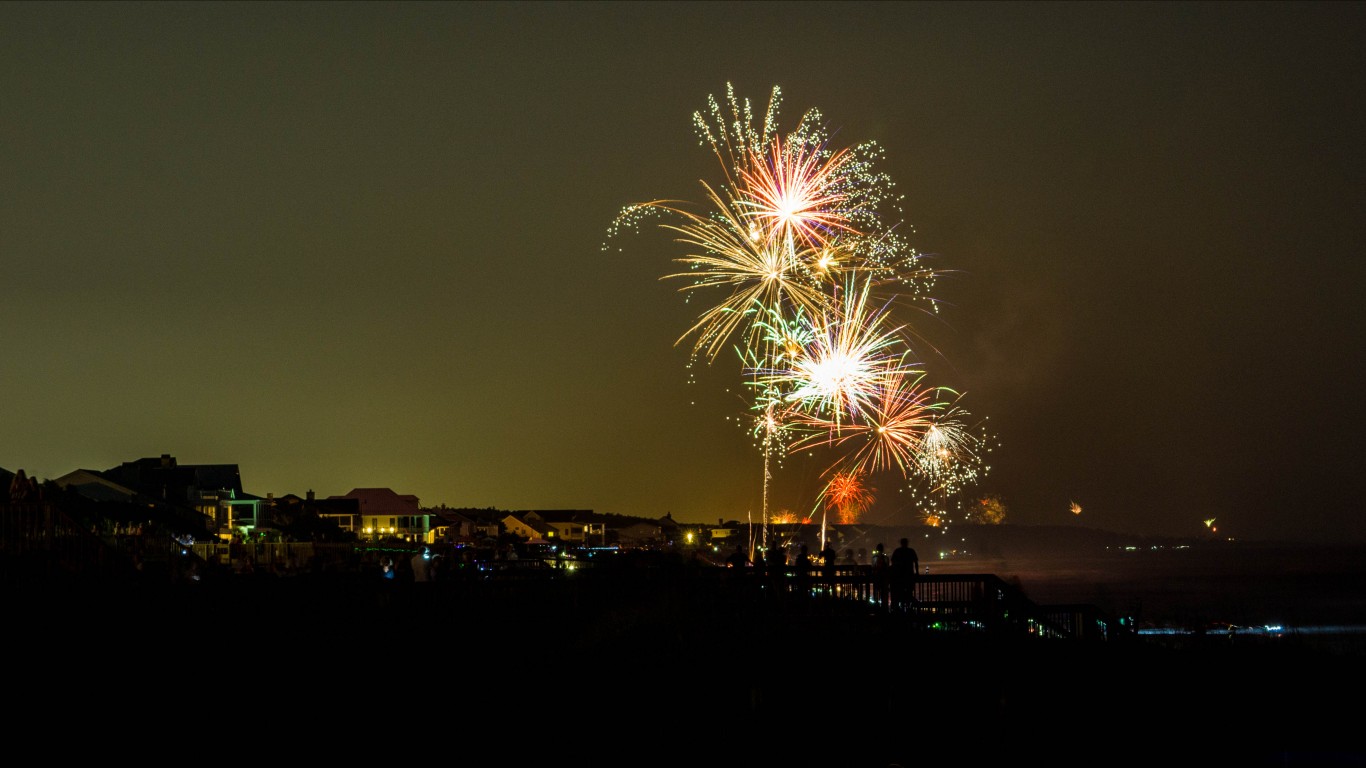
South Carolina
> Selling period: Year-round
> Minimum age to purchase: 16 years old
> COVID-19 crowd restrictions: None
South Carolina residents 16 and older are permitted to purchase a wide variety of fireworks, including bottle rockets, mortars, spinners, and aerial fireworks. Items like M-80s and cherry bombs are illegal, however.
Despite a significant increase in COVID-19 cases in the state, many cities and towns will still be celebrating the Fourth of July with a fireworks display. These places include Myrtle Beach and Charleston.
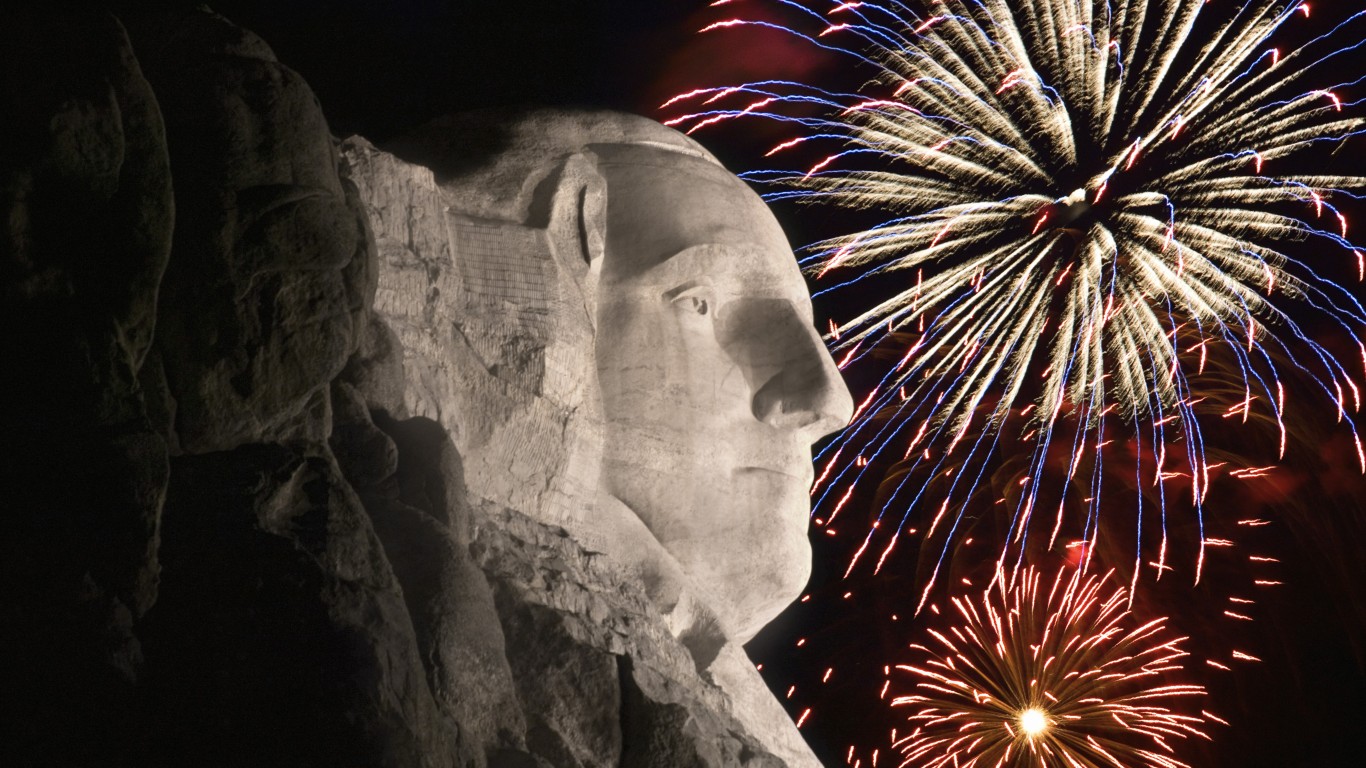
South Dakota
> Selling period: June 27-July 5
> Minimum age to purchase: N/A
> COVID-19 crowd restrictions: 10 person limit
South Dakota has enacted several fireworks limitations based on ingredients. Consumer pyrotechnics made with any dynamite, nitroglycerin, or giant powder are banned, as are firecrackers. Fireworks sellers must be at least 18 years old and cannot sell fireworks out of a vehicle. They also cannot sell in the Black Hills district or in any national or state forest or park.
The annual fireworks display atop Mount Rushmore is still scheduled to proceed, though experts are concerned that it could be dangerous — not just because of COVID-19, but also because the state is in the midst of a dry year and there are fire concerns.
[in-text-ad]
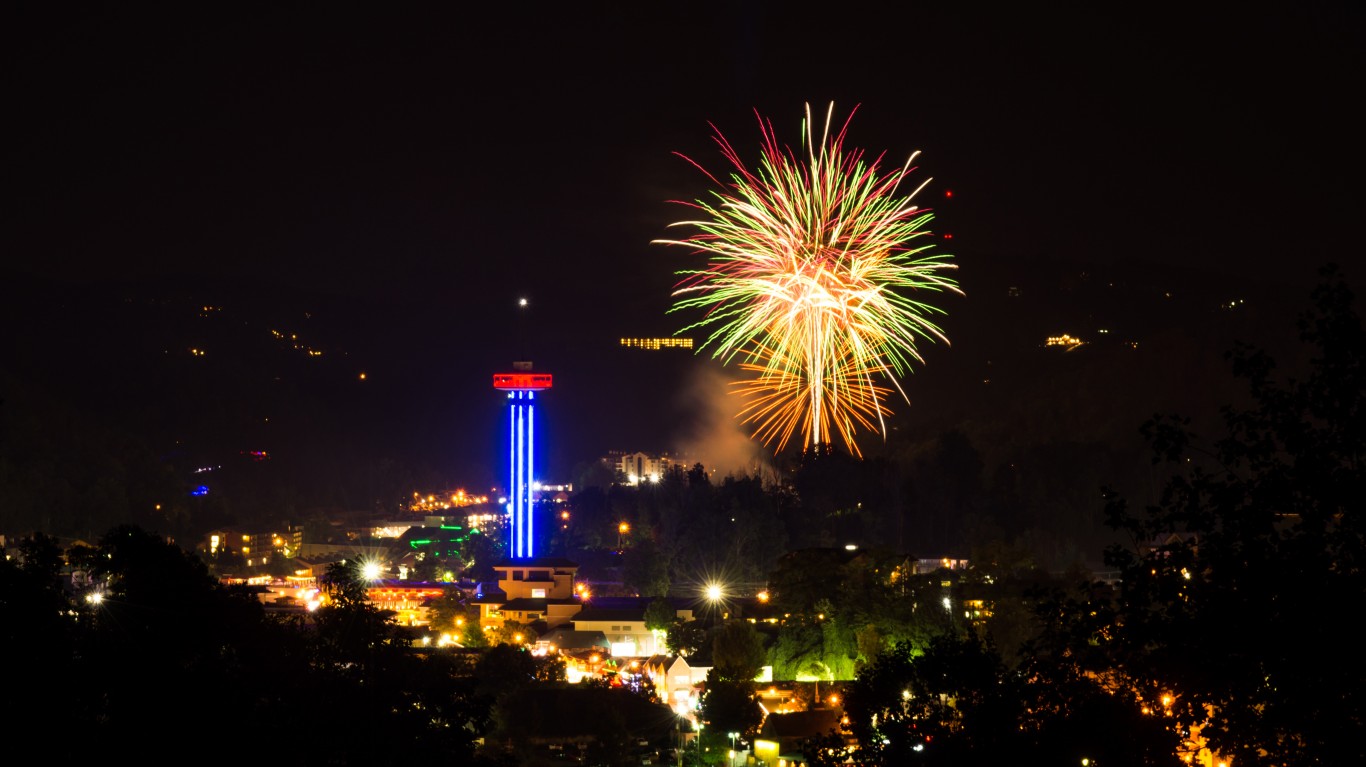
Tennessee
> Selling period: Year-round
> Minimum age to purchase: 16 years old
> COVID-19 crowd restrictions: 50 person limit
Though it is illegal to purchase fireworks through the mail in Tennessee, residents 16 and older can purchase them in person, so long as they are not intoxicated. Fireworks laws can also vary by county within the state. Permissible fireworks in the state include bottle rockets, Roman candles, firecrackers, parachutes, and aerial spinners.
While some places in Tennessee — such as Springfield, Murfreesboro, La Vergne, Hendersonville, and Mt Juliet — are still hosting fireworks celebrations for the Fourth of July, others have adjusted plans. Nashville, for example, will be televising its fireworks display.
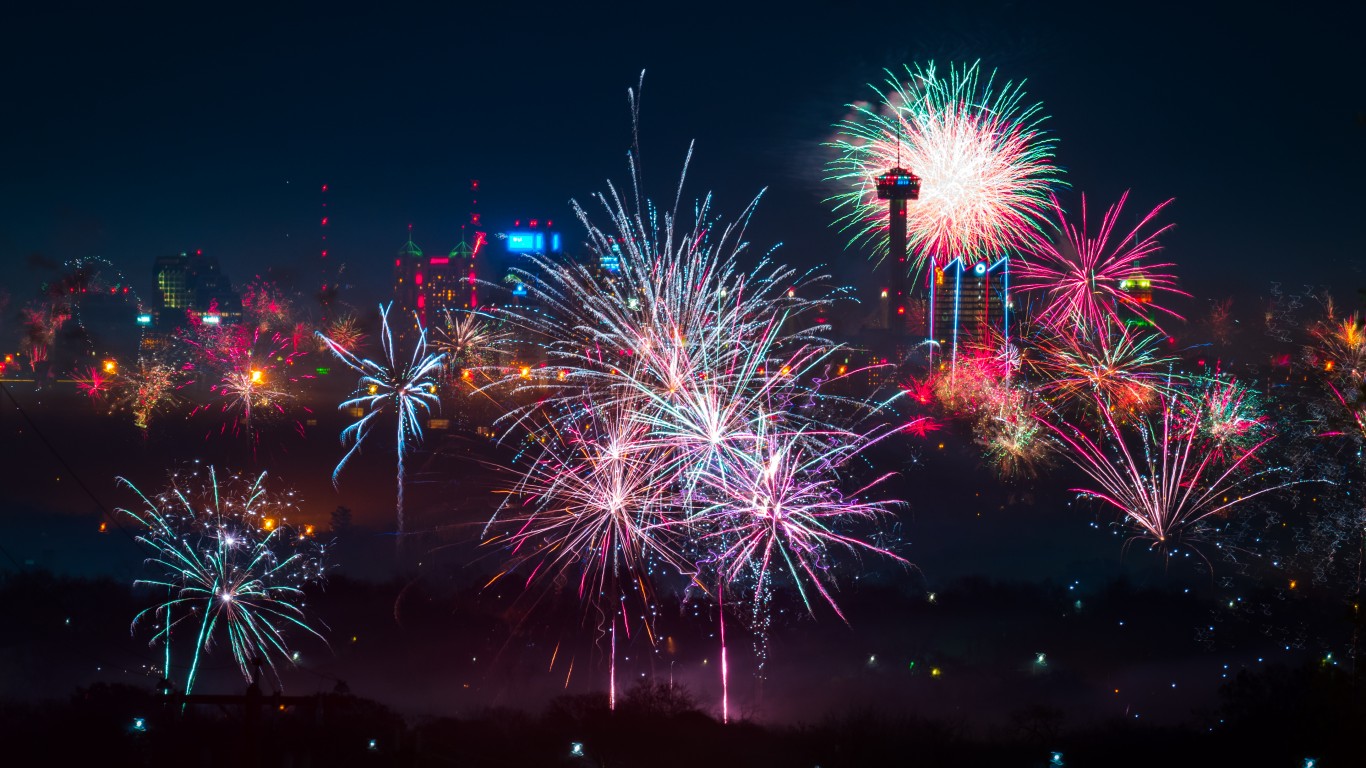
Texas
> Selling period: June 24-July 4 and Dec. 20-Jan. 1, May 1- May 5
> Minimum age to purchase: 16 years old
> COVID-19 crowd restrictions: Varies by municipality
In Texas, all fireworks that are not banned at the federal level are permitted, except for smaller bottle rockets. There are three statewide selling periods: June 24 to July 4, Dec. 20 to Jan. 1, and May 1 to May 5, though during the May period, fireworks cannot be sold within 100 miles of the border with Mexico. Local authorities can permit fireworks sales at three additional times — Feb. 25 to March 2; April 16 to April 21; and the Wednesday before the last Monday in May through that Monday.
With COVID-19 cases spiking in Texas, Gov. Greg Abbott has deferred to local authorities as to restrictions on public gatherings. Mayors and county judges may impose restrictions on gatherings of over 100 people, but there is no statewide mandate. There are still many fireworks displays slated to go on across the state.
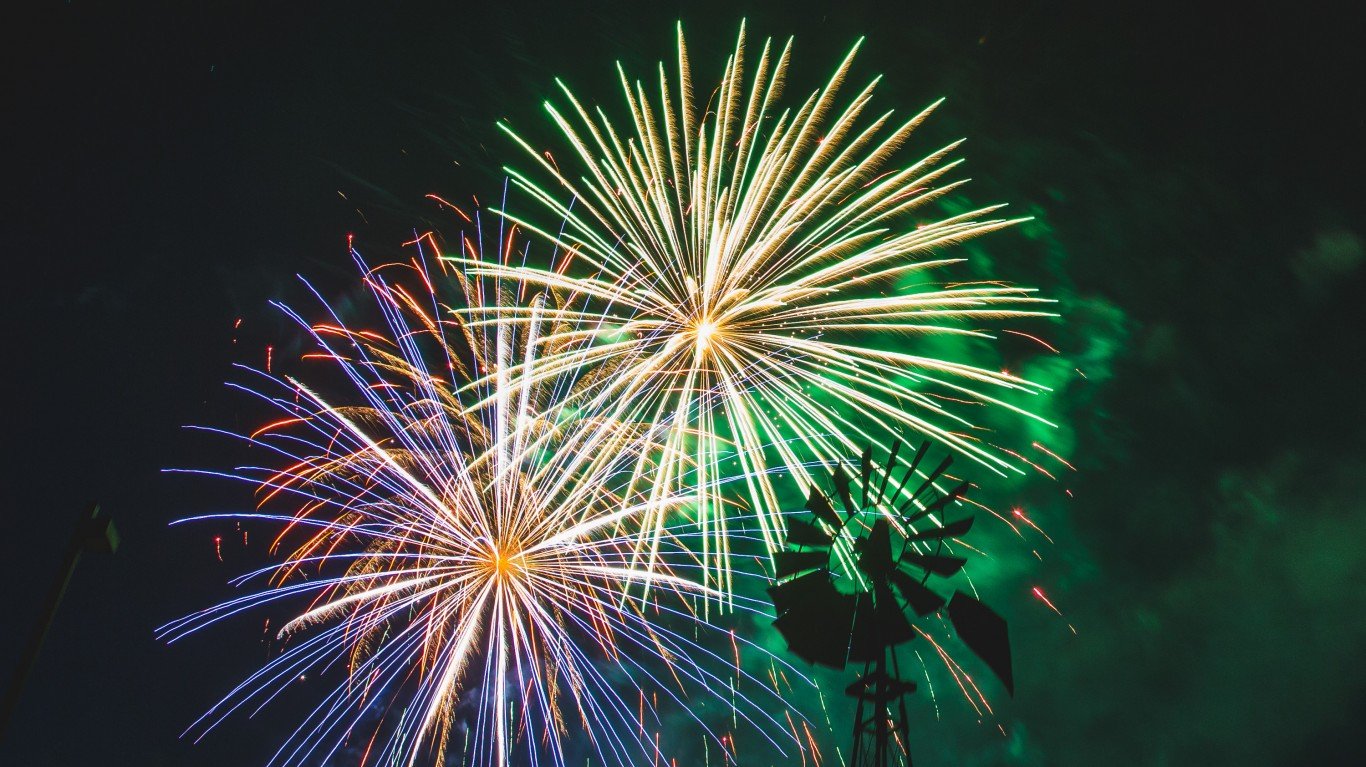
Utah
> Selling period: June 24-July 25; Dec. 29-Dec. 31; 2 days before and on Chinese New Year Eve
> Minimum age to purchase: 18 years old
> COVID-19 crowd restrictions: 6,000 person limit
A long list of fireworks products are prohibited in Utah, including firecrackers, bottle rockets, Roman candles, skyrockets, rockets mounted on a wire or stick, M-80s, and cherry bombs. Adults in the state can legally purchase multiple tube devices as well as sparklers and cakes lit by a single fuse. Celebrants in parts of Utah may need to put on their own fireworks show this Independence Day as municipalities across the state, including Park City and Salt Lake City, have cancelled their fireworks displays.
[in-text-ad-2]
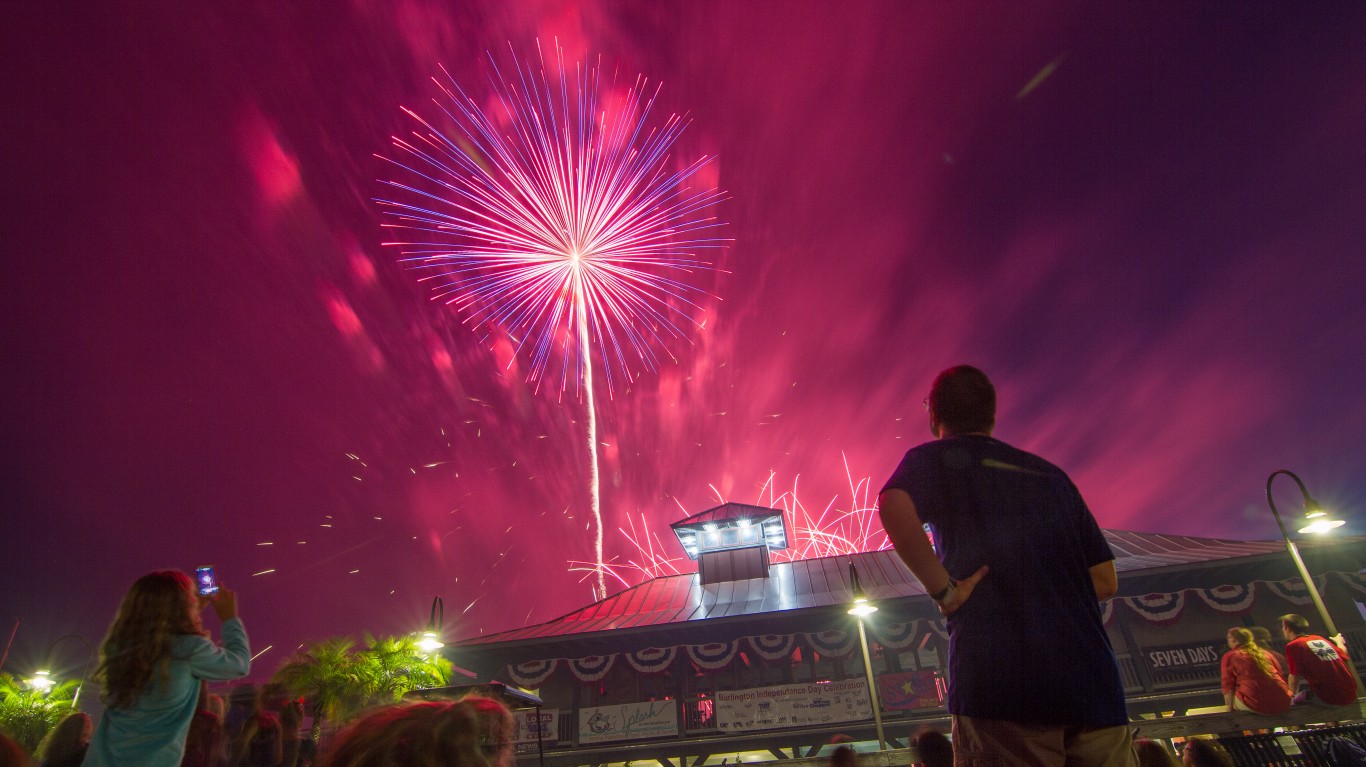
Vermont
> Selling period: Year-round
> Minimum age to purchase: N/A
> COVID-19 crowd restrictions: 150 person limit
Vermont has some of the most restrictive fireworks laws of any state. Only smaller sparklers and novelty items like snakes, party poppers, and smoke devices are specifically permitted.
Vermont recently loosened its gathering laws, allowing groups of up to 150 people as of June 26. Many fireworks displays across Vermont have been cancelled
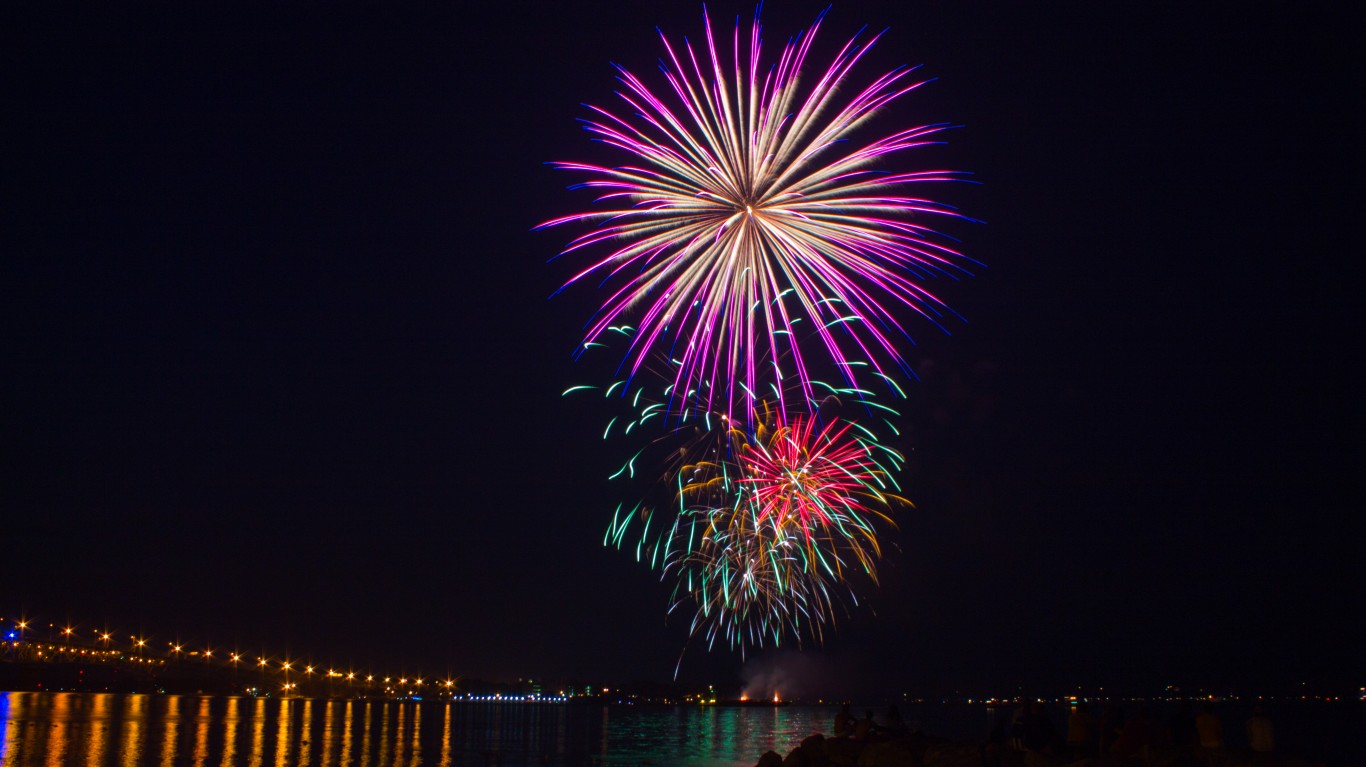
Virginia
> Selling period: Year-round
> Minimum age to purchase: N/A
> COVID-19 crowd restrictions: 250 person limit
In Virginia, only sparklers, fountains, pharaoh’s serpents, pinwheels, and whirligigs are allowed. Other types of fireworks, such as firecrackers, skyrockets, torpedoes, and those that explode, travel laterally, rise into the air, or fire projectiles into the air, are prohibited.
As is the case across the country, many municipalities in Virginia have cancelled fireworks displays this Fourth of July. Alexandria, Fairfax City, Falls Church, Great Falls, Mclean, and Reston have all cancelled Independence Day celebrations.
[in-text-ad]
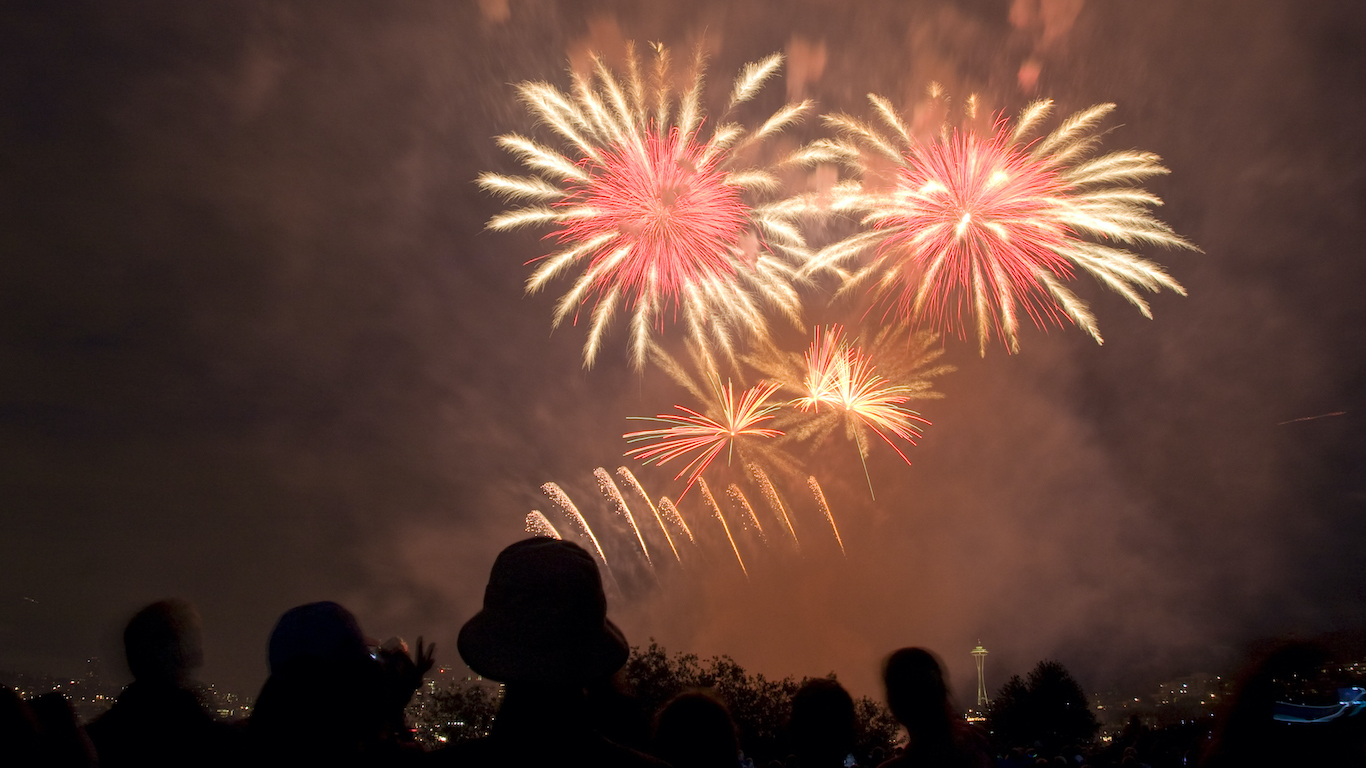
Washington
> Selling period: June 28-July 5; Dec. 27-Dec. 31
> Minimum age to purchase: 16 years old
> COVID-19 crowd restrictions: 50 person limit (some parts of state only)
People 16 and older in Washington are legally allowed to purchase certain fireworks from noon on June 28 to 9 p.m. on July 5 and again from noon on Dec. 27 to 11 p.m. on Dec. 31. All consumer grade fireworks in the state are permitted, except those that are expressly prohibited. Prohibited items include firecrackers, skyrockets, salutes, chasers, and bottle rockets.
With the ongoing threat of COVID-19, cities across the state, including Bellevue, Seattle, and Tacoma, have cancelled fireworks displays planned for July Fourth. In the absence of publicly-sponsored fireworks displays, commercial sales have been booming in the state.
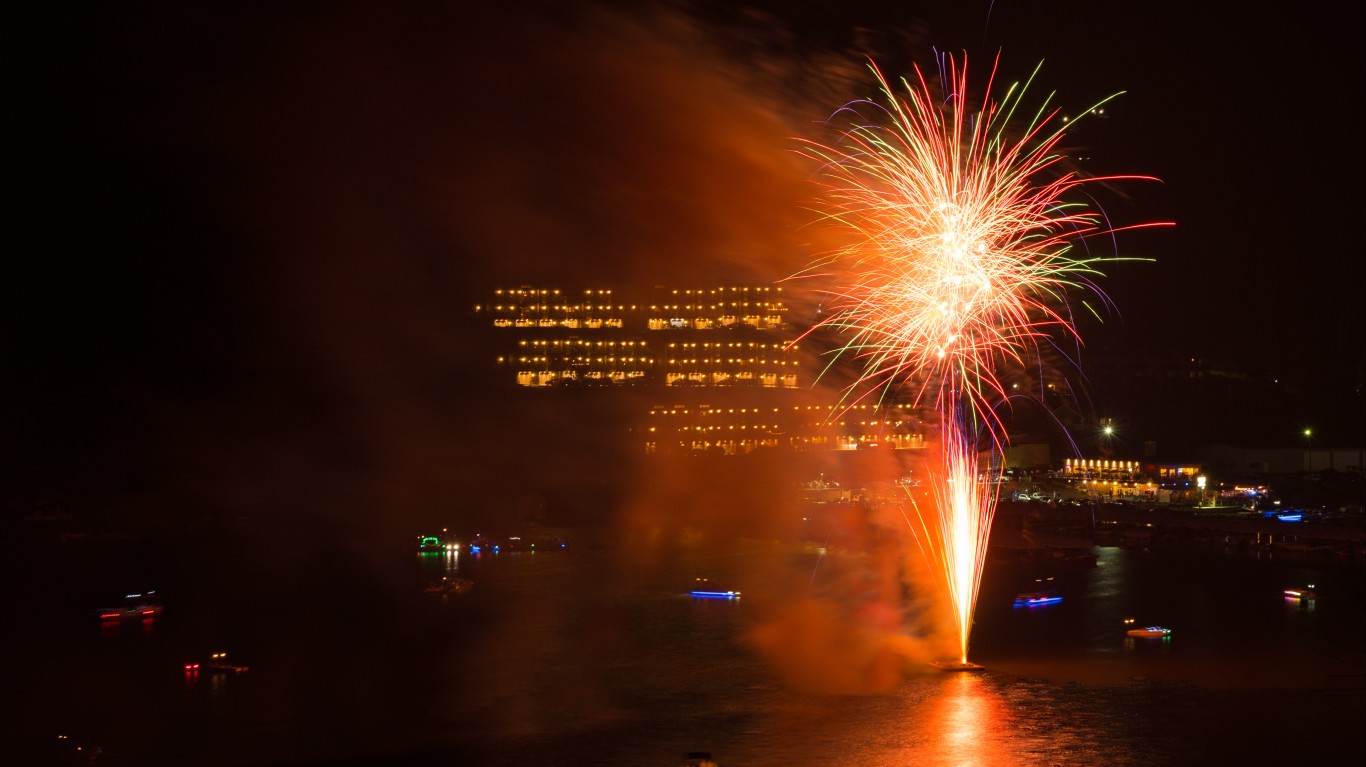
West Virginia
> Selling period: Year-round
> Minimum age to purchase: 18 years old
> COVID-19 crowd restrictions: 100 person limit
West Virginia is the only state to specifically allow fireworks sales year-round. The state also specifically allows a wide array of pyrotechnics, including firecrackers, Roman candles, bottle rockets, aerial shell kits, and many more. To buy fireworks, purchasers must be at least 18 years old and have an I.D.
Many fireworks displays throughout West Virginia have been canceled due to the COVID-19 outbreak, though local fireworks vendors reported an increase in sales of consumer fireworks.
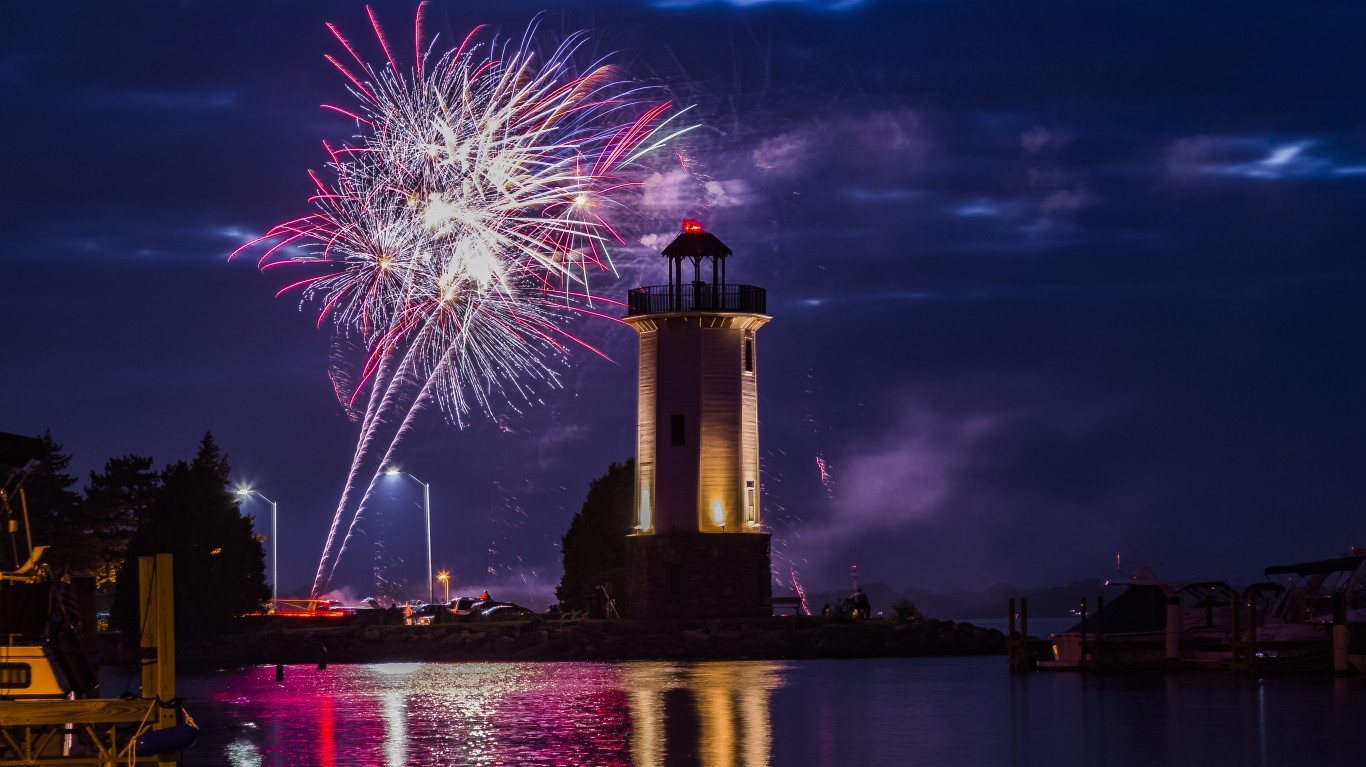
Wisconsin
> Selling period: Year-round
> Minimum age to purchase: N/A
> COVID-19 crowd restrictions: Varies by region
Wisconsin laws allow fountains, certain sparklers and snakes, and small smoke devices, while prohibiting larger devices like firecrackers, Roman candles, aerial salutes, and more.
The phased reopening plan varies between local cities and counties, though Wisconsin’s Department of Health Services generally recommends people avoid large gatherings. Dozens of fireworks displays around the state have been cancelled, including in Milwaukee.
[in-text-ad-2]
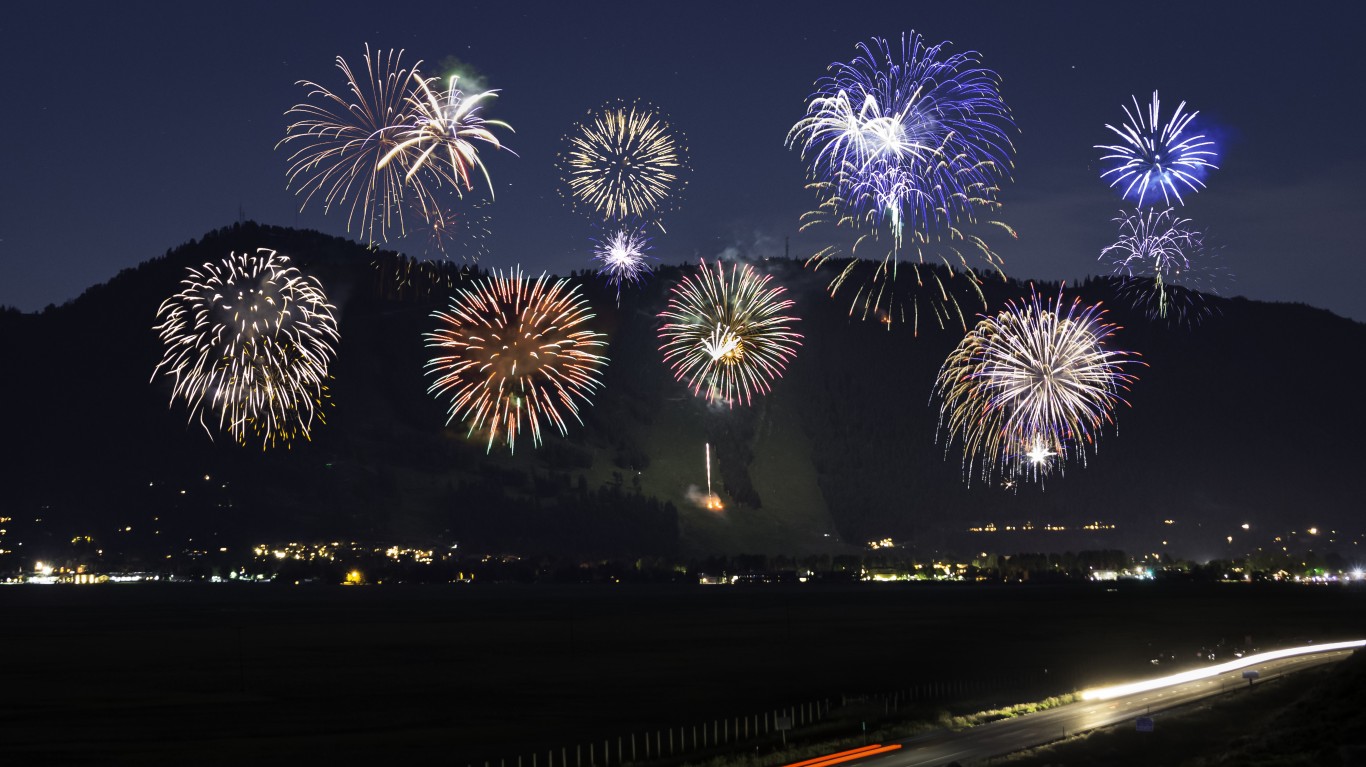
Wyoming
> Selling period: Year-round
> Minimum age to purchase: N/A
> COVID-19 crowd restrictions: 50 person limit
Wyoming has among the least restrictive fireworks laws of any state. No types of fireworks are explicitly prohibited as long as they are legal on the federal level. The state also has no designated selling period or minimum age to purchase.
Gatherings of over 50 people are currently banned in Wyoming. Cities like Lander and Jackson Hole will not hold their fireworks displays for July Fourth, but Cheyenne’s will go on as planned.
Sponsored: Want to Retire Early? Here’s a Great First Step
Want retirement to come a few years earlier than you’d planned? Or are you ready to retire now, but want an extra set of eyes on your finances?
Now you can speak with up to 3 financial experts in your area for FREE. By simply clicking here you can begin to match with financial professionals who can help you build your plan to retire early. And the best part? The first conversation with them is free.
Click here to match with up to 3 financial pros who would be excited to help you make financial decisions.
Thank you for reading! Have some feedback for us?
Contact the 24/7 Wall St. editorial team.
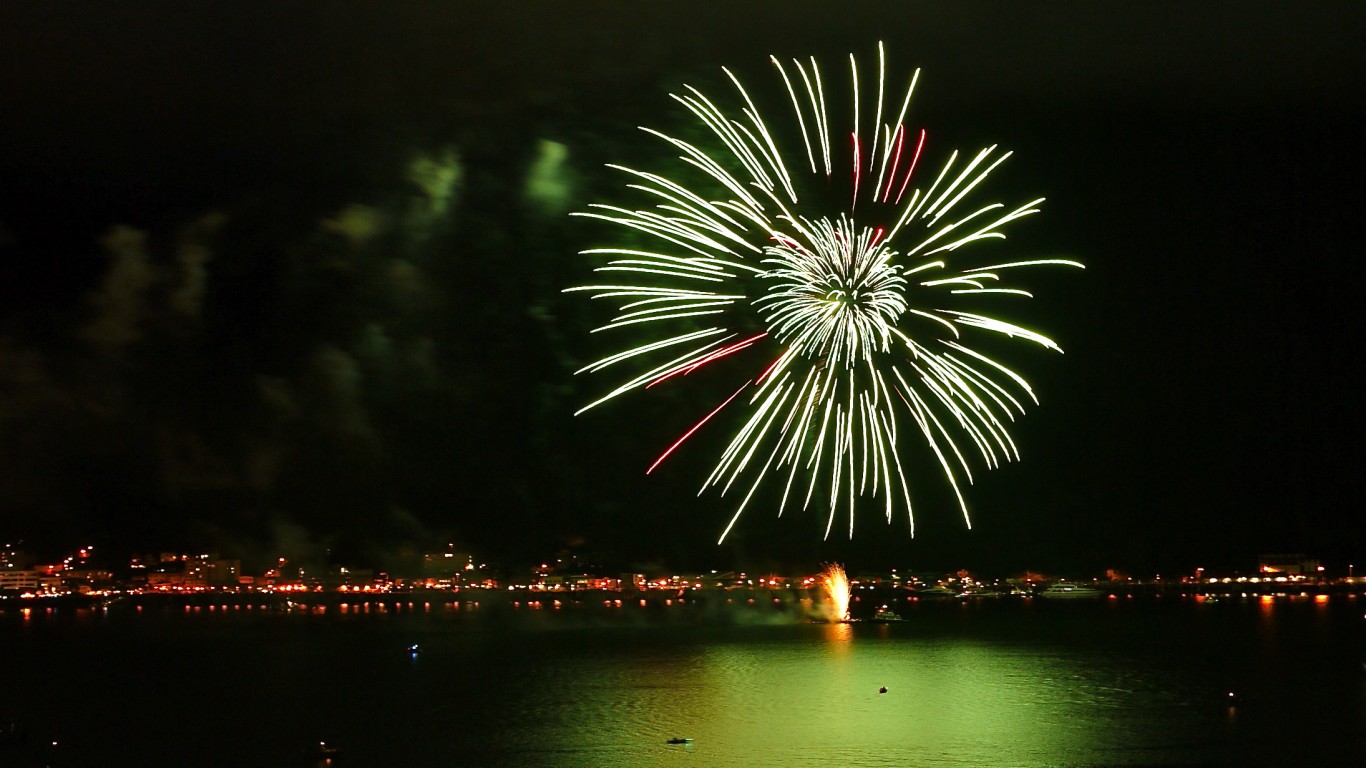
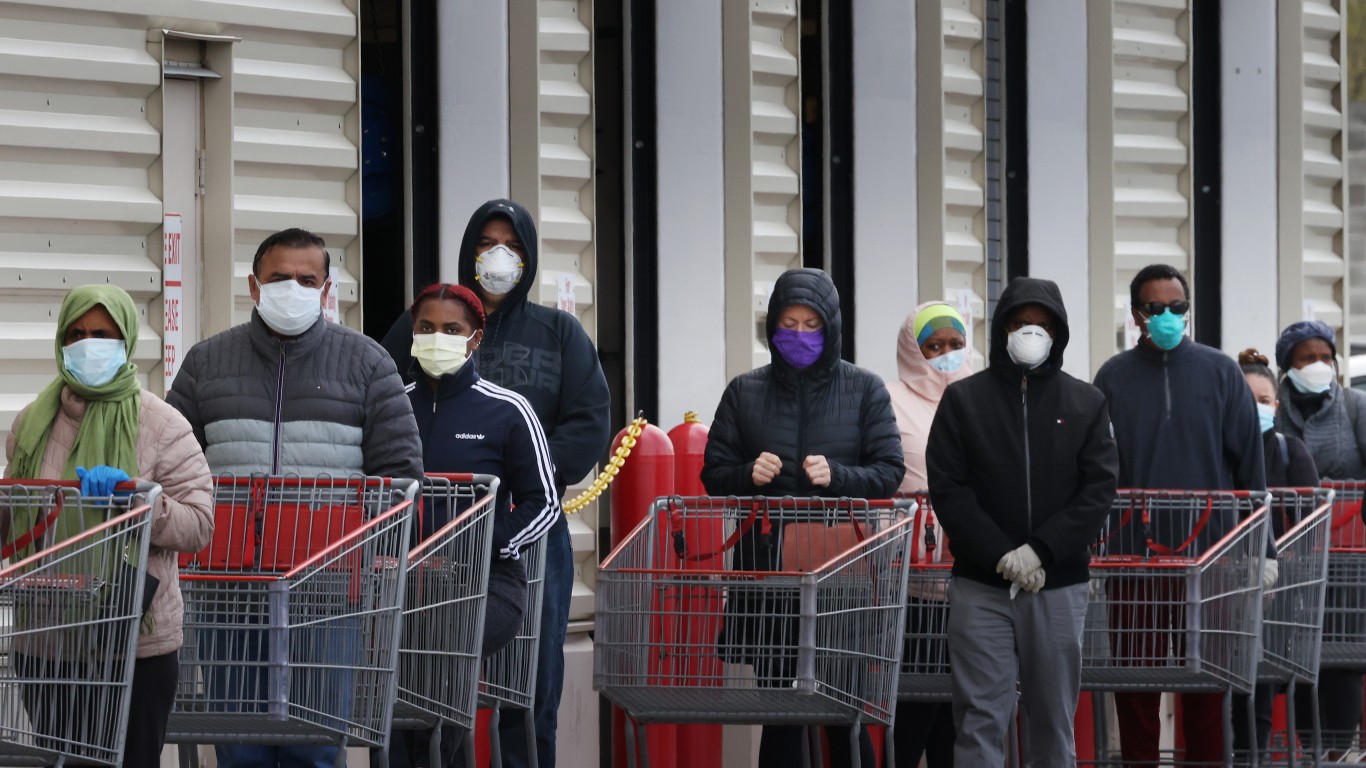 24/7 Wall St.
24/7 Wall St.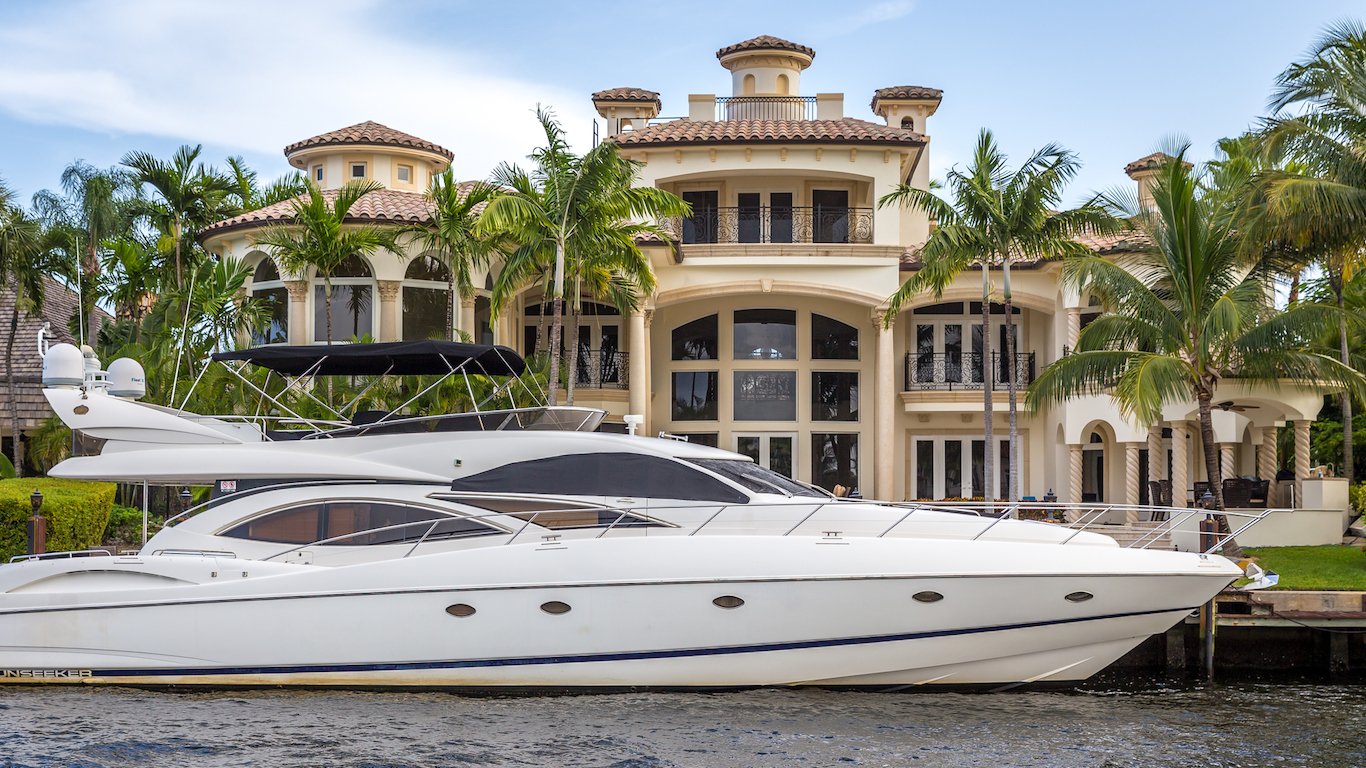 24/7 Wall St.
24/7 Wall St. 24/7 Wall St.
24/7 Wall St.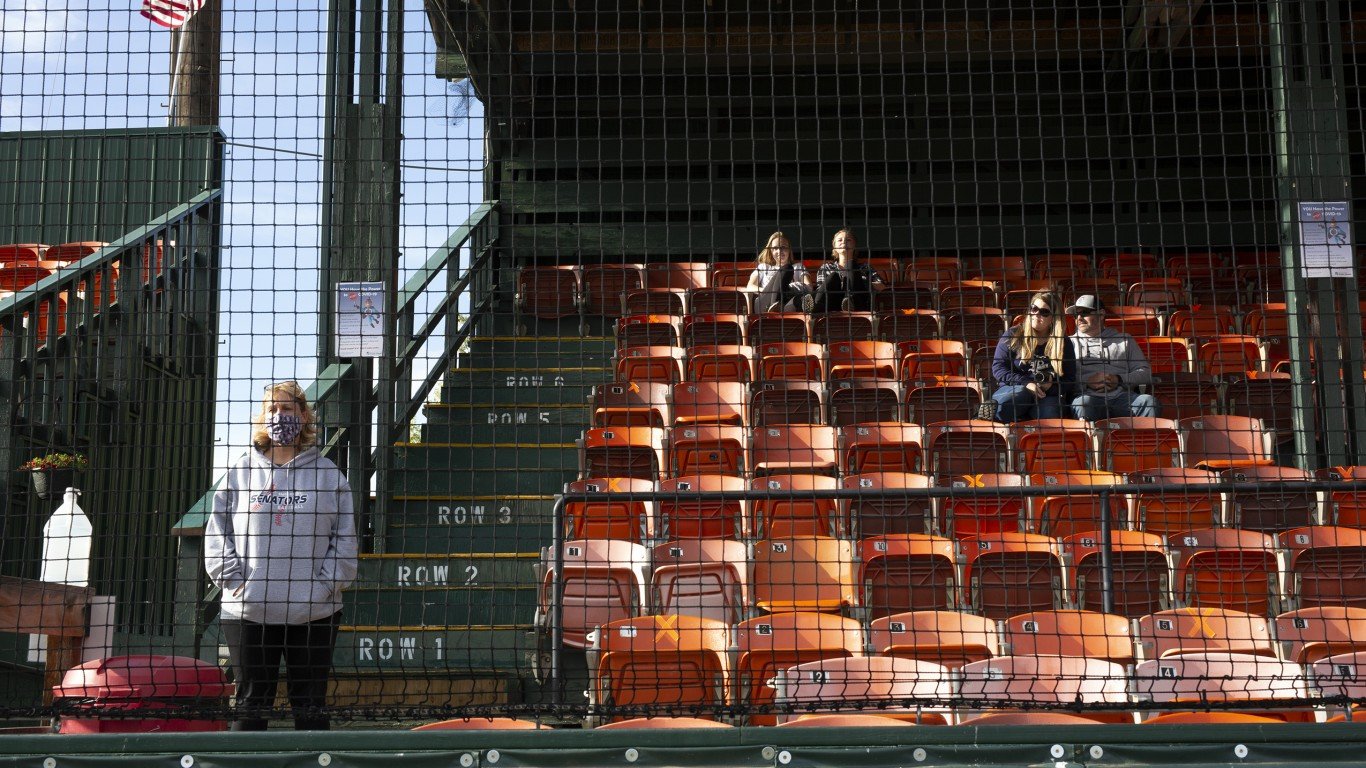 24/7 Wall St.
24/7 Wall St.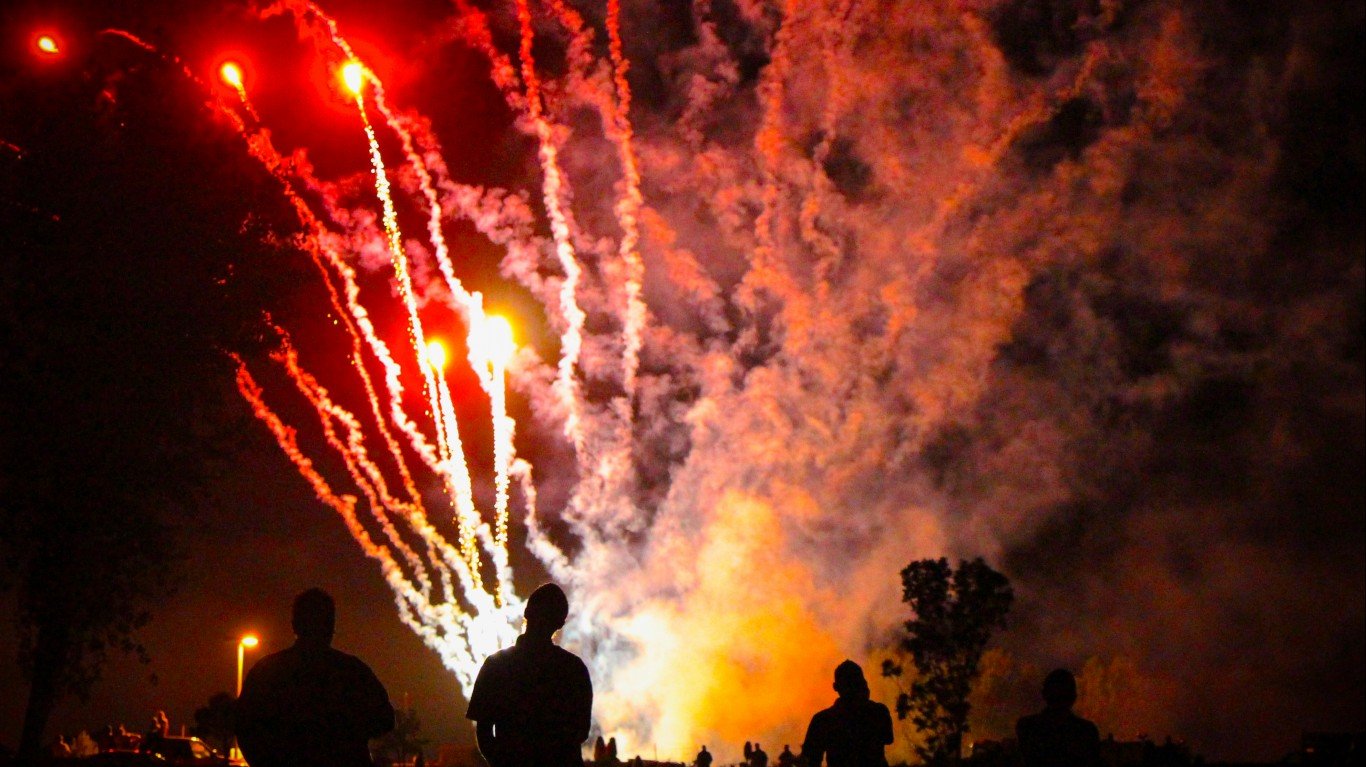
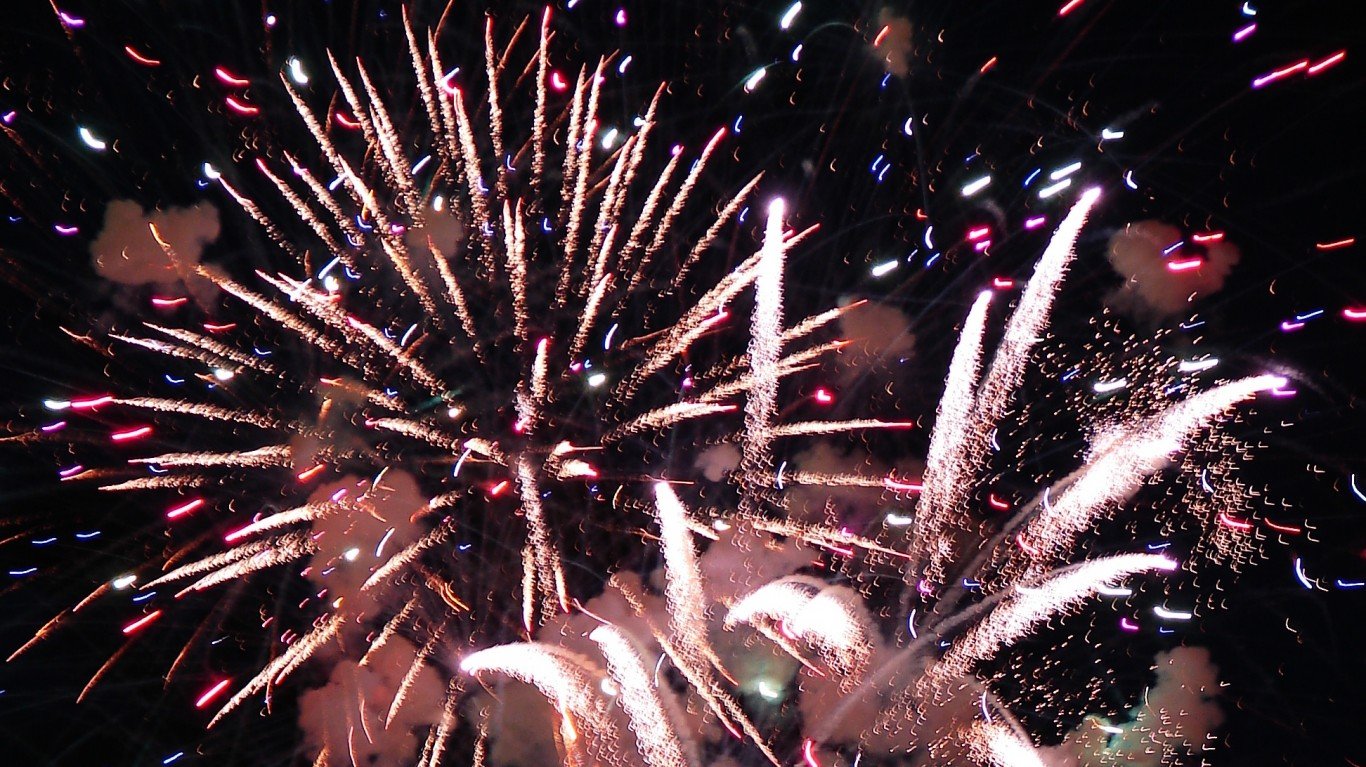
 24/7 Wall St.
24/7 Wall St.